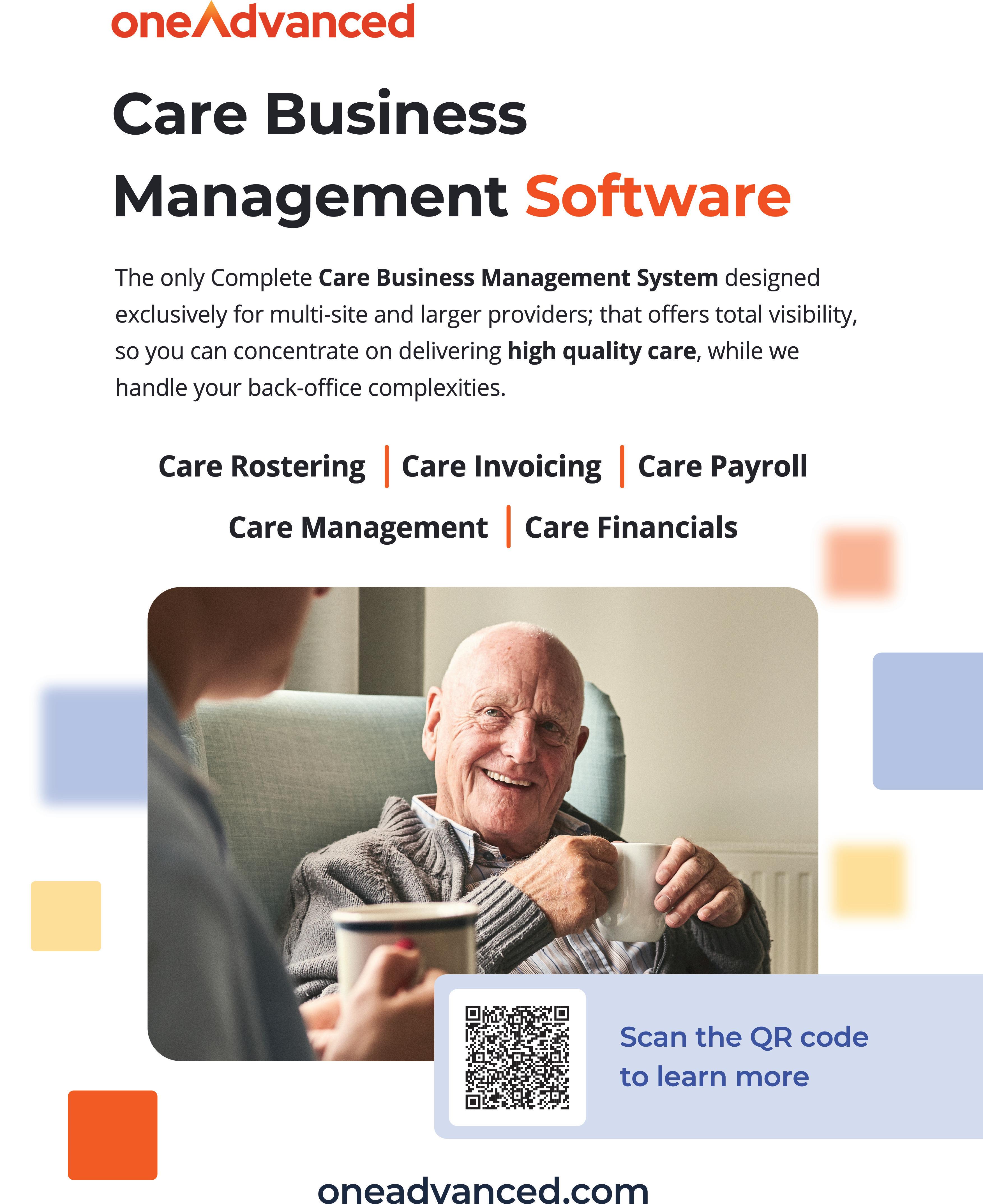















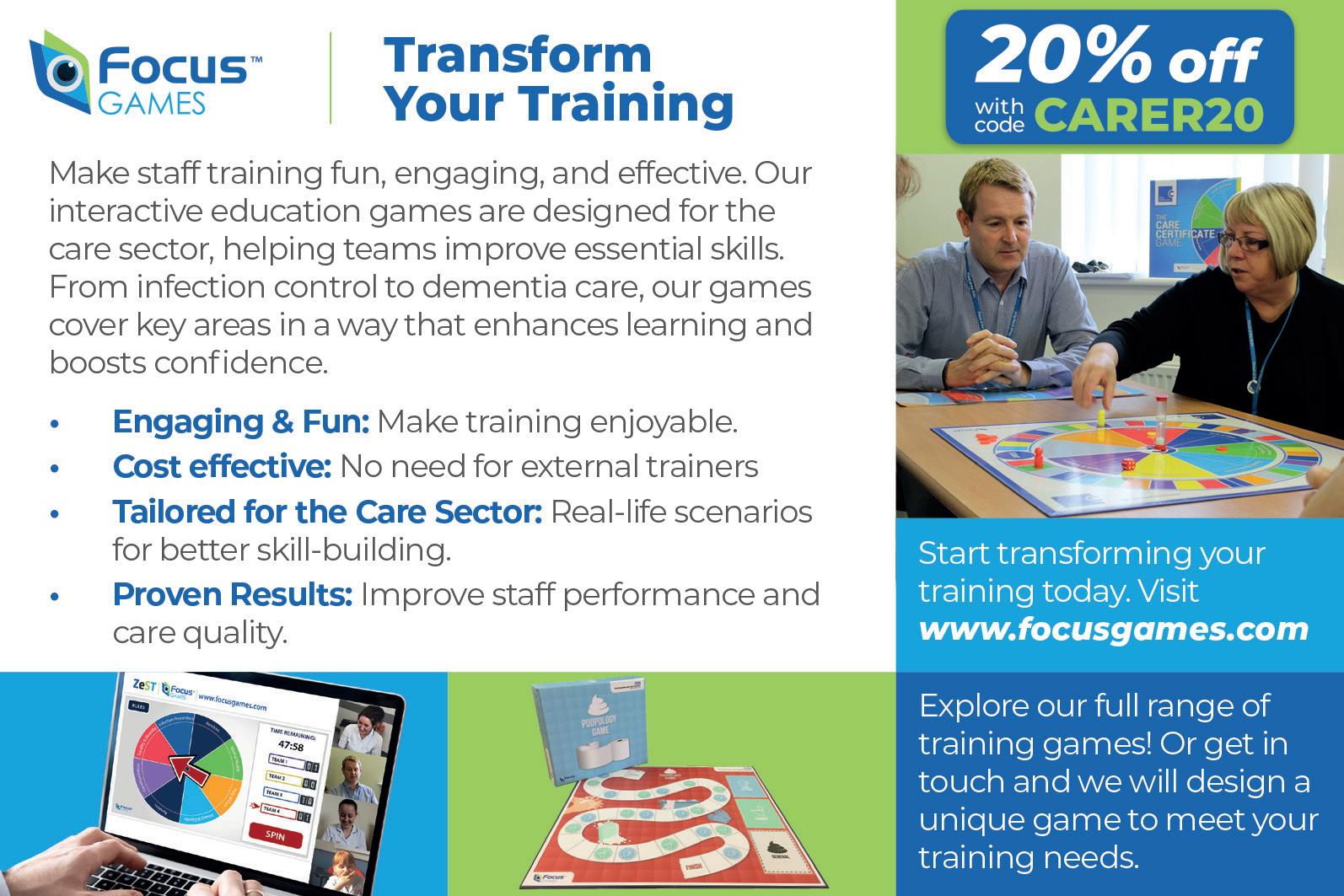
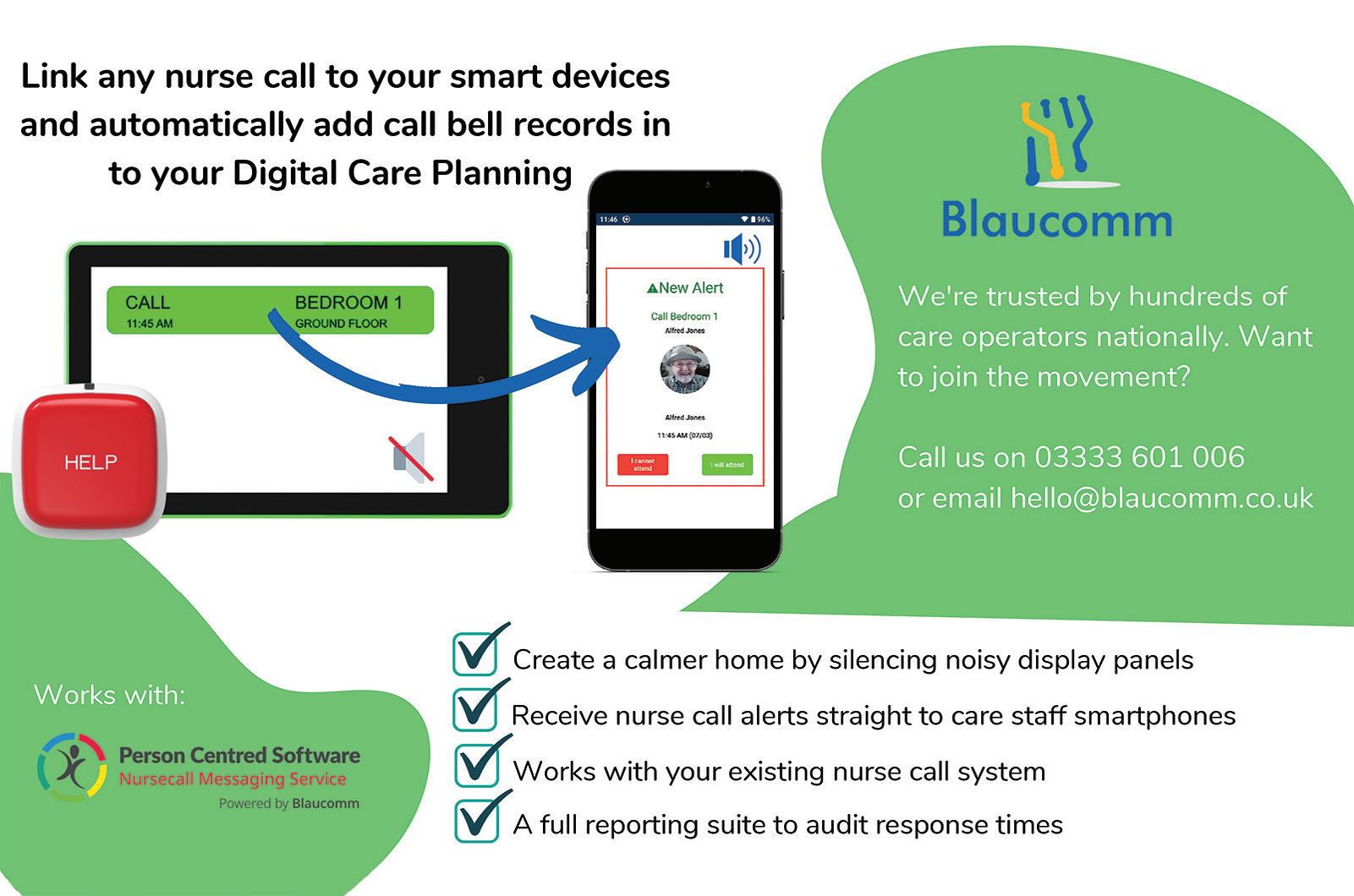
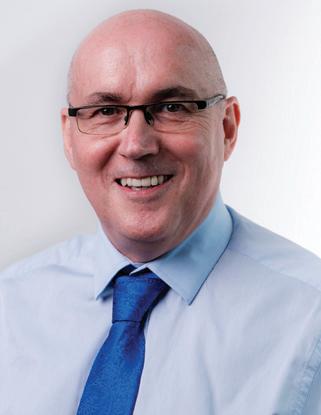
Dr Penny Dash's comprehensive review of patient safety across the health and care landscape, as seen in our lead story, has delivered a rather critical verdict on the state of quality oversight in Britain's social care system.
For our readers operating residential and nursing homes, this report does I feel, represent both a stark wake-up call and a genuine opportunity for transformative change.
The statistics are sobering. With 82,000 preventable deaths in 2022 alone and more than 40 overlapping organisations claiming responsibility for care quality, the current system isn't just broken—it's actively hampering the delivery of safe, effective care.
The review's finding that adult social care quality oversight remains "underdeveloped" compared to acute healthcare settings will surprise no one working in our sector, but the official acknowledgment of this disparity is long overdue.
Most striking is the revelation that over £100 million has been spent on safety reviews and inquiries over three decades, generating more than 1,400 recommendations from 30 separate inquiries. This is an appalling waste of our taxpayer money.
It represents a system that has become obsessed with process over outcomes, creating what Dr Dash accurately describes as a "confusing and duplicative" landscape that serves no one well—least of all the vulnerable adults who depend on quality care, and we see that all too often in any inquiry.
For care home operators, I am sure they will agree, navigating this maze of oversight bodies has become an exhausting distraction from core business: delivering com-
passionate, person-centred care.
The report's criticism of insufficient patient engagement mechanisms resonates deeply with providers who struggle to balance the demands of multiple regulatory bodies while maintaining meaningful relationships with residents and their families.
Health and Social Care Secretary Wes Streeting's response to the review has been, to be fair, characteristically forthright. "Over the past decade and a half, a labyrinth of healthcare regulation has been left to spiral out of control –overcomplicating a system that is needed to save lives," he acknowledged, promising that the recommendations would help streamline the patient safety landscape.
The Government's acceptance of all nine recommendations represents a significant commitment to reform, but the devil will be in the implementation.
Streeting's promise to "streamline the patient safety landscape" must translate into practical improvements that reduce bureaucratic burden while genuinely enhancing care quality.
Perhaps most significantly, this review positions adult social care at the heart of national quality discussions for the first time in decades.
The recommendation for "an evidence-based national strategy for quality in social care" acknowledges what the sector has long argued: that quality cannot be improved without clear metrics, consistent standards, and adequate investment.
Professor Martin Green's observation that this marks "a pivotal moment" is apt. The review's call for person-centred outcomes, equity of access, and attention to lived experiences represents a fundamental shift from tick-box compliance to meaningful quality improvement. Care England's "decaf by default" initiative, highlighted in the review as sector innovation, demonstrates that providers are already leading on practical safety improvements when given the freedom to do so.
The recommendation that the Care Quality Commission should "continue to rebuild with a clear remit" and overhaul its processes to be "sector specific" comes at a crucial time. With the CQC under new management following earlier criticism of its effectiveness, there's an unprecedented opportunity to create a regulatory framework that works
Carer is published by RBC Publishing Ltd, 3 Carlton Mount, 2 Cranborne Road, Bournemouth, Dorset BH2
damage. Views expressed within this publication are not necessarily those of the publisher or the
responsibility for any effects, errors or omissions therefrom. All rights reserved, reproduction is

for both providers and those who receive care.
However, the integration of the Health Services Safety Investigations Body into the CQC raises questions about whether consolidation will genuinely improve effectiveness or simply create another layer of bureaucracy, leading to more “reviews and inquiries”.
The success of this restructuring will depend on the regulator's ability to reach out to and develop genuine sector expertise and move beyond the one-size-fits-all approach that has characterised much of its work to date.
The review's emphasis on technology, data, and analytics playing "a much more significant role" in supporting care quality represents a critical opportunity.
A national strategy that provides clear guidance on technology adoption, data standards, and innovation pathways could unlock significant improvements in both care quality and operational efficiency.
The challenge now is ensuring that these recommendations translate into meaningful change rather than yet another round of reorganisation.
The Government's commitment to incorporating the findings into its 10 Year Plan for Health is encouraging, but adult social care has been promised transformation before, only to see initiatives founder on inadequate funding and political neglect.
For care home operators, I suspect this review offers both hope and a call to action.
The recognition that excellence in care is "localised and fleeting" rather than systematically supported must drive sector-wide commitment to sharing best practice and raising standards.
The proposed National Care Service and the work of the Casey Commission will provide further opportunities to embed quality at the heart of social care provision.
Dr Dash's review has provided a roadmap for change, but implementation will require sustained political will, adequate resources, and genuine partnership between government, regulators, and providers.
The alternative—continuing with a system that has demonstrably failed to deliver consistent quality improvements despite massive investment—is simply unacceptable..
I would encourage our readers to sign up for our biweekly digital newsletter at www.thecareruk.com and follow us on social media for all the latest news.

The review maps the broad range of organisations that impact on quality and focuses on six key national organisations that have an impact on safety.
These included:
• the Care Quality Commission:
• the National Guardian’s Office
• Healthwatch England and the Local Healthwatch network
• the Health Services Safety Investigations Body
• the Patient Safety Commissioner
• NHS Resolution
The review found that despite substantial investment and numerous reform initiatives, measurable improvements in care quality remain elusive across the health and social care system.
The findings are particularly relevant to care home operators, as the report identified critical gaps in adult social care quality oversight—an area the review described as "underdeveloped" compared to acute healthcare settings.
Among the report's most striking statistics, 82,000 preventable deaths occurred in 2022 alone, largely attributed to ineffective care delivery.
CONFUSING SYSTEM
Dr Dash's analysis revealed that more than 40 organisations now hold formal roles in care quality oversight, creating what the report termed a confusing and duplicative system. This proliferation of bodies has occurred alongside significant workforce expansion—NHS nursing staff increased by 34% and doctors by 37% since 2013—yet patient outcomes have not improved proportionally.
The review identified over 1,400 recommendations emerging from 30 separate inquiries conducted over three decades, with many lacking proper cost-benefit analysis. Total spending on safety reviews and inquiries exceeded £100 million, while indirect costs were estimated to be substantially higher.
For residential and nursing home providers, the report's findings underscore broader systemic challenges affecting the entire care landscape. The review noted that annual productivity losses in acute hospitals have reached £6 billion since 2019, reflecting efficiency problems that extend throughout the healthcare system.
The report's criticism of insufficient patient engagement mechanisms is particularly relevant to care home operators, who must navigate complex relationships with residents, families, and multiple oversight bodies.
ACCEPTED IN FULL
Dr Dash has made nine recommendations, which the Government has it says, accepted in full and form an important component of its 10
Year Plan for Health, published last week. The recommendations are:
1. There should be a refreshed strategy for improving quality of care, which will be delivered by revamping and revitalising the role of the National Quality Board.
2. The Care Quality Commission should continue to rebuild with a clear remit and responsibility and overhaul its registration and inspection processes to ensure they are “sector specific.”
3. The Health Services Safety Investigations Body should continue as a centre of excellence for investigations, but as a discrete branch within the Care Quality Commission.
4. The hosting of Patient Safety Commissioner should transfer to the Medicines and Healthcare products Regulatory Agency (MHRA) to strengthen links between the patient voice in medicines safety and the MHRA’s work to capture adverse events more effectively. The Patient Safety Commissioner’s work on wider patient safety should transfer into a new directorate of patient experience in DHSC.
5. Local Healthwatch and the engagement functions of integrated care boards (for healthcare) and local authorities (for social care) should be brought together to ensure patient and community input into the planning and design of services, and the strategic functions of Healthwatch England should also be transferred into the new patient experience directorate in DHSC.
6. Staff voice functions should be strengthened, with the responsibilities of the National Guardian for Freedom to Speak Up incorporated into the new DHSC structure and providers.
7. The responsibility for and accountability of commissioners and providers to deliver and assure high quality care should be reinforced.
8. Technology, data and analytics should play a much more significant role in supporting the quality of health and social care.
9. There should be an evidence-based national strategy for quality in social care.
PIVOTAL
Professor Martin Green OBE, Chief Executive of Care England, said: “This report marks a pivotal moment. It rightly identifies that safety and quality in care cannot be improved by endless fragmentation, duplication, or reactive oversight alone. What’s needed is a unified vision and a commitment to improving outcomes in both health and social care. We strongly support the call for a national strategy for adult social care quality, and stand ready to work with the government to develop it.”
The review found that social care remains underrepresented in national discussions on safety and quality, even though millions of adults rely daily on care and support. Care England welcomes the recommendation that more attention be paid to metrics that truly reflect quality in care homes and domiciliary care, particularly person-centred outcomes, equity of access, and the lived experiences of people who draw on care. Care England also welcomes the review showcasing
Care England’s work on ‘decaf by default’ as an example of the sector working together to prevent falls.
Professor Green added: “We must now move from words to action. The lack of nationally agreed quality metrics for adult social care must be addressed urgently. The opportunity is clear: a system that empowers providers supports innovation, and ensures that every individual receives safe, effective and compassionate care.”
NATIONAL STRATEGY
Kathryn Marsden OBE Chief Executive of the Social Care Institute for Excellence (SCIE) said:
“This review couldn’t be clearer: we need a national strategy for quality in social care, one that both assures quality and enables improvement. Too often, excellence is localised and fleeting. What we need is a sustainable, system-wide commitment to safe, high-quality care that everyone can rely on.”
“SCIE stands ready to support the government’s reform ambitions, including the proposed National Care Service and the work of the Casey Commission. We know what good looks like. We’ve seen it. Our job now is to help the sector build on it, scale it, and make it stick.
We also welcome the review’s recognition of the central role culture plays in supporting safety, especially in safeguarding. A positive, values-driven culture isn’t a ‘nice to have’. It’s the foundation of effective, dignified care.”
“If we want better outcomes, we need better data, clearer standards, and a shared language for quality. But most of all, we need the will and the leadership to make that vision real. This review is a timely reminder of what’s at stake, and what’s possible.”
“NHS leaders welcomed Dr Dash’s review, Matthew Taylor, chief executive of the NHS Confederation, said: “The government has already announced plans to reduce costs from within the NHS, so it is understandable that some consolidation may be needed around the way national standards are set too. Any opportunity to reduce duplication should be welcomed, particularly where any money saved can be invested back into frontline care.”
“However, NHS leaders would encourage the government to not forget the failings in care that led to these bodies being set up in the first place and tread carefully so as to ensure their vital missions continue in future. Staff and patients will still need safe spaces where they can speak up.
“Given the importance of patient feedback informing the design and delivery of care, and following the abolition of Healthwatch England and local Healthwatches, NHS leaders would encourage the government to ensure ICBs and local authorities taking on these functions are adequately supported and resourced to do so effectively.”

The unveiling of the government’s long-awaited 10-year Health Plan has prompted immediate and varied reactions from across the health, residential and nursing care sector, with industry leaders and key organisations weighing in on the ambitious blueprint that promises to transform healthcare delivery through three fundamental shifts: from hospital to community care, from analogue to digital services, and from treatment to prevention.
As Health Secretary Wes Streeting outlined the government’s vision for a “fighting fit” NHS backed by significant investment in genomics and cutting-edge technology, care sector leaders have been quick to assess the implications for their services, examining how the plan’s emphasis on community-based care and preventative health measures will impact residential and nursing home provision, workforce planning, and the crucial interface between NHS services and social care.
The comprehensive strategy, which follows months of national consultation through the Change NHS initiative, has generated particular interest among care providers regarding its potential to address long-standing challenges around hospital discharge, integrated care pathways, and the sustainability of care services for an ageing population.

DR JENNIFER DIXON DBE, CHIEF EXECUTIVE OF THE HEALTH FOUNDATION, SAID:
‘From what we’ve seen so far, the broad ambitions of the 10year health plan – strengthening primary and community services, boosting prevention and harnessing new technology to help make it happen – are the right direction for the NHS.”
‘The NHS is not broken but – in the words of Lord Darzi – it is in a critical condition. The public overwhelmingly supports the NHS model – a universal, comprehensive, tax-funded system that is free at the point of use. So we welcome the scale of the government’s ambition and commitment to sustaining the NHS for decades to come.”
‘However, these ambitions have appeared in NHS plans for decades, so the question now is whether they will be backed up by the concrete policy changes and investment needed to turn them from rhetoric to reality. A clear delivery plan backed up by the right leadership and support will be needed. Otherwise, the critical benefits of AI and technology may not be realised.”
‘While we await the detail, the risk is that it is a plan for the NHS rather than a plan for health. To tackle the UK’s stalling health and for the NHS to remain sustainable, a comprehensive cross-government strategy is needed for rebuilding the nation’s health – for instance, through tacking poverty and strengthening public health. Just such an approach was promised in the government’s health mission but this is currently missing in action.”
‘There is also a risk that the plan is derailed by yet another reorganisation of NHS structures. Evidence shows that these reorganisations cause huge disruption and rarely deliver the benefits politicians expect, so the risk is that valuable time, effort and resources are diverted from improving patient care. Given funding for the NHS and other public services is so constrained, this is a distraction that the health service and patients could do without.”
‘We welcome the focus on developing a neighbourhood health service. This could offer more convenient services tailored to people’s needs. But history tells us that developing new models of care takes time and a stable policy environment. Even then, it is unlikely to deliver big cost savings. Bringing services together under one roof does not automatically mean people’s care will be better as a result – particularly when social care and other services in the community are under so much strain. Investment in modernizing buildings and IT will be needed to make it happen, as well as support for staff to work together in new ways.”
‘Ultimately, politicians will need to stand behind their commitment to shifting how care is delivered. The danger is that the Prime Minister’s commitment to tackling hospital waiting lists trumps the more fundamental changes needed.’

JOSEPH BRUNWIN, UK POLICY AND PUBLIC AFFAIRS
MANAGER AT THE ROYAL COLLEGE OF OCCUPATIONAL THERAPISTS, SAID:
‘This long-awaited plan sets out an encouraging vision for the future of health and care – with a clear focus on prevention, digital transformation and delivering more care in the community. These are all areas where occupational therapy already makes a vital contribution and we welcome the alignment with our own workforce strategy.”
‘Occupational therapists have the skills and insight to be at the heart of neighbourhood health services – working across communities to keep people well and connected to the support they need close to home. They are central to preventing hospital admissions, supporting mental health and enabling people to do the activities – occupations – they want and need to do.”
‘But there aren’t enough occupational therapists and many people are waiting too long for the support they desperately need. So, while we’re encouraged that the government will publish a new 10-Year Workforce Plan, it’s imperative that this delivers an enlarged and strengthened occupational therapy workforce to achieve these ambitions.”

‘We look forward to working with government, the NHS, and partners across health and social care to embed occupational therapy across systems where they can have most impact, ease pressure on frontline services and help people stay well for longer and live their best life.’
CARERS TRUST’S CEO, KIRSTY MCHUGH, SAID:
“Bringing the NHS closer to the community makes a lot of sense if it’s carried out effectively. Unpaid carers already provide care in the community, so this plan needs to strengthen those connections. We’re pleased to see a commitment to including unpaid carers and patients in care planning – something Carers Trust has long been calling for.”
“But if this plan is to work and truly deliver its transformative potential, unpaid carers and local carer services will be needed more than ever. Cutting waiting lists, getting patients out of hos-
pital more quickly and helping people stay at home all rely on the 6 million people in the UK who care for family and friends. If its ambitious goals are to be achieved, the Government must recognise the vital role of carers and local carer services by ensuring they’re properly supported.”

SARAH WOOLNOUGH, CHIEF EXECUTIVE OF THE KING’S FUND SAID:
‘As the government publishes its 10-year plan for health today, what patients, the public and those working in the NHS will want to know is: why it will be different this time, and how soon it will lead to improvements. When will it mean people can see a GP more easily, or get mental health support for their child, or not wait hours in A&E?”
‘There is plenty to welcome in the details we’ve seen so far, with the biggest changes outlined being about how people access NHS services, with the rollout of new Neighbourhood Health Centres and a much greater role for the NHS app. At The King’s Fund our call for a fundamental shift of care from hospital to community and a more people-first approach has been echoed by successive governments – so, whilst welcome, the vision itself is not new; the radical change would be delivering the vision.”
‘An NHS that is more responsive and convenient, focused on helping people manage their health close to home where possible, will strongly resonate with the public. This much better fits the needs of our population today – people living for longer, but increasingly with long term conditions such as diabetes, heart disease and dementia.”
‘However, history has shown us that you can’t simply co-locate different health professionals in a building and expect a neighbourhood health service to flourish. In order to ultimately offer a more personalised service to the public, health and social care professionals will need to work differently to join up patient care. It is critical that general practice is at the heart of these new centres, and capital investment will also be needed to ensure they are in genuinely accessible community locations and able to make use of the latest technology.”
‘While a neighbourhood health service and expanded use of digital technologies are critical for re-imagining our health service in 2025, the plan will ultimately fail if it doesn’t also do enough to tackle the factors that lead to poor health and demand for healthcare in the first place.”
‘We believe that the shift from sickness to prevention is pivotal to improving the nation’s health, and whilst we are encouraged by some of the measures outlined to improve health – to work with businesses to support healthier eating, and to provide easier access to weight management services and obesity treatments –taken together this does not feel sufficiently radical to provide the sea change that’s required. We can’t duck the reality that we are an international outlier with stagnating life expectancy and with millions living many years of life in poor health.”
‘The clarity from the government about its priorities is welcome, and whilst the plan tells us what we will get, it is not explicit about what we may not get as a result. Unlike previous plans, this plan will not come with promises of significantly more funding or staff to deliver the improvements patients need. The government will need to be honest with the public and those working in health and care about the tough choices that will have to be made as a result.”

MATTHEW TAYLOR, CHIEF EXECUTIVE OF THE NHS CONFEDERATION, SAID:
“The ten-year health plan is a landmark moment for both the NHS and wider health and care system. We welcome its bold ambitions, and our members stand ready to work in partnership with the government and NHS England to make the vital reforms needed to put the NHS on a long-term sustainable footing. The reality is that without the radical action outlined in the plan, the NHS as a universal service is in unprecedented danger.”
“A key part of making sure this plan is successful will be resetting the relationship between the NHS and the public so that local communities are placed at the heart of these reforms and people are supported to be active agents in their own health and wellbeing.”
“Health leaders fully support the commitment to shift more care out of hospitals and into the community. Boosting neighbourhood health services is a vital step towards a more preventative, community-based NHS. Bringing care closer to people’s homes through neighbourhood health teams recognises the complex and interconnected challenges many patients face.”
“Delivering on this ambition will require sustained investment in digital and estates, support for the NHS’s workforce, and a commitment to decentralise national control by empowering local leaders to do what is best for their communities. Extra capital funding will be vital if the NHS is going to be able to develop new community health centres. That is why we have welcomed the government’s commitment to invest further capital funding and to explore how private investment can be channelled into the NHS.”
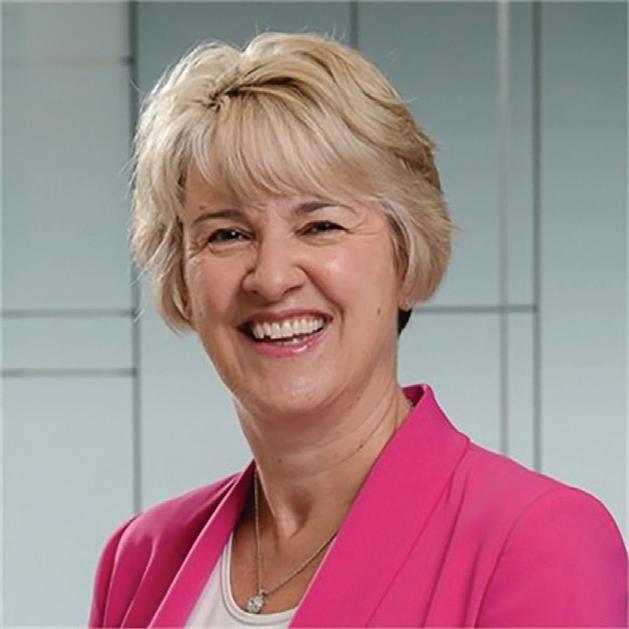
JILL MASON, PARTNER AND HEAD OF HEALTH & CARE AT MILLS & REEVE, COMMENTS:
“The sector has been waiting with bated breath for the NHS 10 Year Health Plan ever since the Prime Minster first pledged to create it following Lord Darzi’s review of the NHS last September.”
“Given the size of the NHS there is a lot for the plan to cover! There is much to digest around key areas such as primary care and neighbourhood health, mental health, digital transformation and AI. It’s a seminal moment for the NHS and fascinating for all stakeholders in both the public and independent sector.”
“The next phase of the 10-year plan will be critical. While this lays the foundations for an exciting future, the pace of change and the cost of implementation will need to be carefully balanced to bring this document to life and to fulfil its promise.”
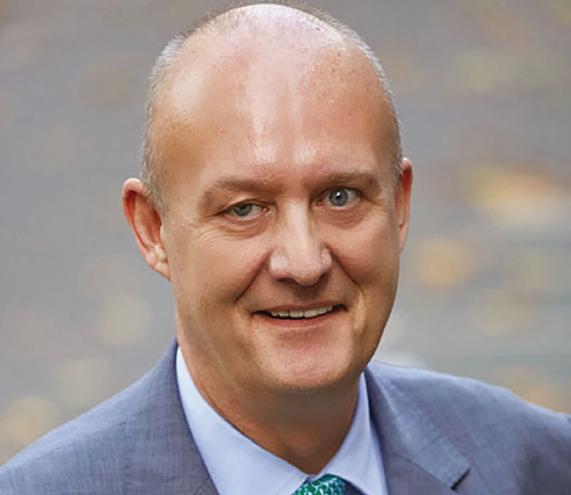
Care England has welcomed the ambitions of the Government’s 10-Year Health Plan – but warns that without clarity on how adult social care is integrated into delivery, the plan risks being built on fragile foundations.
The plan outlines a major transformation of the NHS, built around three core shifts: moving care out of hospitals and into communities; replacing outdated systems with digital tools; and focusing on prevention rather than late intervention.
Central to this vision is the creation of Neighbourhood Health Services – integrated teams delivering everything from diagnostics to rehabilitation, mental health to lifestyle support, in local centres and on people’s doorsteps. Yet despite references to social care workers, the plan falls short of detailing how social care providers – the very backbone of community support – will be empowered and resourced to lead this transformation.
Professor Martin Green OBE, Chief Executive of Care England, said: “This is a plan that talks our language – prevention, personalisation, community-based care. But we’ve heard similar aspirations before, and the challenge has always been implementation. The NHS cannot deliver this vision alone. If adult social care is not put at the centre of delivery – not just as a partner, but as a leader – this plan will falter.”
Care England emphasised that adult social care already provides much of the kind of support envisioned in the plan: long-term care for people with complex needs, step-down and reablement services, holistic community engagement, and workforce models rooted in local neighbourhoods.
Professor Martin Green OBE added: “The plan speaks to a future we’ve already been building. But vision
Celebrations were in full swing at the Boroughbridge Manor Care Home in Boroughbridge as one of its residents reached her 105th Birthday.
Hetty Launchbury was surrounded by her loved ones, her fellow residents and colleagues at the home.
Hetty and her family were incredibly touched by the outpouring of community affection after the home set out to obtain 105 birthday cards. In the end Hetty received 167 cards from not just the

local community but from all over the country.
Hetty also received a surprise visit from the Mayor of Boroughbridge, Councillor Pauline Phillips as she visited the home to spend time with the birthday girl and her family.
Susan Carter, General Manager of Barchester Boroughbridge Manor added: “We’re delighted to be celebrating a truly remarkable woman as she reaches this amazing milestone. Hetty is such a popular resident who always has an interesting tale to tell, and we look forward to hearing many more as she continues her centenarian journey.
alone isn’t enough. Providers need clarity, investment, and status. Without a clear role for adult social care, this plan will leave a gap between policy and reality.”
The plan sets an ambitious target: by 2027, 95% of people with complex needs should have a co-produced personalised care plan – a major jump from the current 20%. Care England warns that without meaningful involvement of care providers – who know these individuals best – such targets will remain out of reach.
The timeline of the NHS plan also aligns with the forthcoming Casey Commission, expected to report in 2026.
Care England stresses that these two agendas – health reform and care reform – must move forward together.
Professor Martin Green OBE concluded: “This is a once-in-a-generation opportunity to reshape care and health around people’s needs, not system convenience. But we need to see investment in social care infrastructure, digital inclusion, and workforce strategy. The Government must now give as much attention to social care reform as it has to NHS reform – or neither will succeed.”
“Neighbourhood Health Services could transform how people experience care. But without social care at the centre, they risk becoming a brilliant idea lost in translation. If we’re serious about delivering care closer to home, we must start by backing the sector already delivering it.”

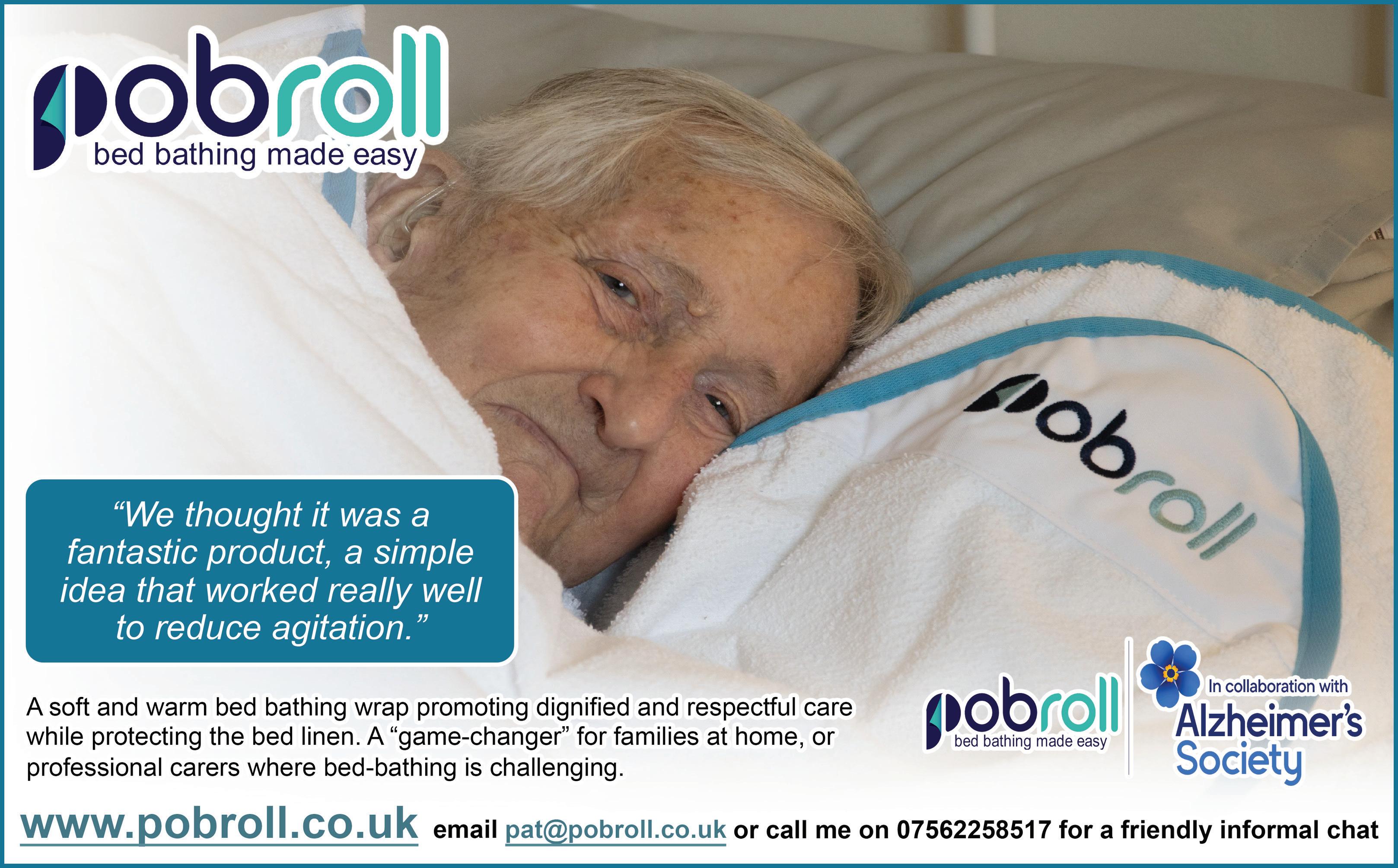
By Dr Nichola Stefanou, Chief Executive Officer - Healthcare Management
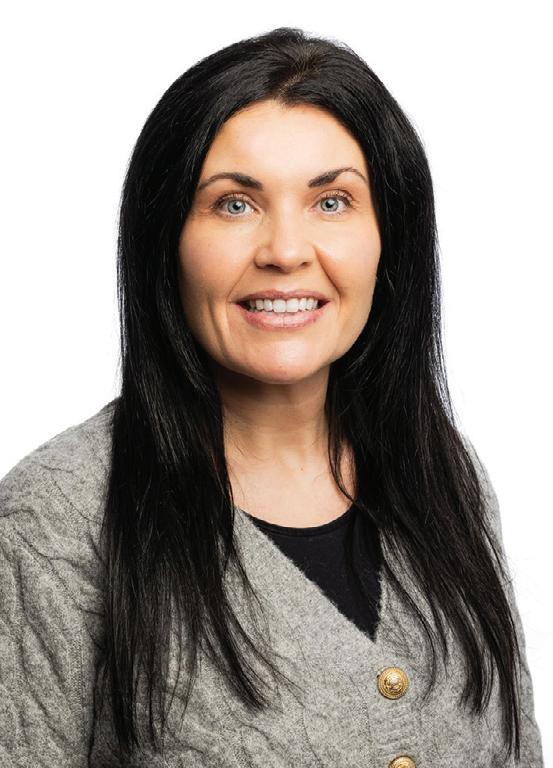
It’s fair to say the NHS 10-year plan received a mixed response from across the sector. It was met with praise and positivity from some, while some approached it with scepticism, and some were left with more questions than answers. And it’s easy to see why.
In nearly 200 pages, it set out plans to refocus the NHS on prevention rather than cure, to usher in a new digital age and to create a community service where patients are treated nearer to home instead of big, acute hospitals. These are big ideas, which will require big planning, big buy-in from all corners of healthcare, not just the NHS, and big budgets. I shared in the mixed response. Parts are very welcome and exciting, and there were parts where I was left with the question: ‘how will this play out in reality?’
Community positivity but how will social care fit in?
The proposal to move to more community-based services is positive. As a care provider reaching marginalised communities, we know the benefits this can bring to patients and their families. Patients feel in control of their care, they feel heard when they’re in more familiar surroundings and for some, reduced travel times to receive treatment will improve their outcomes. All of this should be commended and supported as community hubs begin to be planned and implemented.
However, as a social care provider, it was somewhat disappointing to see only fleeting mentions of social care throughout the plan. The NHS relies on social care and vice versa. You cannot have one without the other. If you reform the NHS, you must reform social care and this iteration of the 10-year plan does not convince me that the government sees social care in the same light as the NHS and worthy of reform. What was pleasing to read, however, was that social care professionals will be part of community teams and their involvement in rehabilitation, recovery and frailty prevention will deepen. This is good news. I have often talked about the need to provide enough resources to social care providers to ensure they are able to offer patients reablement or rehabilitation that will actually improve health outcomes and quality of life. If not, patients in the community are likely to deteriorate more rapidly, leading to hospital admissions. It's a vicious cycle that needs to be broken. I am hopeful that this is the first step to breaking that cycle. It was also good to see a commitment to improving pay terms and conditions for social care staff through Fair Pay Agreements. However, providers in the sector are all concerned about where the money will come from to cover this rise in costs. The likelihood of increased hourly contract values are slim therefore posing
the question, ‘Will providers now be expected to find more money from contract values that already don’t cover existing costs?’ If we lose capacity in social care and decrease the quality of community placements, this will ensure many return back to hospital beds, which directly flies in the face of the new NHS plan. I also welcome the commissioning responsibilities for ICBs and the intention to simplify the commissioning process. Removing layers of bureaucracy is always positive and ensuring the money goes from one commissioning body straight to providers is a positive move. We are in the business of caring for people and communities so making this simpler is always a win in my opinion.
However, again, I am left with questions. How will the ICBs be able to be responsible for all but the most specialised commissioning using multi-year budgets? How will they decide where they spend that budget, and how are we telling leaders to be more innovative when they have only ever known an outdated and old-fashioned (in some areas) NHS? We could end up with a dichotomy: innovative plans working against a traditional, cumbersome system.
HMT is a not-for-profit private provider. For decades, we have supported our NHS colleagues and strongly believe the private sector has a responsibility to support the NHS wherever possible. It was rewarding to see the relationship between the NHS and private providers included in the 10-year plan, especially that there will be more discussions with private providers to expand NHS provision in the most disadvantaged areas. We are proud to provide thousands of NHS treatments across our sites to help alleviate pressures and ensure that patients receive timely and effective care, and we will continue to provide this support. However, we know that in some areas, there are NHS organisations that are not as open to working with private providers as others. We must remove the political prejudices and be pragmatic in allowing independent providers to the table to help tackle the challenges the NHS faces. Alongside the 10-year plan, the agreement to allow the NHS to make better use of the independent sector to tackle waiting lists as well as providing millions more appointments, which was reached earlier this year, is a welcome step in the right direction. I hope it will also encourage longer-term contractual relationships to be established, enabling further independent sector investment in NHS capacity, but also providing stability and security for the social care sector.
As with all government announcements, we will only know how successful it is in a decade’s time or if a new government are voted in. The 10-year plan is ambitious and rightly so – it needs to be. But ambition alone won’t drive change, and I am still left with the question ‘how will this play out in reality?’
True progress will depend on how these ideas are translated into action, how well social care is integrated into the bigger picture, and how openly all sectors - public, private, and community -based - are brought to the table. Only time will tell.
The walls of The Mayfield care home have been transformed into a celebration of Whitby’s heritage, thanks to a collaborative art project led by local artist Hilary Thorpe.
Inspired by a workshop with residents living at The Mayfield, many of whom have spent their entire lives in Whitby, Hilary developed the idea of a large-scale art project honouring local scenery.
Hilary said, ‘During one of my art workshops with the residents, we all painted patterns and colours on paper and made it into a torn paper collage. That evolved into the concept of three large collages that would reflect iconic Whitby views.’
Residents took part in regular art sessions to paint different parts of the scenes, like flowers, beach huts, and seagulls, and every contribution was incorporated into the final works, which now sit proudly on a foyer wall at The Mayfield.
Social Care TV continue to fly the flag for highest quality online training for Health and Social Care, after unwavering commitment to excellence within the sector for over 25 years.
Their widely-used health and social care specific courses - produced and edited in-house - are expertly designed to make learning engaging, informative and, therefore, highly effective for learners. Accredited by CPD, training with Social Care TV is quality assured, comprehensive and relevant.
As one of the leading online training providers in the health and social care sector in the UK, they supply training for local authorities, recruitment agencies, care home groups and other health and social care organisations.
Their feature-rich Manager platform has further been enhanced this year with the introduction of several new Manager tools designed to aid with compliance, reporting and trainee management. Features now available include:
• Compliance Dashboard with Traffic Light System
• Downloadable Trainee Matrix
• Custom Bundles
• Trainee Groups
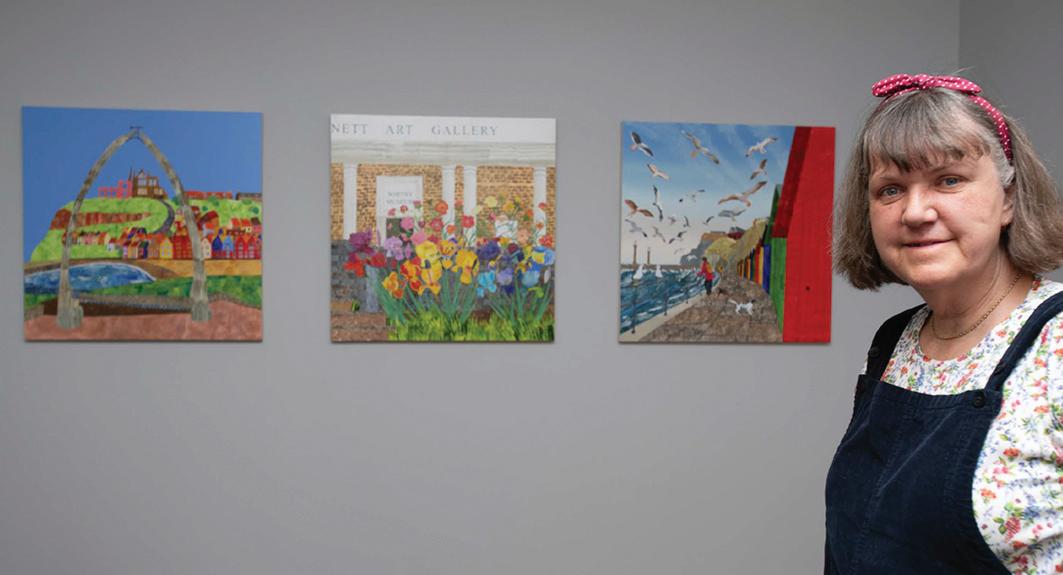
• Bulk Uploads
• Bulk Enrolment Onto Custom Bundles
• Course Enrolment Notifications
• Course Reminders
SCTV regularly release new and updated high-quality courses. Previews for all courses can be viewed at: Courses - Social Care TV (www.social-care.tv/courses/course-details)
To enhance their learners' experience further they have created free, comprehensive subject-specific workbooks which were rolled out across all courses this year. This unique addition provides excellent value and a fully robust training package.
SCTV are delighted to have won several awards over the last 12 months including:
• Best Online Health and Social Care Learning Platform’ – Global Health & Pharma Social Care Awards 2024
• ‘CPD Provider of the Year’ – The CPD Awards
• Social Care Training Provider of the Year’ - Corporate Livewire Innovation & Excellence Awards
Gold standard customer service remains a core staple of the business, with expert support and guidance provided via telephone, email and live chat. They place great importance on the training and development of their customer services team to ensure that they continue to provide a personal, friendly and knowledgeable service.
Their much-loved ‘Care Worker of the Month’ award recognises and rewards the selfless dedication shown by care workers across the UK
THE FINISHED PANELS DEPICT:
• A view through the famous Whale Bones to the East Cliff and Abbey
• The flowers and museum at Pannett Park
• A vibrant seaside scene featuring beach huts, the pier, and a sky full of seagulls
89-year-old resident Maureen Trafford said, ‘Everyone really enjoyed participating in the art project and forming new friendships whilst doing it. The final product is the outcome of how much we all loved making it, and I think the results are amazing.’
Natalie Gill, the General Manager at The Mayfield, added, ‘This has been such a rewarding experience for our residents. Hilary’s vision allowed our residents to connect with their memories of Whitby and their creativity. The finished pieces are a beautiful addition to The Mayfield.’

and they proudly support the Care Workers Charity who aim to advance the financial, professional and mental wellbeing of social care workers.
SCTV believe that high quality training should be accessible to all and offer regular, free courses which include a digital certificate accessible via their website.
The company stands behind a clear mission and set of values which define their ethos and their dedication to both the Care Sector and those within it. These can be viewed at: Mission Statement and Core Values - Social Care TV (www.social-care.tv/about/mission-statement-and-core-values) Social Care TV are a responsible business, committed to ensuring that their actions have a positive impact on their employees, customers, the wider health and social care community and the environment.
Above all, SCTV consistently strive to make a meaningful contribution to the wellbeing of those being cared for.
For more information please see: Homepage - Social Care TV (www.social-care.tv) and see advert on the facing page.
On 4th July 2024, the Labour Government was elected on a mandate of change. One year on, Access Social Care’s annual State of the Nation report reveals a stark continuation of Westminster’s failure to address long-standing crises faced by social care in England. The report paints a sobering picture for those reliant on a system under extreme strain – and not the change many older or disabled people had hoped for at the ballot box.
Key findings include a shocking 45.6% increase in safeguarding concerns raised through helplines compared to the previous year. Safeguarding involves protecting those who have been put in vulnerable circumstances from abuse or neglect, with public services working together to identify people at risk. This dramatic rise is reflective of massively overstretched systems and an increase in financial insecurity for those accessing care services.
Access Social Care is a legal rights organisation that exists to ensure people receive the social care they need and are entitled to.

The fifth annual State of the Nation report is based on a data collaboration project in partnership with Royal Mencap Society, Age UK, Carers UK, Independent Age, RNIB, Scope, Citizens Advice Bureau and Ealing Advice Service. The report identifies key challenges facing people who need social care and looks at the extent to which advice demand and provision has changed.
There was cautious optimism when Sir Keir Starmer took office that Labour might deliver on its early commitments to establish a National Care Service and implement much-needed workforce reforms. Yet, as the first year has unfolded, Access Social Care finds that the Government’s social care policies have fallen short of its own manifesto pledges.
Within months of the Labour government coming into office, major policy shifts – including increases to National Insurance Contributions (NICS) and the National Minimum Wage (NMW) – were introduced. The Nuffield Trust estimates the additional cost of these to the adult social care sector at £2.8 billion per year. Sector experts warn that funding provided to offset such costs have been inadequate, with the approach described as “reform in principle, austerity in practice”.
This strategy of containing public expenditure has been compounded by the establishment of the independent commission into social care, to be led by Baroness Louise Casey. Whilst Baroness Casey is a recognised talent, willing to speak out for positive change, the timetable for the commission further pushes back the timeline for reform. With the sector already a ‘sitting duck’, and numerous white papers outlining known
challenges already in circulation, many fear another cycle of rhetoric over action.
THE STATE OF THE NATION REPORT HAS ALSO FOUND THE FOLLOWING DURING LABOUR’S FIRST YEAR:
• 16.6% increase in advice provision identifying the need for specialist legal advice
• 10.7% rise in general social care advice queries within the information seeking category
• 8.6% increase in direct payment queries
• 7.5% increase in people receiving advice about social care through helplines
• 7.3% rise in unpaid carer queries
While there has been welcome change in some areas, including a reduction of those on waiting lists and a dip in staff vacancies, these gains are precarious. The sector continues to grapple with a longstanding workforce recruitment crisis, disparities between localities, and funding that has yet to match the true pace of demographic change and rising costs.
Kari Gerstheimer, CEO of Access Social Care said: “One year in, our data shows that rather than Labour turning the tide, safeguarding concerns have surged by 45%. This is a devastating marker of a system under extreme strain, where under-resourced services are failing to provide the social care we all need. The government’s policy decisions—particularly around National Insurance and wage uplifts—risk adding billions in costs to the sector without matching investment. We cannot reform social care with rhetoric.
“We urge the Casey Commission to break the cycle of delay and to seek full access to government data so it can deliver the bold, evidence-based solutions that people so desperately need. This is not only about budgets—it’s about rights, safety, and dignity.”
The current pressures on the system demand decisive leadership rooted in transparency and urgency. Access Social Care calls on the upcoming Casey Commission to be granted full access to government-held data and information, enabling it to develop robust recommendations that drive the meaningful change that Labour ministers have so often promised.
Labour’s first year in government reflects a complex balance of aspiration and constraint. While the administration has made notable policy moves and acknowledged the sector’s critical issues, its approach has been characterised by fiscal caution, incremental legislative adjustments, and a reliance on longer-term strategies that lack immediate funding commitments. Echoes of the past remain all too familiar.


The government recently announced plans to close the care worker visa for overseas recruitment in a bid to cut net migration levels, and it has caused some debate across the industry.
Set to come into force later this year, the plans mean care workers will no longer be recruited from overseas as part of a crackdown on visas for ‘lower-skilled’ workers. Instead, care home providers must hire British nationals or those overseas workers who are already in Britain.
This builds on measures introduced in April of this year that require care employers to prioritise hiring workers who are already in the country before recruiting from overseas.
While the government insists the initiative will grow domestic skills, end reliance on overseas labour and boost economic growth, it is a worrying prospect for the care sector which is already buckling under huge pressures of staff shortages, rising costs and chronic underfunding.
Across the industry, our teams and residents rely on the hard work of overseas workers, and the government’s proposal appears to downplay just how crucial their contribution is. Without the support of overseas workers, our most vulnerable in society could be at serious risk of lacking the care they need and deserve, if we cannot recruit adequate numbers of staff locally.
EXACERBATING STAFF SHORTAGES
Figures predict the plans will cut up to 50,000 lower skilled workers coming to the UK over the next year, with the government estimating there will be 7,000 fewer care workers as a result.
These figures are worrying when we consider the staff shortages we are already facing in the sector. Skills for Care estimates there were 131,000 vacancies across adult social care in 2023-24, and that an additional 540,000 workers will be needed by 2040 to support the nation’s ageing population.
To address this growing vacancy rate, international recruitment levels rose to 105,000 in 2023/24, up from 80,000 in 2022/23. Without the support of overseas staff, in some areas, we simply will not be able to deliver the care our most vulnerable people need.
Social care roles are low paid, demand long hours, are physically and emotionally taxing, and are typically viewed as low skilled and low status. It is primarily for these reasons that the sector fails to recruit enough workers, and until these factors are addressed, we will continue to struggle to recruit enough staff domestically.
The government has promised to bring in a new fair pay agreement for care workers to make these roles more attractive to UK nationals, creating an official body to set pay and conditions for staff. While this is a positive start, more needs to be done to make care workers feel valued, or we run the risk of reaching crisis point.

By Bethan Evans, CEO of My Choice Healthcare
According to Age UK, overseas recruits are keeping many care services afloat and, without them, homes could be forced to shut their doors permanently – and other sectors will also be adversely affected. Without sufficient staff, care homes cannot provide the high-quality care residents deserve, and this can potentially lead to closure, leaving the NHS to pick up the pieces.
It is well documented that the NHS is under relentless pressure, with official figures showing that, at the end of April 2025, there were 7.39 million people waiting for treatment and 6.23 million people waiting for care. In Wales alone, 800,400 patients were waiting to start treatment, according to figures from February of this year. Given the struggles the NHS is facing, social care has never been more important, and it is crucial that we do everything in our power to keep vulnerable people out of hospital.
The overseas workers who contribute so much to our care teams play a vital role in keeping the NHS going and, without them, health services will struggle. Failing to provide an adequate alternative to overseas recruitment isn’t enough to get the NHS back to its best.
If services are forced to close or staff are spread too thin, residents can face disruption which can affect the quality of care they receive.
Residents need consistent support to help them thrive, as any sudden changes or disruption can be confusing or unsettling. Staff who are stressed, overworked, or burnt out by the demands of the job are more likely to need time off sick or to leave the profession altogether, creating inconsistencies in care. Workers facing these conditions are also more likely to be unmotivated or prone to making mistakes.
These issues are all exacerbated by staff shortages, and cutting off overseas workers from taking care roles will only make the problem worse. Time and patience are needed to develop the relationships and trust required to deliver adequate care but, if teams are stretched too thin, this becomes challenging.
Staffing issues may also result in care homes considering hiring employees who lack the required qualifications and experience, causing further problems with quality of care. Those in need should not be paying the price, and the government should seriously consider how care homes can support residents without having the staff needed to do so.
The government’s plans to ban the recruitment of care workers from overseas needs a rethink, as it is care home staff and residents who will suffer. Without the skills of overseas workers, we will struggle to tackle the staff shortages that are plaguing the social care and other sectors, placing even more pressure on teams and the NHS.
All residents deserve high quality care, but this becomes increasingly difficult for teams to deliver when they are placed under additional pressures due to lack of staffing. The government needs to consider a viable alternative or face the consequences of a care sector in further crisis.


• We specialise in the sale and purchase of quality used wheelchair accessible vehicles and ambulances.
• They can be bought as seen or refurbished and sign-written to your own requirements.
• Fully serviced, new mot & warranty
• Engineers inspection supplied if required.
• Free delivery service available
• All buses comply with new legislation
•
• Lease hire and purchase


A new report from think tank the Institute for Public Policy Research (IPPR), has set out its plan to stop the spiralling costs of adult social care by pivoting towards prevention.
As adult social care costs continue to increase – rising to £23.3bn for local authorities in 2023/24 – alongside additional pressures from an ageing population, there is an urgent need to be proactive.
This current government’s manifesto commitment to set up a National Care Service is being led by the Casey Commission, reporting in 2026 and concluding in 2028. The authors of the IPPR report say this Commission, like all the previous attempts to fix the crisis in adult social care, will fail if it doesn’t take a radically different approach to the commissions, reviews and consultations that have preceded it. INSTEAD, THE GOVERNMENT SHOULD FOCUS ON SUPPORTING INDEPENDENT AND HEALTHY LIVES THROUGH A ‘RIGHT TO LIVE AND AGE WELL’, FOCUSING ON PREVENTION, INCLUDING:
• Investing in age- and disability-friendly communities including exercise groups and community centres, to support older people and people with disabilities to stay healthy and active
• Assessing the care needs of all adults turning 65, to diagnose any risks and offer up-front preventive support before needs escalate
• Providing further training and development opportunities to carers, so they can provide better, more personalised care
The authors point towards Japan, which has the highest proportion of the population aged over 65 in the G7. On turning 65, people are automatically assessed on their abilities to care, cook, and look after

themselves. Care is then managed by community comprehensive support centres, which employ long-term care specialists, care managers, and social workers.
This model emphasises preventative care and home-based services, reducing both cost and reliance on institutional care while supporting family caregivers. As a result, Japan has half the number of people in care homes as the UK, despite a much older population.
On the issue of costs, IPPR says a Dilnot-style cap to individual contributions, with additional central funding, is a sensible approach.
Residents of Fleetwood Hall Care Home in Fleetwood, part of Sandstone Care, recently enjoyed a very educational outing to Fleetwood’s local RNLI Lifeboat Centre, where they had the opportunity to learn about the lifesaving work carried out by the Royal National Lifeboat Institution (RNLI) and the rich maritime history of their local area in Fleetwood.
The group of ladies from the care home spent the day exploring the centre, discovering fascinating facts about Fleetwood’s lifeboat heritage dating back to the Victorian era and were warmly welcomed by the dedicated team of RNLI lifeguards, who shared personal stories and insights into their vital role in keeping local waters safe.
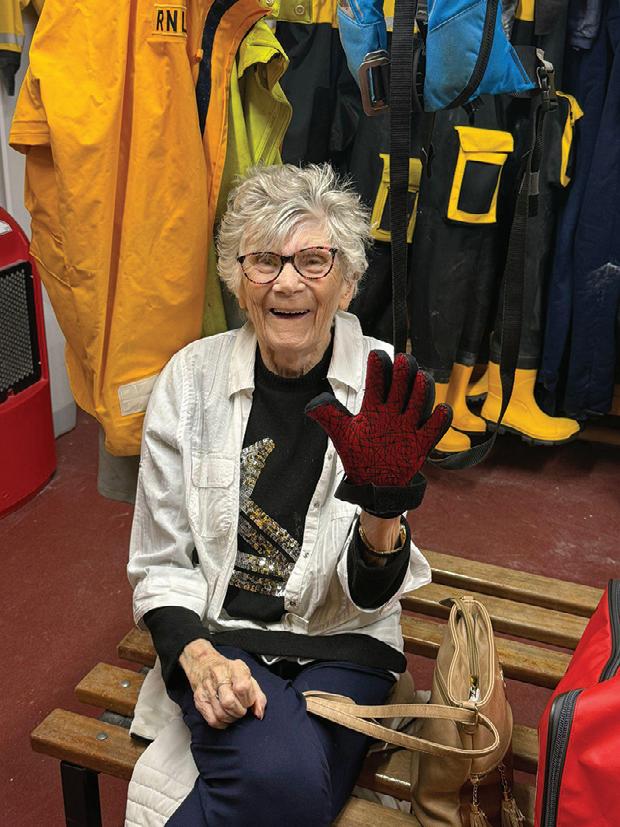
The RNLI has had a presence in Fleetwood since 1859, when the town’s first lifeboat station was established to serve the growing port and fishing community.
Situated on the edge of Morecambe Bay, an area known for its shifting sands and unpredictable tides. Fleetwood quickly became a key location for maritime safety and over the decades, generations of brave volunteers have crewed the lifeboats, risking their lives to rescue those in peril at sea.
As part of the visit, the residents were given the unique opportunity to dress in RNLI gear and tour the station’s offices. This gave them a glimpse into the daily routines and challenges faced by the lifeboat crews who remain on call 24/7 and generously give their time to service.
Fleetwood Hall manager Kimberly Lord said:
“It was wonderful learning about the brave work of the RNLI and seeing the lifeboats up close. It was a great experience for our ladies, and they had an amazing day out and were very grateful for the RNLI for their service and hospitality to our residents.”
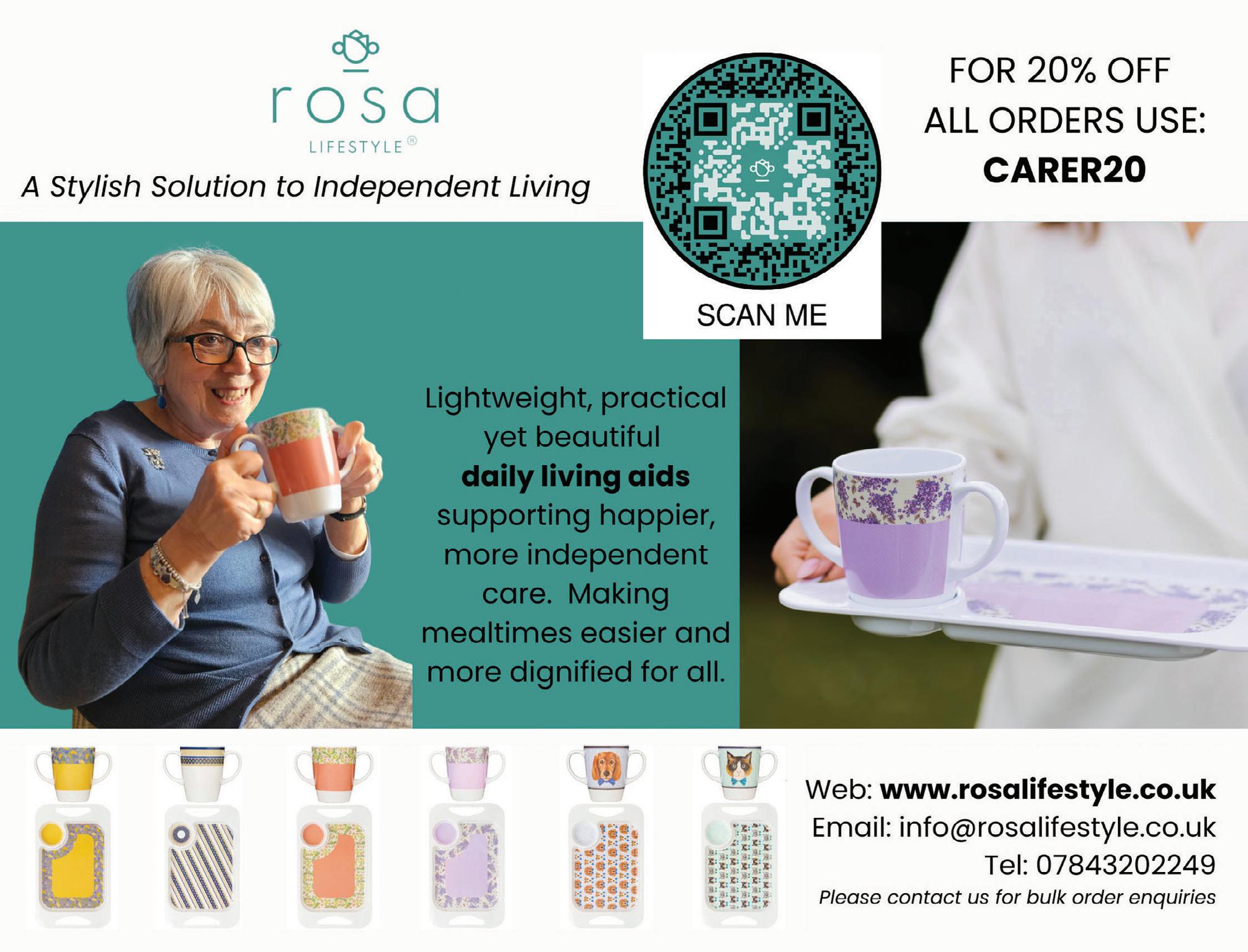
Dr Annie Williamson, research fellow at IPPR, said: “A proactive approach to adult social care, including universal MOT-style assessments at 65 and early support, could help people maintain independence for longer while reducing long-term costs.”
“A shift to prevention will mean fewer care home admissions, better quality of life for older adults, and more sustainable funding. As the UK grapples with rising demand and strained budgets, this kind of forward-thinking reform offers a way out.”
Sir Andrew Dilnot, chair of the 2010 commission into adult social care, said:“This paper argues powerfully and persuasively that good social care provision can be a wonderful way of enhancing human flourishing. For far far too long we have had a social care system that fails us all – those who need care, those who provide care, and those who might need care in the future. Acting now can transform lives for those with care needs, create a vibrant and exciting care sector, and finally fill this yawning and indefensible gap in our collective welfare provision. Let’s do it.”

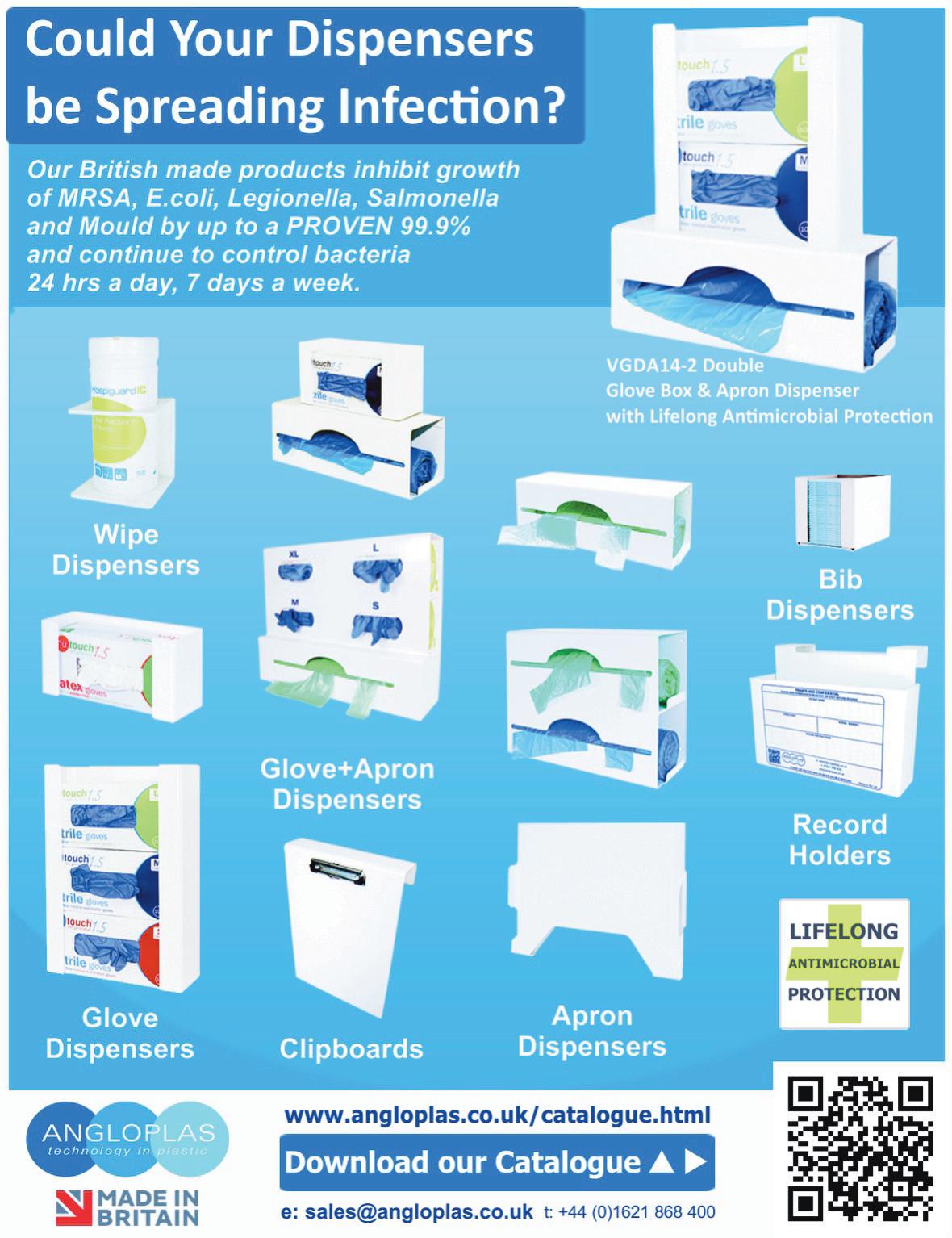

The UK care sector is facing a significant surge in insolvencies and restructuring activity, as a perfect storm of escalating operational costs and insufficient funding pushes providers to the brink. Adrian Slater, partner and solicitor at Nelsons (www.nelsonslaw.co.uk) specialising in insolvency, discusses the importance of early intervention and how care providers can prepare as financial pressures increase.
A recent survey by the Care Provider Alliance paints a grim picture: a staggering 22% of care providers are contemplating outright closure, 77% are being forced to deplete their reserves, and 64% anticipate staff redundancies. These figures highlight the severe distress within the sector, which is grappling with a multitude of challenges.
While the long-standing issues of underfunding and workforce shortages persist, the 2024 Autumn Budget has significantly intensified the pressure with increased business costs, particularly through Employer National Insurance Contributions (NICs) and National Living Wage uplifts. For a sector where many employees are on minimum wage, these uplifts translate directly into substantial increases in salary costs.
Beyond salary hikes, care providers are contending with a broad spectrum of rising operational expenses, ranging from energy bills and inflation of food and supplies to legacy debts that have made it even harder to absorb the current wave of cost increases.
The sector's woes are compounded by factors beyond direct financial outlays, with recruitment also taking a hit. Between 2022/23 and 2023/24, the social care vacancy rate fell from 9.9% to 8.3% and the number of vacancies fell from 152,000 to 131,000. However, this remains higher than the overall unemployment rate of 4.6% currently.
Care homes heavily rely on international recruits to fill vacancies, and the inability to access this talent pool means providers are having to pay more for staff they simply can't find.
Occupancy levels, which haven't fully recovered since the COVID-19 pandemic, are also a significant concern, which makes it incredibly difficult for care homes to achieve profitability. Furthermore, the relationship with local authorities, who often commission a significant portion
of care, presents its own set of challenges as many also face cashflow challenges.
The age of many care facilities presents a hidden cost as well; those built some time ago require ongoing maintenance and investment, but without the means to fund these essential upgrades, facilities can deteriorate, leading to further problems and regulatory scrutiny.
The Care Provider Alliance survey figures are clear indicators of a sector in distress, particularly the widespread reliance on reserves and anticipated redundancies. While redundancy is a legitimate tool to reduce overheads and not necessarily a 'red flag' in isolation, when combined with other factors, it can point towards an organisation heading for insolvency.
Drawing on reserves, while not immediately signalling insolvency in the strictest sense (as the business can still pay its debts), indicates a concerning trend. Unless income can be increased, fully utilising those reserves will quickly become a major problem.
The critical message for care providers is early intervention; the earlier a business owner seeks advice – even when just contemplating redundancies or drawing on reserves – the better. It's far more effective to seek advice from an insolvency specialist at that stage rather than trying to solve the problem in isolation. Doing so dramatically increases the chances of exploring restructuring or rescue options, rather than facing terminal insolvency like liquidation.
It’s expected and certainly recommended that care providers should undertake regular financial monitoring, no less than monthly, to spot potential problems straightaway. Similarly, this will help forecast financial projections, six to 12 months in the future ahead, if not further ahead, which can pinpoint any chance of cash shortages.
If a care provider is struggling to pay creditors when required, this is a clear issue that requires a conversation, perhaps to lengthen the terms, but it is also a good point to speak to an insolvency professional. The alternative, which is unfortunately a common route for some business owners, is trying to deal with the problem with personal money or high-interest borrowing – these rarely solve the underlying issue and can put the situation in a worse state.
There is a widespread myth that insolvency practitioners are seen as the 'undertakers', but the vast majority would much rather rescue a business and save jobs than put it into liquidation. Early engagement opens up many more options.
When a company is faced with financial distress, a variety of formal insolvency procedures are available. These include: • Company Voluntary Arrangement (CVA) - This allows incumbent
directors to remain in charge while repaying creditors over time under the supervision of an insolvency practitioner. However, viability for the care sector might be limited as it creates a sphere of insolvency around the business, which might deter new residents.
Administration More commonly used in the care sector, the primary aim of administration is to rescue the business as a ‘going concern’. An insolvency practitioner will often seek a buyer pre-appointment. Early advice is key here, as an administrator may be able to trade the business for a short period to maximise its value on the open market.
Restructuring plans: These are designed to save a viable business and maintain continuity of care for residents and employees, though it may result in creditors being left out of pocket. However, in reality, most insolvencies leave unsecured creditors with nothing anyway, with HMRC often being a preferential creditor and with secured creditors in the main being afforded priority over the unsecured creditors.
Liquidation: This is the final insolvency process when nothing else is viable. The business ceases trading, employees will be let go and residents must be removed. This necessitates crucial conversations with stakeholders to find alternative provision.
Given the imperative to maintain continuity of care, administration and restructuring plans are often the most suitable options for care providers, as they prioritise the sale or reorganisation of the business to ensure ongoing service delivery.
While the challenges are formidable, care providers can take proactive steps to mitigate risks and improve resilience.
Providers must rigorously review and renegotiate contracts with suppliers and local authorities to maintain control of costs and cash flow management. Exploring energy efficiency measures, optimising procurement strategies, and adopting technology to streamline operations are also crucial.
This also feeds into staff optimisation and managing these costs without compromising care, quality, or morale. This may involve investing in training, implementing retention incentives, and carefully managing reliance on agency staff. Exploring how AI and other technologies can be utilised to improve services and reduce costs is an essential consideration for the future.
Ultimately, the fundamental message is clear: seek professional advice early. There's a reluctance to speak to insolvency practitioners due to perceived costs, but the benefits of early intervention for all parties involved are immense, and could save money, jobs and the business in the long run. The longer you delay, the more limited your options become.


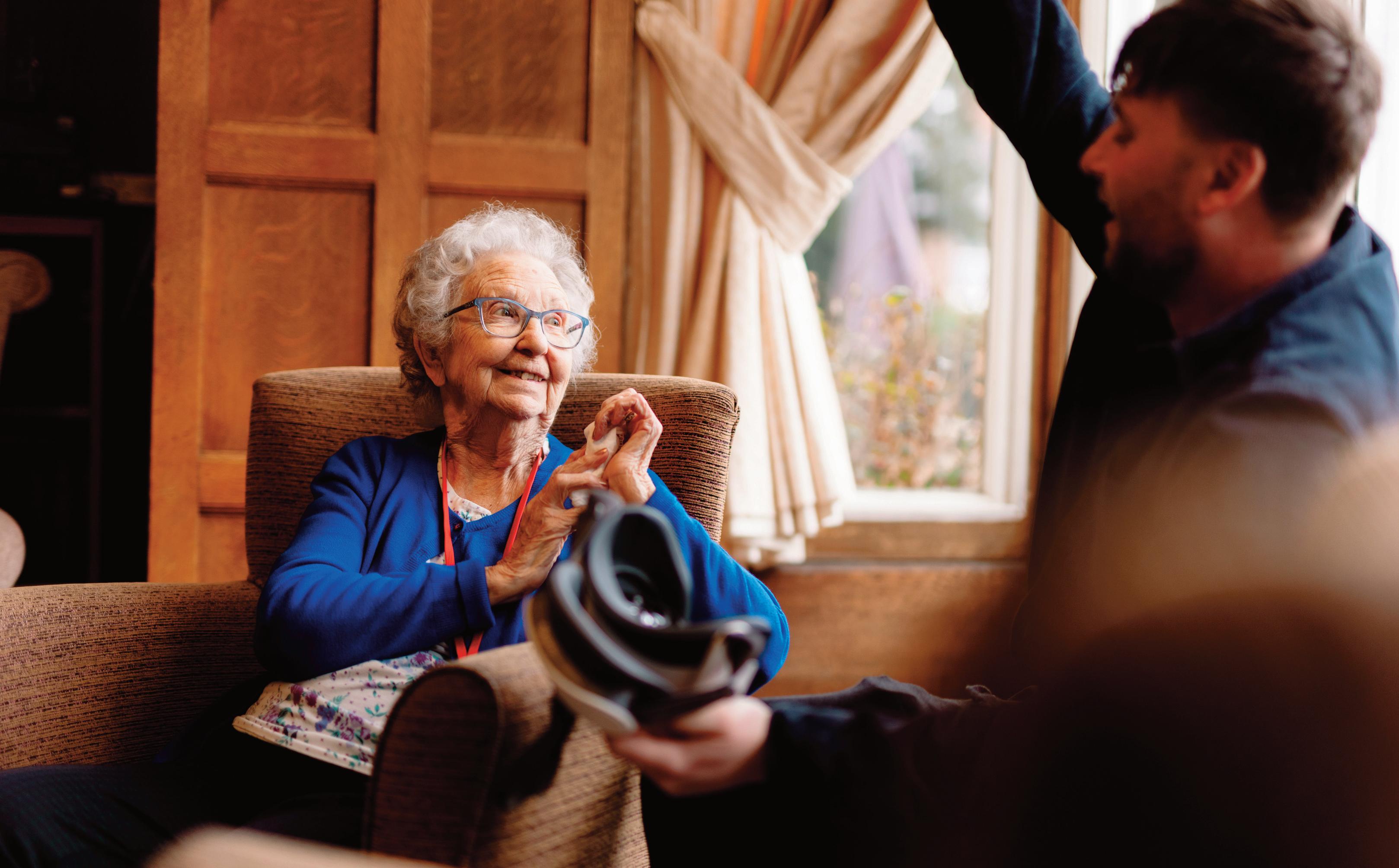

The inquiry has continued this week examining the impact of the pandemic on care services for elderly and disabled people.
Healthcare professionals working in residential and nursing care settings during the pandemic experienced significant moral distress and encountered severe staffing shortages that compromised care quality, according to testimony heard by the COVID-19 inquiry.
Reverend Charlotte Hudd, a registered nurse who worked at a care home during the pandemic, provided compelling testimony about her experiences during this challenging period. The inquiry heard how she was forced to move into the care home indefinitely where she worked, becoming the sole remaining nurse after five colleagues tested positive for COVID-19.
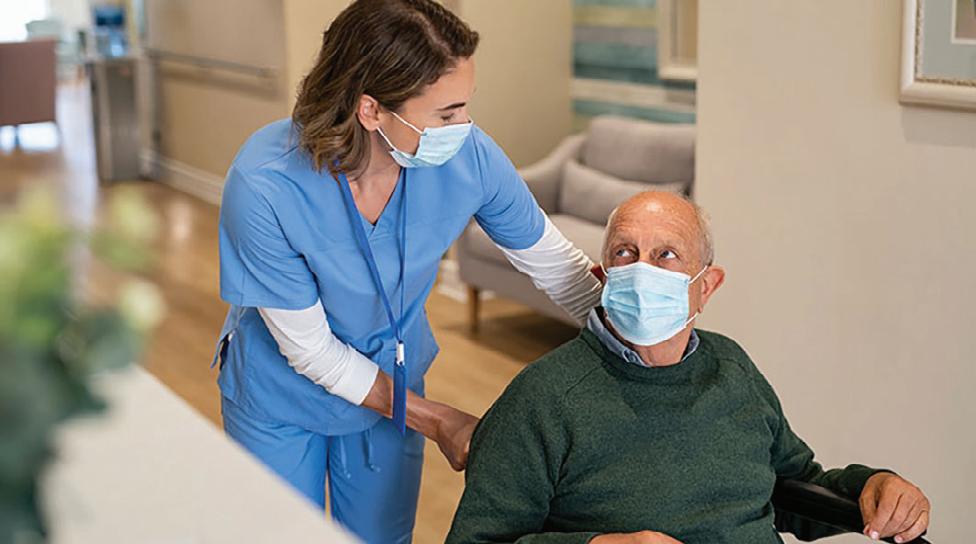
For ten consecutive days, she was responsible for approximately 20 residents with complex care needs, working entirely alone. She described the mounting pressure, stating that each time she attempted to reorganise staff schedules, the situation deteriorated further as more team members became unavailable. The realisation that she was the only qualified nurse left created an atmosphere of overwhelming responsibility and fear.
The emotional toll was severe. Working through the night at 3am, she felt compelled to write down her final wishes and a “do not attempt cardiopulmonary resuscitation” instruction on a card, recognising that if she became ill or incapacitated, there would be no one available to provide assistance.
LONG-TERM HEALTH CONSEQUENCES
The registered nurse and ordained minister now lives with post-traumatic stress disorder (PTSD) and long COVID as a result of her pandemic experiences. She worked continuously around the clock to maintain care standards but was ultimately forced to leave her position in June 2021 due to the severe impact on her physical and mental wellbeing.
SAFEGUARDING CONCERNS AND RESOURCE SHORTAGES
Reverand Hudd spoke candidly about the moral distress she experienced during the staffing crisis. She took the unprecedented step of raising a safeguarding alert concerning her own situation, recognising that the circumstances created genuine risks to resident welfare. She explained that with insufficient staff, there was potential for harm through omission – delays in continence care, repositioning, nutrition, medication administration, and other essential aspects of quality care.
Working as a single person with numerous responsibilities, she acknowledged the increased risk of medication errors and felt compelled to formally declare that neglect was occurring due to circumstances beyond her control – a decision she found particularly distressing. The inquiry also heard about critical shortages of personal protective equipment (PPE). Care home staff were forced to create makeshift protective gowns from bed sheets and store their limited supply of masks in freezer bags between shifts to enable reuse. As Charlotte explained, they had to improvise with whatever resources were available.
Module 6 of the COVID-19 Inquiry opened in December 2023, with public hearings scheduled from Monday 30 June until Thursday 31 July 2025. The module specifically investigates how government decision-making affected those living and working in care settings during the pandemic.
RCN Barrister Gerry Boyle KC delivered opening remarks on Monday, emphasising that nursing should be recognised as a valuable profession requiring investment rather than being viewed as a cost burden. He highlighted workplace capacity issues, staff shortages, the disparity in treatment between social care and NHS settings, and the broader impact on nursing professionals.
Addressing the pandemic’s consequences, he noted that many healthcare workers lost their lives simply by reporting to work, while others lost their careers due to mental health impacts. Many continue to struggle with long COVID effects that have compromised their ability to work and serve the public – consequences that must be prevented in future crises.
Former Health Secretary Matt Hancock also appeared before the inquiry this week, defending the controversial decision to discharge hospital patients into care homes during the early pandemic period as the “least worst decision” at the time. In his testimony, Hancock defended the decision – which was later ruled illegal in a high court judgment – to move hospital patients into care homes during the early weeks of the pandemic to free up space.
The inquiry continues to examine the complex decisions made during the pandemic and their lasting impact on the care sector, with testimony from various stakeholders providing crucial insights into the challenges faced by those working in and receiving care during this unprecedented period.
The residents at Elm Bank care home in Kettering stepped back in time with a delightful afternoon at the Blitz Tea Room and Jazz Lounge in Kettering.
The sun was out and that called for an afternoon filled with nostalgia and joy, as residents visited the Blitz Tea Rooms and Jazz Lounge in Kettering. The much anticipated trip provided a wonderful change of scenery and a chance to step back in time.
Upon arrival the residents were met with the warmest of welcomes from the friendly staff, who went above and beyond to ensure everyone was comfortable, the unique and magical surroundings and the décor which was reminiscent of the bygone era sparked conversations and shared memories among the residents, creating a truly immersive experi-
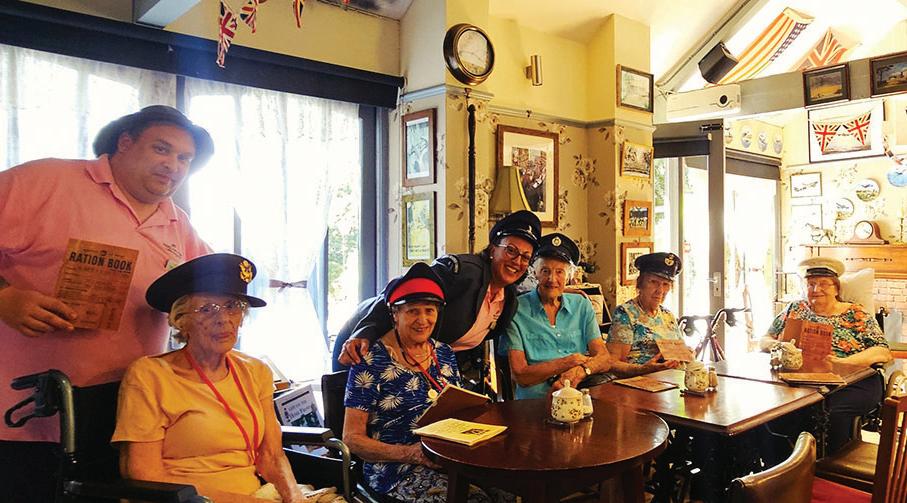

ence.
Tina, Activities Co-ordinator said, “This tea room really is a magical little gem, the culinary offerings are impressive as the ambience and we all savoured the delicious cakes, each bite a testament to the tea rooms quality. Outings like these are vital for well-being and engagement, providing an opportunity to socially interact and to hear the wonderful stories from the days of the ration books from our residents was amazing.”
Marvellous Bindura, General Manager said, “It is lovely to see our residents enjoying being out in the local community, The Blitz Tea Room and Jazz Lounge, is somewhere that our residents have truly enjoyed. Outings like these are a testament to Elm Bank’s commitment to provide rich and fulfilling lives to our residents.”

By Raf Hamaizia, Expert by Experience Lead, Cygnet Health Care

I am pleased that co-production has its own awareness week, but it should be more than just a diary date, it should be a mindset and a culture.
When I first entered services as a patient, decisions about my care were made ‘for’ me. Today, I am privileged to lead a nationwide network of Experts by Experience (EbEs) who support our service users and residents to make decisions *with* our clinicians and wider staff every single day.
That shift, from consultation to genuine collaboration, is what should be meant by co-production. It is the difference between services that simply treat symptoms and services that improve lives and enable people to hope for a brighter future.
WHY CO-PRODUCTION MATTERS NOW MORE THAN EVER
Co-production is vital in health and social care because it places the voices of those with lived experience at the heart of service design and delivery. When we collaborate as equals, we create more responsive, compassionate and effective care.
It builds trusts, empowers individuals, and leads to better outcomes because services are shaped by real insight rather than assumption. Importantly, I believe it leads to;
1. Better outcomes; Research shows that services designed with serviceuser insight achieve higher engagement, lower restrictive practice and faster stepdown.
2. Equity and voice; Co-production rebalances power, ensuring historically marginalised groups shape the care they receive.
3. Efficiency; When the people who use a service help design it, we get it right first time. Spaces are tailored to real needs and it helps to improve the overall patient experience.
4. Staff morale; Embedding co-production fosters a sense of shared purpose and collaboration, making staff also feel valued and heard.
Positive change is shaped collectively, leading staff to have greater job satisfaction and pride in their work.
A YEAR OF ACTION AND ACHIEVEMENT
Over the last 12 months we have further embedded co-production into the fabric of our daily lives at Cygnet. Here are some highlights; 1. Social Hubs – co-designed spaces, award winning impact
Together with service users we converted underused clinical spaces into over 30 vibrant social hubs around the country. These hubs feature arcade games, gaming consoles, sensory lighting, music areas, comfy seating, board games, aromatherapy, and sometimes even recording studios or coffee bars. They were born from direct service user feedback expressing the need for relaxing, homely places to unwind, far from the ward environment, and each hub is tailored to the preferences of its users, with wish lists, shopping trips, and one-day transformations involving everyone.
The results are widely praised: social hubs promote meaningful engagement, reduce isolation and incidents, foster peer and staff relationships, normalise the inpatient experience, and even enhance staff morale by enabling them to meaningfully connect in a therapeutic way.
Last month the project even won the Low Cost–High Impact award at the 2025 Design in Mental Health Awards which we were particularly proud of.
2. Experts by Experience shaping new hospitals
Last year we expanded our expert by experience programme across healthcare with the support of our CEO for health care, Stephen Firn OBE. We now work alongside more than 40 Experts by Experience nationally, who made more than 1,000 visits to our hospitals last year, ensuring service users are supported from peers at all stages in the planning and delivery of recovery pathways.
In particular, 2024 marked an exciting year of growth, dedication and innovation at Cygnet. We proudly opened four new hospitals in 2024 with more opening in 2025 .Every new build or refurbishment now has Expert by Experiences on the design panel. The £2.2million expansion of Cygnet Wallace Hospital is a recent example where our EbEs influenced everything from colour palettes to sensory lighting to wayfinding signage.
The physical environment plays a key role in how safe, respected and supported people feel. Thoughtful design influenced by those who have used services can reduce anxiety, promote recovery and create spaces that feel therapeutic and homely, rather than clinical.
3. Turning talk into collective learning - the Co-Production in Commissioning Conference
On May 1st 2025 we welcomed commissioners, service users, Experts by Experience, carers and clinicians to our inaugural Cygnet Co-Production in Commissioning Conference at VillaPark. The CPD-certified event, designed for commissioners, clinicians, and Experts by Experience, was attended by over 150 delegates and aimed to reshape how care services are developed through genuine co-production. We are doing some incredible things at Cygnet which demonstrate the value of co-production and I hope the conference inspired other health and social care leaders and organisations to commit to embedding its principles too.
4. Embedding the Patient & Carer Race Equality Framework (PCREF)
March saw the launch of our PCREF implementation programme, coled by EbEs and carer leads. The framework challenges us to hardwire racial equity into governance, training and outcome monitoring. To quote my colleague KaajalKotecha Chotai, “PCREF is about accountability; it’s about meaningful change.”
Service users and Experts by Experience are working alongside staff, carers, and community partners to identify where inequalities exist, and engage with communities, helping to build trust and foster genuine partnerships with local communities. We have hosted forums, listening events, and workshops to ensure their voices guide our approach.
5. Celebrating lived experience – national recognition
Eight Cygnet service user projects were finalists at the 2024 National Lived Experience Awards, with two taking home category wins. Seeing people who once felt unheard now collecting national trophies is the clearest evidence that coproduction changes lives and we are looking forward to celebrating more powerful stories at the 2025 awards.
THE DIFFERENCE YOU CAN FEEL
When I ask people who use our services today, they describe practical changes - a calmer ward because their invaluable ideas are implemented; a discharge plan that starts on admission; and menus that respect cultural needs. But the real magic is less tangible: it is the sense of empowerment that comes when your ideas move from Post-it note to policy, culture and the built environment.
I often say that co-production is like flipping the light on in a dark room. Once you’ve seen care in this way, you can never go back to old power dynamics.
Whether you are a commissioner, clinician, family member or someone on your own recovery journey, I invite you to do one thing this week: Instead of “What is wrong?” ask “What could we build together?” The answers will surprise you, and they will change care for the better.
Thank you to every person with lived experience who has lent their voice to Cygnet this year. Our progress is yours.
The pobroll® is the invention of Pat O’Brien, a physiotherapist, Moving and Handling trainer, and Conflict Management tutor with over two decades of experience in care homes and nursing homes Care home managers often face challenges in delivering intimate care while balancing efficiency and managing costs, particularly when these essential tasks provoke behaviours that can be challenging to safely manage. Traditional methods—especially for bed-bound residents—often lead to lengthy processes and frequent linen changes, driving up costs and consuming valuable staff time. The pobroll® provides a transformative solution that supports dignified care, achieves significant cost savings, and reduces the need for additional staffing.
The pobroll® is an innovative bed-bathing wrap specifically designed to enhance comfort and dignity during personal washing for individuals who require in-bed care. Centred on the resident’s experience, it minimizes distress by providing sensory comfort. Crafted with two layers of high-quality cotton-terry toweling and a waterproof layer in between, it delivers a soothing, calming experience while keeping the bed completely dry. Sized for a standard single bed, the pobroll®’s dual-layer design offers warmth and a sense of security and privacy, allowing residents to maintain comfort and dignity during bed-based bathing routines.
BOOSTING COST SAVINGS AND OPERATIONAL EFFICIENCY
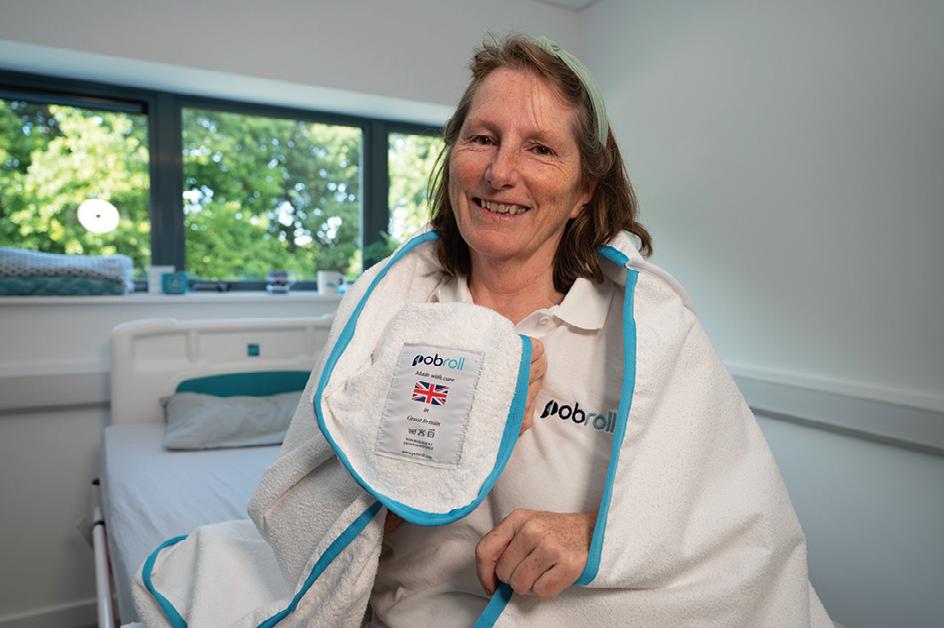
pobroll® provides an effective solution that supports both economic and environmental goals.
Managing resident agitation—particularly for those with dementia— often requires specialised training in restraint techniques. The pobroll® significantly reduces the need for physical intervention by providing a warm, secure covering that alleviates resident distress. This gentle approach minimizes aggressive or defensive reactions, reducing the number of staff needed for these interactions. As a result, facilities can potentially lower staffing levels without compromising care quality, yielding substantial cost savings.
Additionally, reduced dependence on physical intervention decreases training costs associated with restraint techniques. By simplifying the process of intimate care, the pobroll® reduces the need for specialised training, making onboarding smoother and lowering turnover-related training expenses.
The pobroll® supports compliance with restraint reduction guidelines, helping facilities minimise documentation burdens and regulatory liabilities linked to physical interventions. This non-invasive solution improves safety for both residents and caregivers, fostering a culture of dignity and respect that boosts satisfaction among residents and their families.
The pobroll®'s waterproof design enables caregivers to provide a complete wet wash without the risk of soaking the bed, minimising the need for frequent linen changes. This leads to fewer laundry loads, reducing labour and utility costs, as well as wear on linens. By reducing logistical tasks, caregivers have more time to focus on direct resident care, enhancing productivity overall. Additionally, reduced reliance on disposable wipes results in further cost savings and supports environmentally sustainable practices. With its durable, reusable design, the pobroll® maintains hygiene standards and allows for extended use across multiple residents. As care homes face increased pressure to adopt sustainable practices, the
CONCLUSION: A VALUABLE ASSET FOR QUALITY CARE AND COST MANAGEMENT
For care homes, the pobroll® represents a strategic investment, offering measurable savings by reducing reliance on disposable products, lowering laundry and training costs, and enabling efficient staffing. Most importantly, it prioritises resident dignity and comfort, setting a high standard for compassionate, person-centred care. For facilities seeking to enhance financial performance and care quality, the pobroll® is an invaluable addition to their resources. For further information, see the advert on page 5 or visit www.pobroll.co.uk
transformative value to individuals, communities, the NHS, and the national economy.
KEY GOVERNMENT
COMMITMENTS:
• A £3.7billion funding boost to local authorities

• £172million uplift to the Disabled Facilities Grant, enabling ~15,000 additional home adaptations
• Carer’s Allowance increased by £2,000
• Introduction of Fair Pay Agreement legislation for care workers
• Integration plans through the Better Care Fund, with £9billion allocated in 2025–26
Professor Martin Green OBE, Chief Executive of Care England, said: “We are pleased to see the government responding seriously to the Committee’s warnings. But pledges must turn into action. The cost of inaction is already mounting from unmet need and workforce strain to NHS pressures and fraying local authority budgets. It’s vital that the Casey Commission now proceeds with urgency, transparency, and ambition.”
WHAT CARE ENGLAND WILL BE WATCHING
CLOSELY:
• Transparency on unmet need – The Committee urged annual reporting on unmet social care needs; Care England will push for clear methodology and real-time data to underpin accountability.
• Independent impact assessments – Every policy affecting the workforce or funding must include rig-
orous cross-government assessments to guard against hidden costs or unintended consequences in the sector.
• Robust cost-of-inaction research – To make the economic case for reform, Care England argues the government must commission independent research into the true cost of the status quo across individuals, families, local councils, the NHS, providers, and wider society.
• A stable, professional workforce – Implementation of Fair Pay Agreements and career progression pathways must proceed swiftly to retain staff and lift care standards.
• NHS partnership via Casey Commission – Care England calls for the Commission (chaired by Baroness Casey) to prioritise alignment with the NHS’s 10-Year Health Plan and produce interim recommendations by mid 2026.
Professor Green continued: “Reform won’t happen overnight, but the time to act is now. Our sector is resilient, but only if properly funded, supported, and trusted. Care England stands ready to work with government, local authorities, the NHS, and the Casey Commission to turn commitments into real change for the people we support, the workforce, and the nation.”






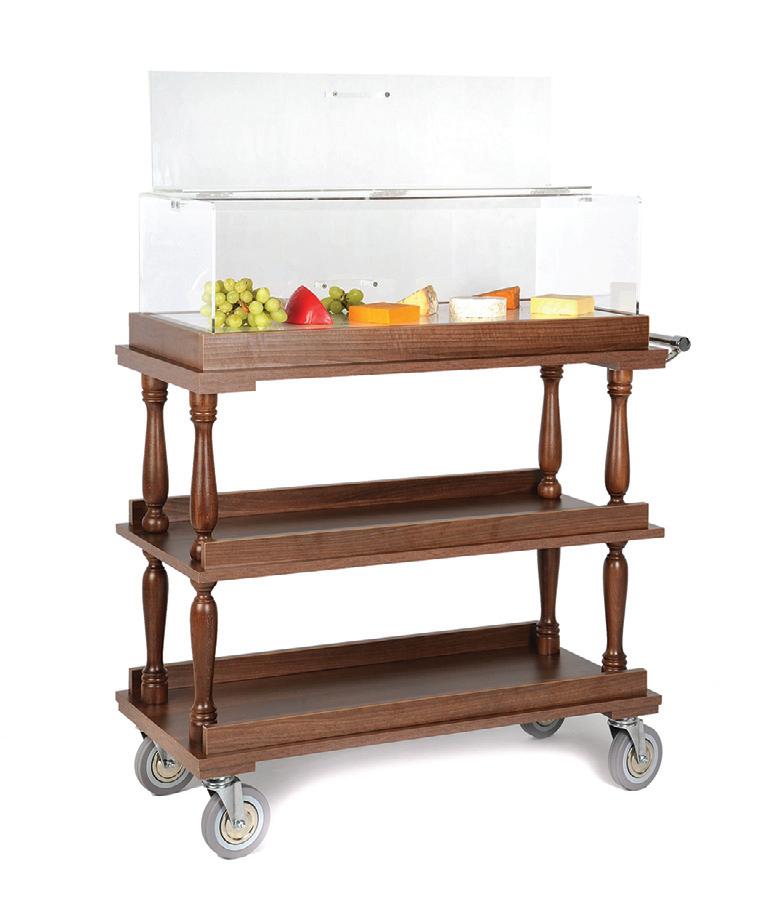
Councils across England could unleash £276 billion of untapped economic potential – equivalent to more than a 10th of national output – with government support to break down place-specific barriers to growth, according to new analysis.
Commissioned by the Local Government Association (LGA), the analysis strips out national, sectoral and regional trends to pinpoint genuinely local economic potential, identifying areas where local leaders, with properly resourced councils, could make a significant difference in tackling local economic challenges, unlocking local jobs and boosting business opportunities.
This is part of wider work by the LGA to highlight and profile the role of local government in delivering inclusive growth.

This analysis – produced by the Growth and Reform Network as the first part of a detailed investigation into the role of local government in supporting inclusive growth – is published as the LGA’s Annual Conference takes place in Liverpool, where thousands of councillors and officers working in local government come together for the sector’s biggest event of the year. The Growth and Reform Network consists of Metro Dynamics, the Future Governance Forum, and the Centre for Progressive Policy.
It shows that urban centres dominate with at least £234 billion share of the opportunity, according to the analysis,but rural areas also present untapped potential worth a minimum £42 billion, equivalent to nearly 10.7 per cent of the rural economy.
Meanwhile, non-devolved areas – those outside formal devolution deals or Priority Pathway areas – represent at least £77 billion in potential, equivalent to nearly 12.6 per cent of their local economic output. Whilethe Governmenthas proposed that Mayoral Combined Authorities hold responsibility for Local Growth Plans, councils around the country – whether they are a constituent council in a combined authority or not – have a unique and critical role to play in drivinglocal, inclusive economic growth.
The decision to focus investment in mayoral areas underlines the challenge for those areas yet to secure a devolution settlement. Councils across the country are keen to play their part in driving inclusive economic growth and all communities stand to benefit from new investment.
THE LGA IS CALLING FOR:
• Greater clarification on how the four new growth funds announced at the recent Spending Review will operate and the total resources available to support inclusive growth across England.
• Properly resourced councils so that they can provide key services creating economic conditions for growth (e.g. planning, transport), and address barriers to work, such as poor health and housing.
• Every area to receive funding to support local inclusive growth ambitions, with funding allocated through a transparent formula based around need rather than operating a competitive bidding process.
Long-term funding – it takes time to overcome challenges and deliver economic opportunities. Councils and the private sector need to have confidence that investment is secured for the longer-term.
All of local government to have funding and powers to plan a locally responsive employment and skills offer for their residents and employers, which is so critical to delivering inclusive growth.
Councillor Louise Gittins, Chair of the LGA, said: “Growth is a shared national, regional and local priority, which we all have a part to play in.
“Only councils have the detailed knowledge of their communities and business and are best placed to unlock economic potential and better jobs.”
“Councils can also break down barriers to inclusive growth, by using their frontline services to improve people’s health and wellbeing, as well as employing people in their own right and buying from their local places.”
“Mayoral Combined Authorities, while trusted to deliver, can only realise the full economic potential of their areas if their constituent councils are able to work in partnership and fire on all cylinders.”
“Nowhere should be held back in delivering for their communities.”
“Economic growth is the number-one mission of the Government. Providing sufficient funding is a very cost-effective way to ensure all councils, including those not in combined authority areas, can fully play their part in delivering local inclusive growth – driving up living standards and funding vital public services.”

In one of his first official engagements, the Mayor of St Helens, Cllr Severiano GomezAspron MBE, has visited The Waterside Care Home on Millfields in Eccleston.
Recently opened by Lovett Care, The Waterside is a bespoke, purpose-built, £12m luxury home offering outstanding residential, dementia, short-term respite and compassionate end-of-life care in a beautiful waterside setting.
Featuring 64 ensuite bedrooms, all furnished to an exceptionally high standard, and a host of thoughtfully designed high end facilities including beautifully designed lounges and dining rooms, a welcoming bistro serving coffees and homemade cakes, hair salon and reminiscence room, The Waterside has been designed to ensure quality of life in a luxurious and comfortable home-from-home environment.
Particularly perfect for those who enjoy being close to nature, it boasts a stunning lakeside setting with views across the lake from its gardens, terraces, dining rooms and lounges that enable residents to connect with the great outdoors whatever the weather.
Shortly after its official opening, Councillor Gomez-Aspron was invited to the home for a guided tour, to meet and chat to the Lovett team and some of the first residents and to understand more about the high quality care available at The Waterside.
He said: “It has been incredible to tour this new facility and to see first hand the level of expert knowl-
edge and attention to detail that has gone into developing this warm, welcoming and comfortable environment. I have been impressed with both the comfort and style of the home, the wonderful care team and the subtle incorporation of the very latest technology and it has been a joy to speak to some of the first residents who have clearly settled in well and are enjoying life to the fullest. The Waterside is a great asset to our community and I wish the team all the very best for the future.”
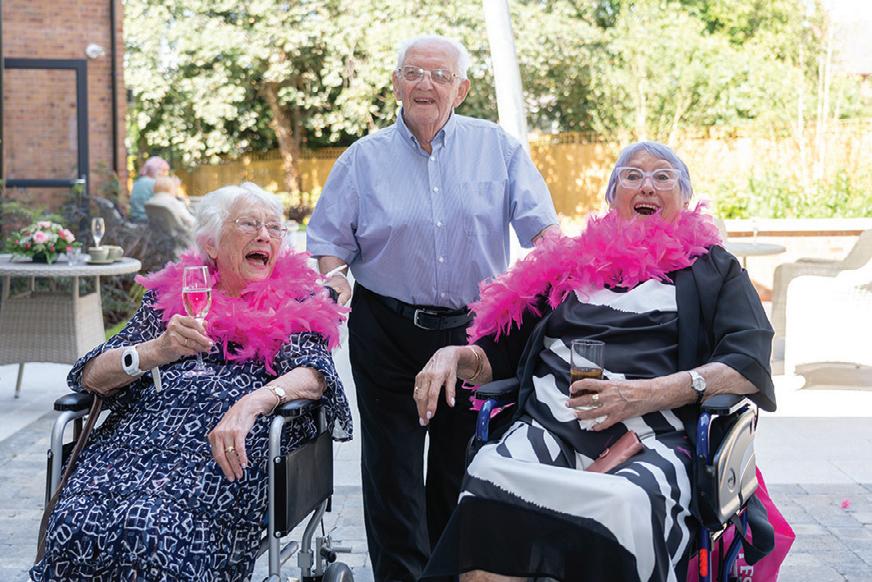
Enhancing the person-centred quality care delivered by the Lovett team is the latest in state-of-the-art technology including a fall prevention and silent nurse call system, electronic medication management and even a robot dining server (named Billy after the home’s first resident) that brings joy to all and adds a unique touch to everyday life.
General manager at The Waterside, Clare Richards, said: “We are hugely grateful to the Mayor for visiting us today and we are delighted to hear that he has been impressed with our facilities and the quality of our care. It has been our great pleasure to show him around.”
First resident Billy Brown’s wife Carol added: “We all really enjoyed chatting to the Mayor. He asked Billy how he was doing and if he was settling in well. Billy told him that he is comfortable and happy in his new home. Both Billy and the rest of our family have all been really well looked after by The Waterside family.”
As caterers across the UK care home catering sector continue to face significant challenges—ranging from rising costs and inflation to staff shortages, skill gaps, sustainability demands, and tightening legislation—Bidfood has launched a series of initiatives designed to support a more sustainable, efficient, and resilient catering environment. These initiatives were unveiled during an event focused on carbon management, warehouse operational technology, and sector-specific support. Research has shown that 27% of consumers believe the government is responsible for ensuring the sustainability of food and drink provided in institutional settings, while 32% place this responsibility on the venue and 16% on suppliers. This underscores the critical need for collaboration across the entire supply chain to improve sustainability within care home catering.

During Bidfood’s event, called ‘What’s Cooking at Bidfood?, the wholesaler revealed its plans to equip customers with the right tools and insights to make informed decisions around their carbon footprint, as well as the progress it's made working with climate intelligence company, CarbonCloud.
The event also emphasised the need to address issues of food waste and water usage within foodservice, with Bidfood’s Development Chefs and Sustainability Team announcing the launch of a new food waste recipe book, ‘Waste not, saves lots’, with 15 recipes and expert guidance to help customers cut costs and
utilise food waste.
The day also showcased steps the wholesaler has implemented to enhance the customer experience through technology. In partnership with software developers, CSD, Bidfood has created a host of bespoke software systems and a tracking tool to reduce stock waste, increase warehouse efficiency and fulfil more customer orders.
Bidfood has also improved its customer delivery notifications with ‘Smart Alerts’. Previously, customers could sign up for text or email alerts, informing them when a driver leaves a depot, with a link to a map to track them on their route. Now, customers will receive a notification when their delivery is next, and another when their order has arrived on site.
Tim Adams, Sales and Marketing Director at Bidfood, said: “As the catering sector navigates mounting pressures from sustainability demands to operational challenges, we believe the future lies in smarter, more collaborative solutions.
“Through initiatives like our carbon labelling project with CarbonCloud, cutting-edge warehouse tech with CSD, and our brand-new food waste recipe book, we’re empowering our customers to drive meaningful change, reduce waste, cut costs and build further resilience. Together, we can shape a more efficient future for the sector and be a positive force for change.”

We offer high-quality residential, nursing, dementia and respite care in a welcoming and engaging environment. Arrange a visit to discover comfort, companionship, and expert care. Find your


Pride Month has once again been a time of colour, reflection, and celebration—and the UK’s social care sector has proudly taken part. Throughout June, care and nursing homes across the country marked the month with a wide variety of activities, from rainbow-themed events and educational workshops to inclusive arts and crafts, parties, and heartfelt discussions with residents and staff. These celebrations have not only brought joy to many, but also reinforced the sector’s ongoing commitment to dignity, equality, and respect for all individuals, regardless of sexual orientation or gender identity.
This feature in The Carer highlights just some of the creative, thoughtful, and uplifting ways in which providers have honoured Pride Month. Many of the stories we’ve gathered showcase the incredible efforts
of care teams who went above and beyond to ensure residents felt seen, valued, and included. These initiatives reflect a growing awareness within the care community of the importance of recognising and celebrating LGBTQ+ identities—past and present—especially among older generations who may not have always had the opportunity to express their true selves.
We would like to extend our sincere thanks to all those who organised Pride events, created inclusive spaces, and shared their stories with us. Your contributions have helped shine a light on the power of community and the vital role social care continues to play in championing diversity and acceptance.
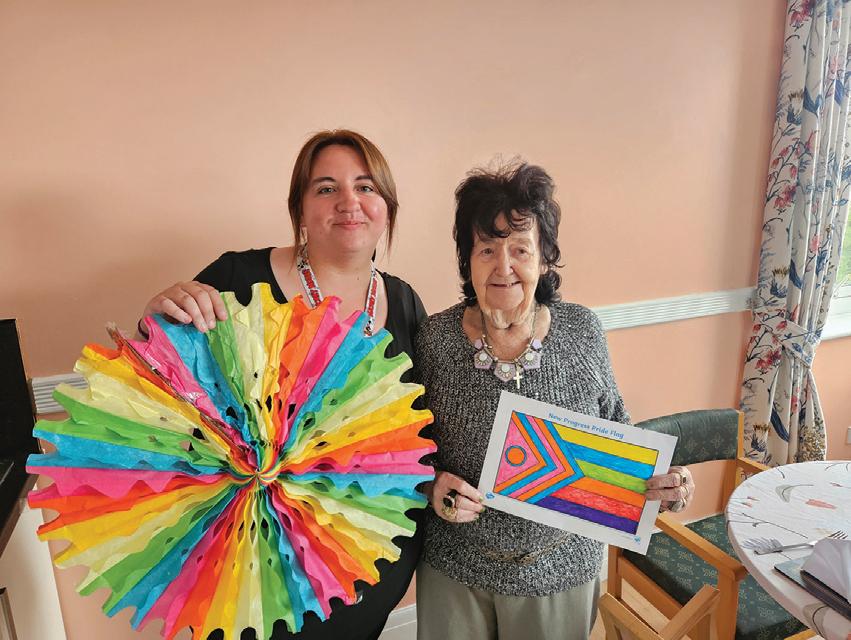
Residents and colleagues at HC-One’s Leighton Court Care Home in Wallasey, Merseyside, came together for a vibrant and meaningful celebration of Pride Month, honouring love, inclusivity, and the progress made toward equality for the LGBTQ+ community.
The morning was filled with joy, reflection, and creativity. Residents explored the lives and words of influential LGBTQ+ figures throughout history, sparking thoughtful conversation about the roots of Pride and its significance today. The home’s notice board was soon transformed with colourful rainbow and heart artwork created by residents, proudly displaying their support.
The celebration was brought to life with fantastic live music from Quinn Barnett, a dedicated Duke of Edinburgh volunteer, whose energetic performance had everyone

At Excelcare, the team believes in celebrating love, identity, and inclusion — and this Pride Month was certainly one to remember.
Throughout June, care homes across the group came alive with colour, laughter, music, and a strong sense of unity. People living in the homes, team members, families, and members of the local community all came together to take part in a wide variety of activities that honoured and celebrated Pride in all its forms.
The celebrations began with Pride-themed arts and crafts sessions. Participants created vibrant decorations, painted rainbows, and proudly displayed their artwork throughout the homes. These creative sessions were not only enjoyable but also encouraged meaningful conversations around self-expression and acceptance.
The warm weather provided the perfect backdrop for Pride picnics to be held in gardens, featuring music, rainbow-themed snacks, and plenty of sunshine. These gatherings offered a lovely opportunity for

singing and dancing. A highlight of the event was a rousing group rendition of “All You Need is Love,” filling the room with unity and joy.
To top off the celebration, residents enjoyed a vibrant rainbow fruit platter, reflecting the spirit of the Pride flag and symbolising the diversity and beauty of the community.
Sophie Teasdale, Wellbeing Coordinator at HC-One’s Leighton Court Care Home, shared:
“A wonderful celebration this morning! It was so lovely to see our residents engaging in meaningful discussions, expressing themselves through art and music, and embracing the values that Pride stands for. It was a morning filled with smiles, learning, and lots of love."
people to relax outdoors, enjoy delicious food, and connect in a joyful, inclusive setting.
A standout moment during the month was the arrival of drag queen models and singers, who brought glamour, uplifting music, and infectious energy into the homes. Their performances sparked smiles, applause, and singalongs, while LGBTQ+ flags were waved with pride in a true celebration of diversity and acceptance.


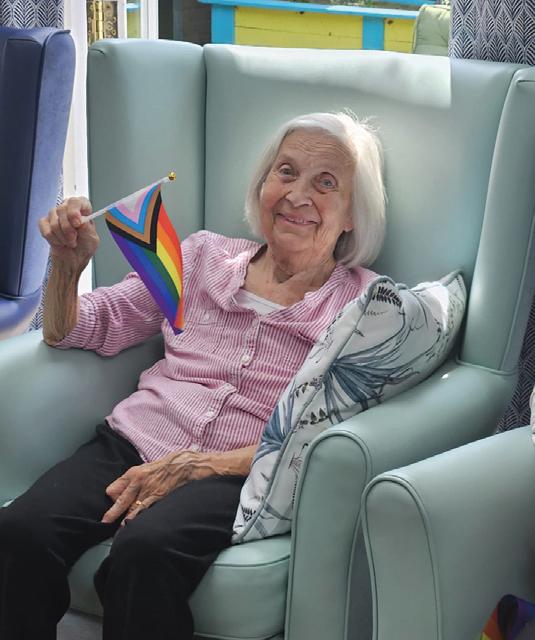
Pride Month served as a meaningful reminder of the value of community, the importance of learning from one another, and the ongoing commitment to fostering a culture of respect and dignity. It highlighted that every person — regardless of their background or identity — deserves to feel seen, heard, and appreciated.
Excelcare is proud to stand with the LGBTQ+ community during Pride Month and throughout the year.
Residents and staff members at RMBI Care Co. Home Connaught Court, in York, had a colourful week to mark Pride Month in June. The fun-filled celebrations kicked off in magnificent style with staff decorating the main areas around the Home in a range of colours to reflect the Pride rainbow theme. The kitchen team baked and decorated rainbow cupcakes, which went down a real treat during an afternoon themed tea party.
Residents and staff shared their stories and experiences, and participated in a learning session about the his-
tory of LGBTQIA+ rights, changes in society through time and today’s Pride. Everyone was fascinated to learn about the vibrant LGBTQIA+ scene in the city with The York Arms, which is believed to be one of the oldest gay pubs.
Taking part in the discussion, Clinical Nurse Manager Louise said: “Recognising the LGBTQIA+ community, their contributions and their ongoing fight for equality and acceptance is important. We are proud to create a safe space where all individuals feel welcomed and valued.”


Residents and colleagues at HC-One Wales’s Meadowlands Care Home in Aberdare, Rhondda Cynon Taf, came together in a joyful celebration of love, diversity, and inclusion with a vibrant Rainbow Party held in honour of Pride Month.
The home was transformed into a colourful haven as staff and residents dressed up in bright rainbow-themed outfits to mark the occasion. The atmosphere was filled with laughter, music, and plenty of cheer as everyone joined in the festivities with pride and unity at heart.
After an afternoon of fun, dancing, and lively conversation, party-
goers enjoyed a selection of sweet treats to round off the celebration, the perfect ending to a day filled with positivity and togetherness.
Home Manager at HC-One Wales’s Meadowlands Care Home, Terrie-Ann Thomas, said:
“Pride Month is an important time to celebrate everyone’s unique identity and the values of acceptance and respect. It was wonderful to see our community come together in such a colourful and uplifting way."
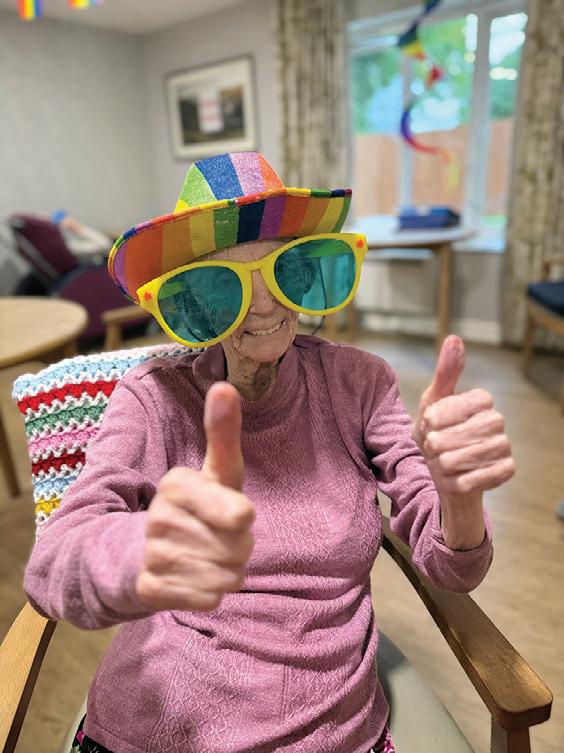

Fairway View Care Home in Bulwell, Nottingham, part of the HC-One family, kicked off Pride Month in fabulous style with a lively performance from the much-loved drag artist, the amazing Fanny Burns.
Bringing colour, laughter, and joy to residents, colleagues, and local guests, Fanny Burns returned to Fairway View to the delight of all who attended. Colleagues, the team from Nottinghamshire Fire & Rescue, residents and members of the local community attended the event, creating a vibrant and inclusive atmosphere filled with singing, dancing, and celebration.
Melanie Hayes, Home Manager at HCOne’s Fairway View Care Home, shared her excitement about the event stating:
“We wanted to celebrate Pride Month and diversity by welcoming back The Fanny Burns to Fairway. She was amazing as always; it is fantastic to see so many smiling faces. Fanny fills the home with laughter
and song, we absolutely love her to bits and cannot wait to see her again in December.”
Guests and residents were equally thrilled by the show with Maureen Duffy, a guest attending for the first time, saying:
“Fanny Burns was brilliant – my friends and I laughed from start to finish. We will definitely book a ticket when she’s back in December. I hadn’t been to Fairway View before, and everyone was so friendly and welcoming. It’s a beautiful home.”
Even long-time residents were treated to a memorable new experience. Joy Hoar, aged 88, resident at Fairway View Care Home, commented:

“Fanny Burns was wonderful. I’ve never seen a drag queen before, and at 88 years old, you don’t expect new experiences! It was such a great afternoon – I’m already looking forward to the next one.”
Elgar Court care home in Malvern, was bursting with PRIDE as they celebrated this annual LGBT event with residents, staff and the local community.
A delicious array of cocktails were made by a guest Cocktail Mixologist from Worcester for everyone to enjoy, as they were entertained by the live music throughout the afternoon.
Residents had prepared creative rainbows decorations to festoon their home to welcome in everyone, and the spectacular Malvern Ukulele band, provided the joyful toe tapping tunes and songs for all to sing along to and have a great time!

Sarah Cadwallader, Senior General Manager at the home, said: “Our residents love to experience and learn about the diversity offered by Pride, and this month has been perfect – it was so lovely to see the home decorated with rainbows, and join in with the inclusivity of Pride Month.”
Malvin Hobbs, Barchester's PRIDE Ambassador for the Company and Senior Care lead at Elgar Court said, “Thank you to the residents, staff and the entertaining Malvern Ukulele band, for making this afternoon such a success. I am so proud of the team that helped me put this together.”
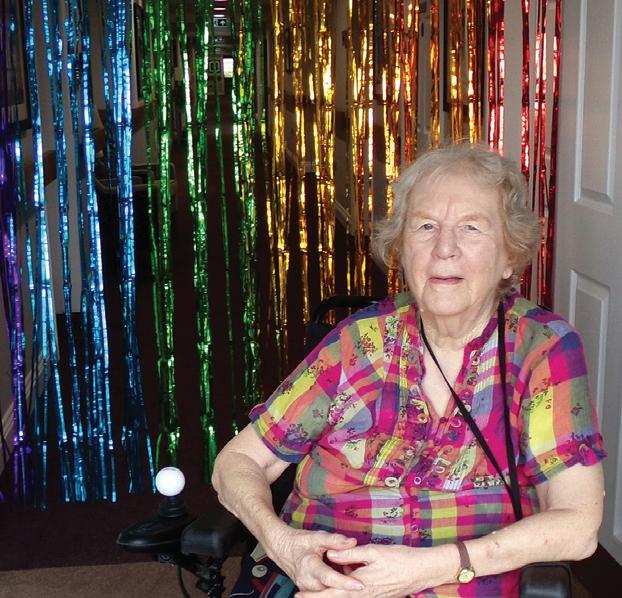
Trees Care Home
Rotherham came
with colour and celebration as residents, colleagues and family members gathered for a vibrant Pride garden party, complete with a dazzling performance from Sheffield’s very own drag sensation, Emma
Pride Month, celebrated each June, is a time for the LGBTQ+ community and allies to honour diversity, raise awareness of LGBTQ+ rights and promote inclusion - all values proudly embraced at Cherry Trees.

The home came alive with music, singing, laughter, and celebration as Emma wowed the crowd with a glittering performance that had residents and guests smiling, clapping, and dancing.
In the days leading up to the event, residents teamed up with colleagues to make vibrant banners, posters and rainbow bunting, transforming the home and garden into a colourful show of support for the LGBTQ+ community.
Lisa, Activities Coordinator, said: “Our residents were so excited to take part in Pride

Emma Maezin added: “I had an absolute blast meeting everyone at Cherry Trees – the atmosphere was electric! I truly adored performing for everyone.”
Sheila Hutton (88) , who lives at the home, said, “We’re very proud to be throwing this celebration. Love is love, and everyone, regardless of whether they are part of the LGBTQ+ community or not, deserves to be represented and live true to themselves.”
Sharon Whaley, Home Manager, said: “Seeing the Cherry Trees family come together to celebrate Pride was truly heartwarming. We can't thank Emma Mazin enough for coming to perform for us all – we had an absolute ball. It’s important to us that everyone at Cherry Trees feels seen, heard, represented and included. Events like this bring so much joy and reinforce the message that love and acceptance matter.” This was more than just a celebration. It was a joyful reminder that love, inclusion and self-expression have no age limit.

HC-One’s Fleming Court Care Home in Jesmond, Newcastle upon Tyne, Tyne and Wear, marked Pride Month in style, bringing residents, colleagues, and visitors together for a vibrant and heartwarming celebration of love, inclusion, and individuality.
Residents enjoyed a fabulous rainbow-themed party filled with music, dancing, and colourful flair. The event featured a dazzling performance by singer Chris Johns, who kept spirits high with a set of crowd-pleasing hits, made even more memorable by his rainbow waistcoat. The home was awash with colour as residents joined the festivities adorned in glitter wigs and vibrant flower garlands.

The Pride celebration also extended beyond the party itself. Fleming Court highlighted the importance of Pride in its weekly newsletter and themed art sessions, encouraging reflection and creativity around LGBTQ+ inclusion and identity.
Karen Stewart, Home Manager at HC-One’s Fleming Court Care Home said: "Wellbeing Coordinators Michelle Shotton and Jodi Spence created a wonderful celebration that truly captured the spirit of Pride. It was uplifting to see everyone come together with such joy and unity."

Frank Foster House Care Home, part of the Runwood Homes Group, proudly celebrated Pride Month, hosting a full day of celebrations on Tuesday 17th June which included activities and events dedicated to love, diversity, and inclusion.
The day began with a refreshing walk to the local park, where residents and staff enjoyed the sunshine, connected with the wider community, and embraced the values of equality and respect. The walk set a joyful tone for the celebrations, which continued back at the Frank Foster House with a colourful and uplifting Pride Party.
The highlight of the afternoon was a fantastic live performance by two of Frank Foster House’s very own, Brian from the laundry team and the ever-talented Sandra. Their music filled the home with laughter, dancing, and wonderful memories, capturing the spirit of Pride perfect-

ly.
Commenting on the event, Home Manager Nicolas said, “Pride is a beautiful reminder of the importance of respect, equality, and inclusion for everyone, including our LGBTQ+ residents, staff, families, and friends.”
The Pride celebration at Frank Foster House is part of a broader commitment to creating an inclusive, welcoming environment for all. From honouring the lived experiences of older LGBTQ+ residents to supporting LGBTQ+ staff and meeting care standards around person-centred inclusion, the day reflected the values that underpin daily life at the home.
Standout moments included the powerful community spirit, the sea of rainbow colours, and the shared message that everyone belongs. Frank Foster House is proud to stand for love, acceptance, and equality, this month and every month.
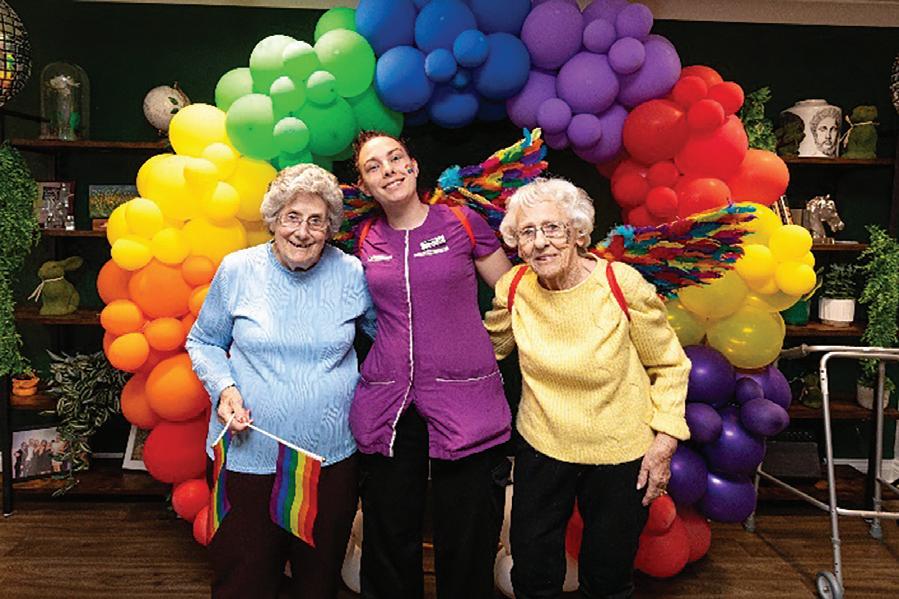
A Sutton Coldfield care home held a very special celebration to mark Birmingham Pride.
Care UK’s Bishop Manor, on Jockey Road, was transformed with rainbow flags and feather boas as residents welcomed drag artist Aunty Ginger for an afternoon filled with glamour, laughter, and music.
Residents took part in a variety of activities, including face painting, singing, and dancing, all designed to celebrate the spirit of inclusivity, love, diversity and community.
Aunty Ginger, said: “It was an absolute ball! I’m so impressed by all the team, families and residents that got so involved! The effort is second to none, and it’s one of my favourite gigs to return to. Can’t wait to be back!”
Thomas Bampfield, General Manager at Bishops Manor, said: “We had an absolute blast celebrating Pride
and flying the rainbow flag.
“At Bishops Manor, we’re dedicated to creating a warm, inclusive environment for everyone. Celebrating Pride is just one of the many ways we show our support for the LGBTQ+ community. We love to make residents feel like they can be themselves, and it’s a joyful reminder of the beauty of individuality.
“Pride month has a wonderful way of bringing people together, and it was fantastic to see residents enjoying themselves, laughing, singing, and celebrating. A huge thank you to Aunty Ginger, who the residents requested to come back to Bishops Manor sooner. She brought such brilliant energy and fun to the day –she really got the party started!”

Sanctuary Care’s not-for-profit Allanbank Care Home in Dumfries was bursting with colour as residents, staff and loved ones came together for a lively Pride celebration.
The event honoured the LGBTQ+ community and marked the end of Pride month, which was celebrated in so many of Sanctuary Care’s homes across England and Scotland. The day’s festivities included live cabaret music, fabulous rounds of comedy gameshow Blankety Blank, and a twist on traditional game shows with Mr & Mr and Mrs & Mrs, bringing out everyone’s competitive spirits.
Residents and the team dressed in their brightest clothes - from sparkly scarves to vibrant hats - while the home’s Chef, Sharon Marshall, created a dazzling spread of rainbow-themed cakes.
Care Home Manager, Sandra McNay, said of the celebrations: "Seeing everyone come together for a celebration of love and acceptance has been very special. Pride is about a sense of belonging, something which is so important here at Allanbank."

In celebration of Pride Month, residents and staff members at RMBI Care Co. Home Devonshire Court, in Oadby, Leicester welcomed Santana Rouge, a local drag performer that brought in a rainbow of joy and music. The Home was filled with old and new tunes, and everyone was treated to a Marilyn Monroe tribute act. The afternoon became a celebration of love and diversity with singing and dancing. Resident Rae commented: “What a voice! Santana sang ‘I want to be kissed by you’ which is one of my favourite songs. Her make-up and hair was stunning!”
Home Manager Juliet McNeilly, said: “It is wonderful to see our residents and staff celebrating Pride with such joy and acceptance. At Devonshire Court, we are committed to supporting diversity and tolerance for every member of our family; no matter who you are or who you love, you are most welcomed at our Home,”

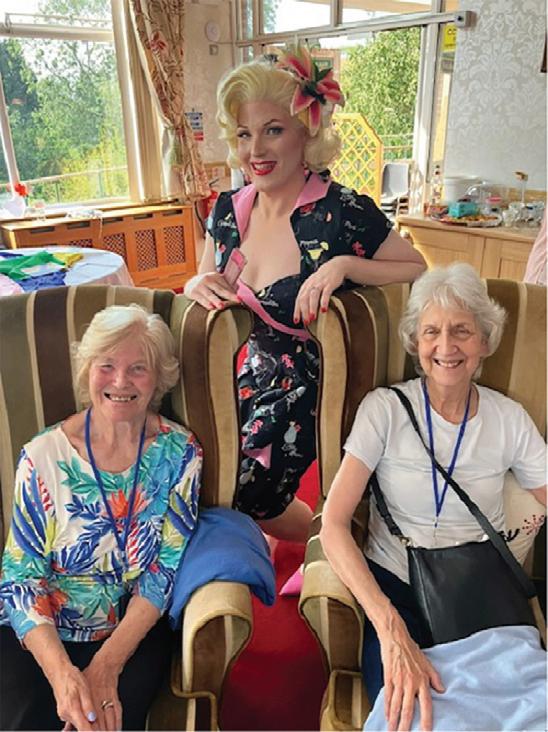



Milewood, a leading provider of living services for adults with intellectual disabilities, recently hosted its annual Pride event at the Malleable Club in Stockton-on-Tees.
Milewood has set the bar for inclusivity events with its annual pride event, dedicated to promoting diversity for all its residents and the LGBTQ+ community, making sure everyone feels seen and understood.
The Pride event was enjoyed by all who attended; around 200 people from Milewood homes across the country and individuals supported by other care providers in the area, celebrated the diversity within their community and forge new friendships. The event featured drag performances from local drag queen,
Monarchy and a variety of music from local DJ, Peter Clark, who both attended last year’s ‘Milewood’s Got Pride’ event.
Deputy Mayor of Stockton on Tees Cllr Bob Cook also popped in to meet guests and join in the fun.
Martyn Heginbotham, chief executive of Milewood said, “Events like Milewood’s Pride events are so important because they give everyone a space to be seen, heard, and celebrated. Our community is made stronger by the diversity within it, and we’re proud to create moments that reflect that. This day was full of joy, colour, and connection, and that’s exactly what we want our services to feel like every day.”
Like a couple walking hand in hand, June and Pride
Month have now become an item – and residents at RMBI Care Co. Home, in Hove, are aware of this.
To celebrate Silver Pride (essentially, Pride for people over 50), they welcomed Lovinia Belle, a local drag queen that brought in a rainbow of joy and music to residents and staff. Barford Court was filled with old and new tunes, and the event became a celebration of love and diversity with singing and dancing.
“This is fantastic; what a voice!” said resident Cecilia. “What great shoes; how colourful!” said Sylvia. “I love her earrings,” added resident Roy.
Home Manager Gavin Kingham joined in the afternoon extravaganza. Like many other staff members, he danced and sang with residents. “At Barford Court, we are committed to supporting diversity and tolerance for every member of our family; no matter who you are, you are most welcomed at our Home,” he says.

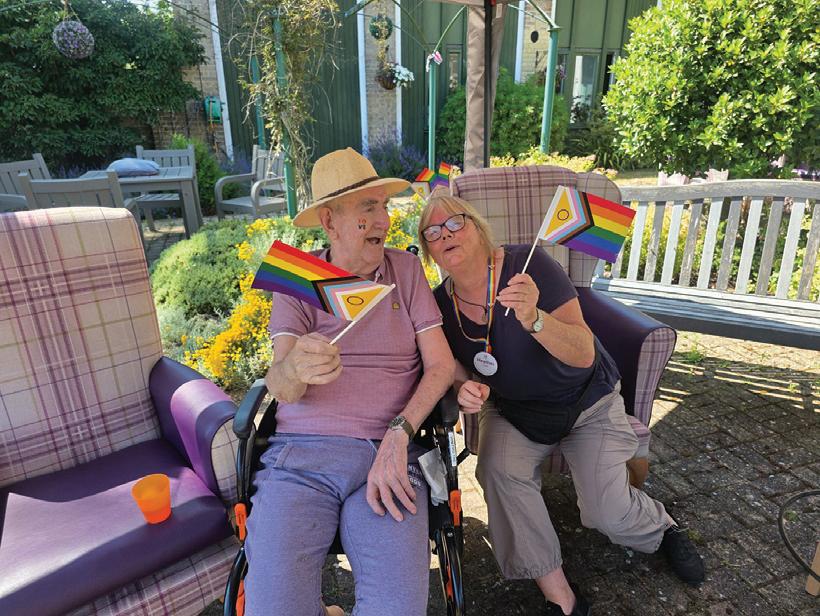
Residents and staff at RMBI Care Co. Home
Prince Edward Duke of Kent Court, in Braintree, embraced the spirit of Pride with a joyful garden party filled with colour, music and laughter. Under sunny skies, the highlight of the celebration was a fabulous performance by two glamorous drag queens, Sara Khasm and Sirena Hart, who delighted everyone with their singing, sparkle and warm presence.
Residents waved Pride flags and sang along to familiar tunes, with staff joining in to make it a truly inclusive and uplifting afternoon. A rainbow fruit salad and ice creams added to the summer atmosphere, while the Queens took time after the show
to chat with residents. Resident Bill was particularly taken with their glittery high heels, jokingly asking if he could borrow a pair, while resident Marion admired their makeup and shared how inspired she felt to try some new looks of her own.
“It was such a happy afternoon,” said Activities Coordinator Sophie. “It means a lot to see our Home celebrating Pride with such joy and acceptance. Staff even commented on how proud they felt to work in an environment that embraces everyone.”
The Pride celebrations also included a special barbecue for residents and staff, bringing more opportunities to connect and celebrate love, identity and community.

Residents and staff members at RMBI Care Co. Home Queen Elizabeth Court, in Llandudno, had a colourful week to mark Pride Month in June.
The fun-filled celebrations kicked off in magnificent style with staff decorating the main areas around the Home in a range of colours to reflect the Pride rainbow theme.
Residents and staff shared their stories and experiences, and participated in a learning session about the history of LGBTQIA+ rights, changes in society through time and today’s Pride. Everyone was fascinated to learn about Gareth Thomas, a Welsh former professional rugby player who came out as gay in 2009 and has been a vocal advocate for LGBTQIA+

rights and HIV awareness. Staff also wore bright colours to show solidarity with the Pride community.
Taking part in the discussion, resident Maureen said: “As long as people are happy and treat each other with respect, that’s what matters most. We all need to live!”
Richard, one of the Activities Coordinators at Queen Elizabeth Court commented: “Celebrating Pride Month is important to make people aware. I dislike the idea of prejudice towards anyone, so it’s nice for us to be able to come together and create a safe space where people share our values and can live authentically.”

Residents and staff members at RMBI Care Co.
Home Prince Michael of Kent Court, in Watford, had a colourful week to mark Pride Month in June. The fun-filled celebrations kicked off in magnificent style with staff decorating the main areas around the Home in a range of colours to reflect the Pride rainbow theme.
Residents enjoyed a Pride themed lunch with an entertainer singing party classics. Everyone enjoyed rainbow ice cream served from the Home’s new ice cream machine, and the catering team baked and decorated colourful cupcakes and biscuits.
Residents and staff shared their stories and experiences, and participated in a learning session about the history of LGBTQIA+ rights, changes in society through time and today’s Pride. Everyone was fascinated to learn about notable individuals such as Sir Elton John who was the chairman of Watford Football Club in the 70’s and 80’s; and Peter Frank Ashman, a lawyer and activist whose work on human rights helped lead to the decriminalisation of homosexuality across Europe.
Beverley Roberts, Home Manager, said: “It was a fabulous afternoon and an enjoyable way to celebrate Pride involving both the residents and staff. It is important that everyone who comes in knows that they are welcome and that our Home is filled with love and acceptance.”
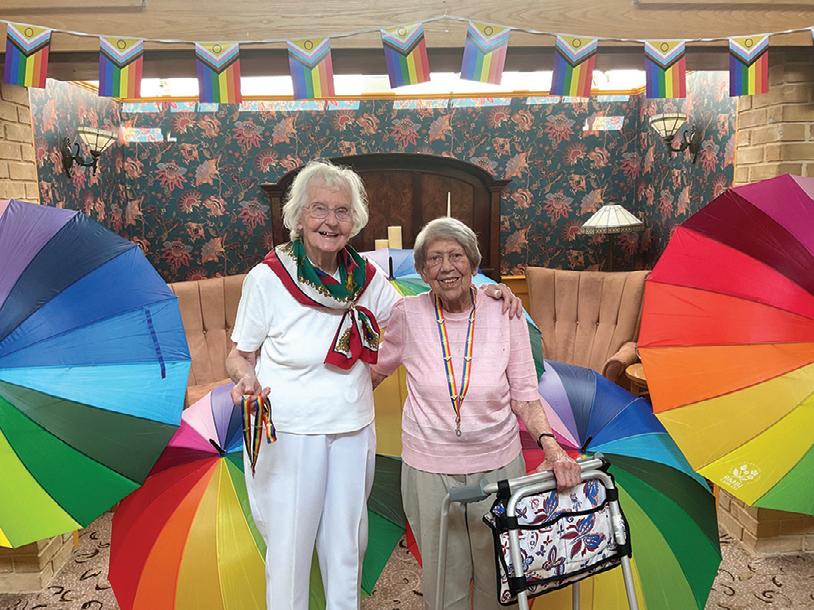
Thank you to everyone who shared heartfelt stories with The Carer from across the sector, celebrating love, identity, and community throughout Pride Month.


In a heartwarming display of intergenerational engagement, eight-year-old Spencer Whittenham from Burton has embarked on a unique mission: teaching older residents the joys of modern gaming.
This initiative highlights the benefits of activities between young and older people, and the crucial importance of keeping them connected in an increasingly digital world.
Spencer, a keen gamer himself and owner of global YouTube channel Spencer Arcade, noticed a gap in digital literacy and social interaction among some older members of his community and inspired to make a difference, he began volunteering his time at local community centres and care homes, offering personalised gaming lessons to seniors eager to learn.
From navigating virtual worlds in Roblox to mastering simple puzzles, Spencer patiently guides his new friends through the digital landscape, fostering a sense of achievement and fun.
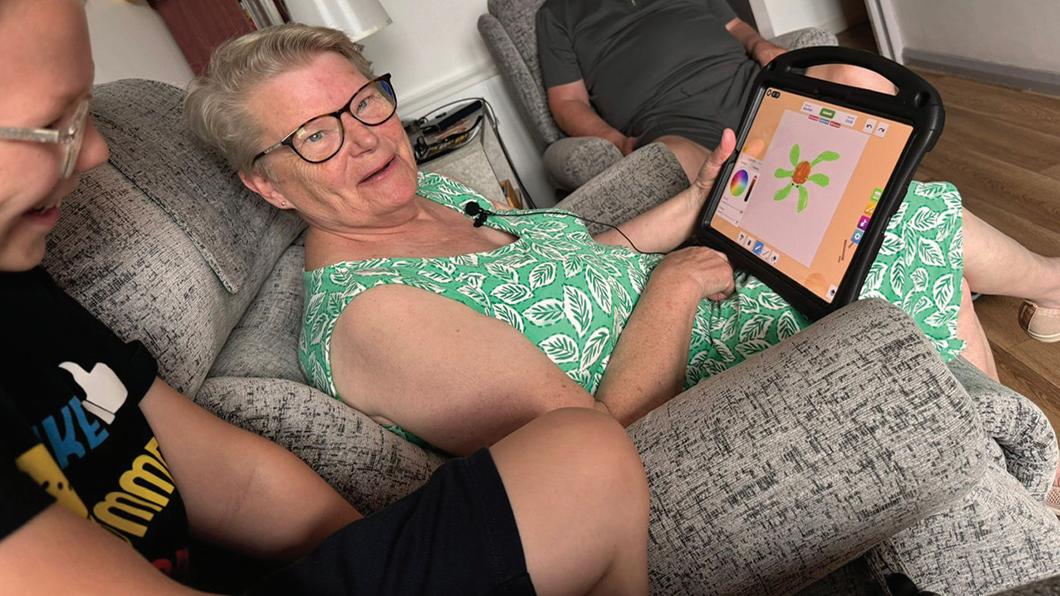
"It's really cool to see them laugh and get excited when they win a level," says Spencer. "Gaming isn't just for kids, it's for everyone and it's fun to teach."
The initiative has quickly gained traction, with participants reporting not only improved digital confidence but also a significant boost in mood and social interaction.
"I never thought I'd be playing video games at my age, but Spencer makes it easy and enjoyable," commented Ireene Bower, 78, a participant at Carlton Court retirement village in Burton. "It's wonderful to connect with the younger generation and learn something new. It really brightens my day."
"The importance of keeping older people is so important," said Spencer’s dad Jason. "Isolation can have serious impacts on health and happiness and I’m really proud that Spencer's own initiative is a brilliant example of how simple, creative ideas can make a huge difference in fostering vital connections.”
Junior catering team members from across Oakland Care have had the opportunity to showcase their talents in a competitive ‘cook off’ competition.
The contest, which was led and organised by Oakland Care’s Development Chef, Annika James, took place at the fully fitted training kitchen, Brakes Innovation Kitchen. It saw a group of budding chefs tasked with creating two courses which they felt could feature on the leading care home provider’s new menu which will be launch later this year.
The challenge followed a day of dedicated learning and culinary skill progression, which they were then able to take forward into the competition.

The day was hosted in partnership with Brakes Development Chef, Danny Silcock, who showcased a range of innovative and showstopping meals, as well as how easy it is to elevate simple dishes whilst also reducing wastage.
There were three winning dishes which were voted as the favourites by the judging panel, including the likes of a Pan-Fried Seabass with a Lemon Cream Sauce that was created by Louise Cockerill from Oakland Care’s Elmbrook Court care home in Wantage, Oxfordshire. Oakland Care’s ‘Chef Day’ was aimed at giving Chefs and Kitchen Assistants across the Oakland Care group a chance to develop and grow in their profession.
A family-run West Devon care home has joined the elite few UK social care settings to have adopted of the acclaimed ‘Butterfly Approach’ – establishing an exemplary dementia care culture where people can thrive.
West View Care Home, in Bere Alston, recently completed the significant 18-month transformation to provide a more personcentred care model and elevate its “excellent” offering even further.
Following rigorous monthly support with the team at the 28-bed home, along with those who live there, West View received accreditation in the prestigious Butterfly Approach from Meaningful Care Matters. The care and culture consultancy group specialise in focusing on the development of resilient, relationship-centred cultures of care shaped by the people living and working within them.
Key to their efforts is award-winning Executive Chef, Giles Conroy, who is focused on pushing Oakland Care’s culinary standards and supporting the progression of young, exciting, talent in the industry.
Reflecting on the day, Development Chef at Oakland Care, Annika James, said: “It was great to bring some of our junior team members together and to have the opportunity to spend some dedicated learning time with each of them.
“At Oakland Care we are committed to supporting the progression and growth of our team members. The Chef Academy is a key part of this strategy and represents a commitment to investing quality time into our chefs – helping to build their confidence, culinary knowledge, and skillset.”
“By doing this we are also able to maintain our promise to residents; providing an outstanding and positive dining experience.”
Speaking about the experience, Irene Muia from Oakland Care’s Woodland Grove care home, said:
“Thank you for an excellent day. The opportunity to learn, develop, and test my culinary skillset and knowledge was extremely valuable and is of huge credit to Oakland Care and their sustained commitment to supporting the progression of team members.”
“I am excited to take this experience forward with me in my role at Oakland Care, with a focus on continuing to grow not only my own ability but also pushing the high standards of catering we set ourselves as a team at the care home.”
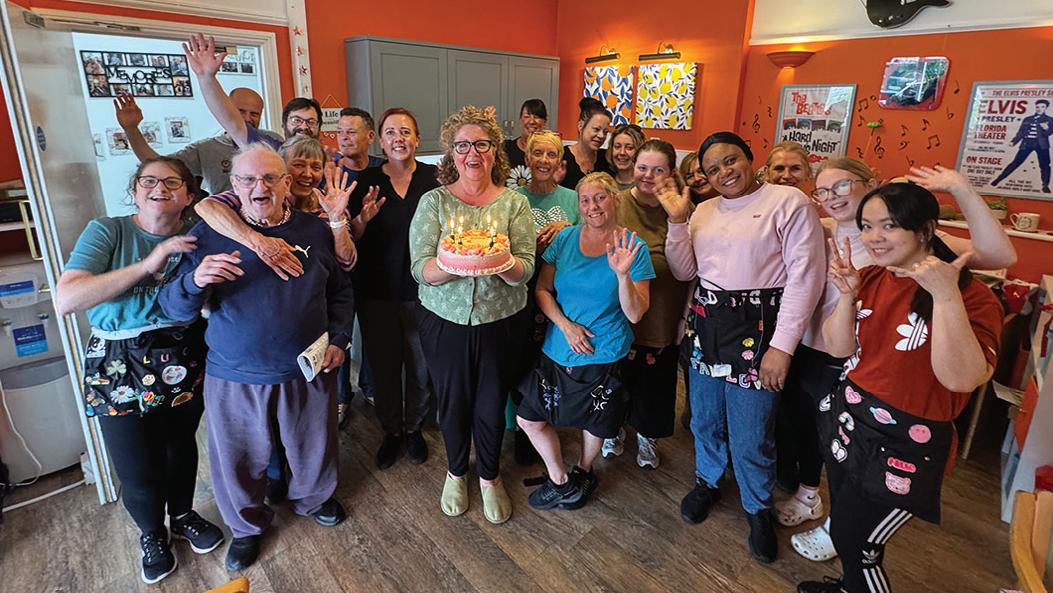
The Butterfly Approach has a meticulous focus on creating a culture where people are ‘free to be me’. It values emotional intelligence and the core belief that everyone has a unique story that has meaning and matters. It also encourages care providers to put the focus back on the people they care for and their emotions, by engaging in the reality of people’s lived experience in the ‘here and now’.
The transformation at West View included splitting the home into two separate living areas – Wren and Robin – where people with early-onset dementia or without dementia live together and people who experience more complex needs or later stage dementia live together. This fundamental change to a small household approach has enabled holistic care to flourish, where emotions-based care is balanced with clinical care best practice.
The home has also been decorated with vibrant colours and murals to bring warmth, with items of interest all around representing each individual and their life story – what Meaningful Care Matters calls the ‘stuff of life’, creating a family atmosphere.
Diane Kehoe, Manager at West View Care Home, said: “As a second-generation family-run business, we always aspire to create a stimulating, engaging and enjoyable environment – and the Butterfly Approach has provided us with the platform to offer that around the clock. I was already familiar with the approach
and saw the potential West View had in achieving it. The transformation was not easy, and we had a few challenges along the way, but the rewards upon completion have made it so worthwhile.
“We believed in the whole process from the outset and the staff embraced it – showing so much patience and kindness. They treat the residents like family, enjoying life together with lots of laughter and fun. When you step into the home now you can really sense the buzz of the place, and the level of care is both phenomenal and heartwarming.”
The overall findings from Meaningful Care Matters during a final audit last month identified the home as “excellent”, offering a highly engaged service that prioritises meaningful moments and where emotion-focused care is consistently seen, felt and heard in interactions with people. It also reported that individuality and self-expression are encouraged within the home, allowing people to freely be themselves.
Peter Bewert, Managing Director of Meaningful Care Matters, said:
“West View has transformed into a truly wonderful home. The team have clearly embraced the desire to change and have achieved amazing results, being guided and supported by Diane. They have also lifted their CQC rating from ‘Requires Improvement’ to ‘Good’ and are aiming over the course of the year to reach ‘Outstanding’. They have also been supported by the local service improvements team, who were so impressed at the transformation that they plan to use West View as a role model for other homes.”
Peter continued: “The journey has been incredible. From what we would call a ‘traditional’ care home, West View has come alive and now has a genuine feeling of family, togetherness, love and purpose for the people living there.”
The home aims to continue elevating its high standard of care, with ambitious plans to be acknowledged and approved by the National Dementia Care Accreditation Scheme. It also plans to achieve the ‘gold standard’ for end-of-life care by the Gold Standards Framework.
For more information on West View Care Home, please visit https://westviewcarehome.co.uk/.
For more information
Councils across England could unleash £276 billion of untapped economic potential – equivalent to more than a 10th of national output – with government support to break down place-specific barriers to growth, according to new analysis.
Commissioned by the Local Government Association (LGA), the analysis strips out national, sectoral and regional trends to pinpoint genuinely local economic potential, identifying areas where local leaders, with properly resourced councils, could make a significant difference in tackling local economic challenges, unlocking local jobs and boosting business opportunities.
This is part of wider work by the LGA to highlight and profile the role of local government in delivering inclusive growth.
This analysis – produced by the Growth and Reform Network as the first part of a detailed investigation into the role of local government in supporting inclusive growth – is published as the LGA’s Annual Conference takes place in Liverpool, where thousands of councillors and officers working in local government come together for the sector’s biggest event of the year. The Growth and Reform Network consists of Metro Dynamics, the Future Governance Forum, and the Centre for Progressive Policy.
It shows that urban centres dominate with at least £234 billion share of the opportunity, according to the analysis,but rural areas also present untapped potential worth a minimum £42 billion, equivalent to nearly 10.7 per cent of the rural economy.
Meanwhile, non-devolved areas – those outside formal devolution deals or Priority Pathway areas – represent at least £77 billion in potential, equivalent to nearly 12.6 per cent of their local economic output.
Whilethe Governmenthas proposed that Mayoral Combined Authorities hold responsibility for Local Growth Plans, councils around the country – whether they are a constituent council in a combined authority or not – have a unique and critical role to play in drivinglocal, inclusive economic growth.
The decision to focus investment in mayoral areas underlines the challenge for those areas yet to secure a devolution settlement. Councils across the country are keen to play their part in driving inclusive economic growth and all communities stand to benefit from new investment.
• Greater clarification on how the four new growth funds announced at the recent Spending Review will operate and the total resources available to support inclusive growth across England.
• Properly resourced councils so that they can provide key services creating economic conditions for growth (e.g. planning, transport), and address barriers to work, such as poor health and housing.
Every area to receive funding to support local inclusive growth ambitions, with funding allocated through a transparent formula based around need rather than operating a competitive bidding process.
Long-term funding – it takes time to overcome challenges and deliver economic opportunities. Councils and the private sector need to have confidence that investment is secured for the longer-term.
All of local government to have funding and powers to plan a locally responsive employment and skills offer for their residents and employers, which is so critical to delivering inclusive growth.
Councillor Louise Gittins, Chair of the LGA, said: “Growth is a shared national, regional and local priority, which we all have a part to play in.
“Only councils have the detailed knowledge of their communities and business and are best placed to unlock economic potential and better jobs.”
“Councils can also break down barriers to inclusive growth, by using their frontline services to improve people’s health and wellbeing, as well as employing people in their own right and buying from their local places.”
“Mayoral Combined Authorities, while trusted to deliver, can only realise the full economic potential of their areas if their constituent councils are able to work in partnership and fire on all cylinders.”
“Nowhere should be held back in delivering for their communities.”
“Economic growth is the number-one mission of the Government. Providing sufficient funding is a very cost-effective way to ensure all councils, including those not in combined authority areas, can fully play their part in delivering local inclusive growth – driving up living standards and funding vital public services.”
Staff and residents at Barchester’s Boroughbridge Manor care home in Boroughbridge had a fantastic time celebrating World Chocolate Day on July 7, surely one of the best days of the year!
Overseen by head chef Karen Garbutt, staff and residents enjoyed a selection of different chocolate treats from chocolate cupcakes, chocolate tarts and treats. The home wished to spread the chocolate joy and had the pleasure of delivering an assortment of chocolate goodies to their friends at the Dementia Forward Hub in Burton Leonard.
General Manager, Susan Carter, said: “It wasn’t just the residents that were excited when we found out there was a World Chocolate Day, the eyes of all our staff lit up too. We all had great fun discussing our favourite types of chocolate down the years, it’s amazing how many different chocolate bars and flavours there have been!”
Ethel, a resident said: “I have always loved anything to do with chocolate, I don’t think there are many people that don’t! I have eaten so much delicious chocolate today; I think this has to be one of my favourite celebrations.”


The Centre for Ageing Better is warning in a new briefing on accessible homes that progress on some accessibility features has been “frozen in time” with little progress made over more than a decade.
And while the proportion of homes with certain accessibility features has flatlined, demand is growing with rising numbers of Disabled people, declining healthy life expectancy and a growing ageing population.
The difference between the number of Disabled people in England and the number of fully accessible homes has grown by more than 2 million in just over a decade.
In 2009, there were 11.4 million Disabled people in England and just 900,000 fully accessible homes – leaving an accessibility gap between demand and supply of 10.5 million.

In 2022, the latest date for which figures are available, the number of Disabled people had increased to 16.1 million. And while the number of fully accessible homes had also increased – to 3.3 million – the accessibility gap has grown to 12.8 million –2.3 million higher than in 2009.
The North West has the highest accessibility gap with 1.63 million more Disabled people than fully accessible homes, closely followed by the West Midlands and Yorkshire and Humberside with 1.3 million.
The Centre for Ageing Better is calling on the government to use the Planning and Infrastructure Bill as a golden moment to stimulate the construction of more accessible homes to meet current and future need. The bill is currently working its way through Parliament and is now awaiting its second reading in the House of Lords.
Dr Carole Easton OBE, Chief Executive at the Centre for Ageing Better, said: “There is a huge unmet need for accessible homes with supply woefully failing to keep up with demand. For certain accessibility features, progress has been frozen in time for over a decade. The huge regional imbalances in availability of accessible homes shows what might be possible with best practice across the country.”
“The people we have spoken with tell us the frustration of living in inaccessible homes where they’ve never been upstairs or where they risk serious injury carrying out basic everyday acts in their home. They suffer the indignity of not being able to live independent lives and endure the frustration of not being able to move home because of the lack of options to move to.”
“People also tell us about the transformative nature of being in an accessible home that allows them to feel safe and live independently. This should be a right for all but so many people who would benefit from living in accessible homes are currently missing out because of a lack of supply. Now is a golden moment for the government to change that by incorporating requirements for accessible homes into the Planning Infrastructure Bill.”
The new briefing from the charity highlights how fewer than one in five homes (18%) have level access to
the front door – with this figure dropping even lower for people aged 75 and above (17%).
The proportion of homes with level access has only increased by one percentage point since 2009.
The proportion of homes with a toilet at entrance level in 2022 is 67%an increase of just one percentage point since 2018 and just six percentage points since 2009.
Progress on the inclusion of adaptions has similarly stalled over the past decade with the proportion of homes with a variety of life-changing accessibility adaptions not increasing since 2009.
This includes grab rails (7% of all homes), stairlifts (2%), ramps (2%), adapted bathrooms (7%) and adapted kitchens (3%).
The analysis by the Centre for Ageing Better reveals that unmet demand for accessible homes is even higher among older people.
The highest proportion of fully accessible homes is for people aged below 55 where around one in seven properties (15%) are fully accessible compared to one in ten (11%) for people aged 55-64 – despite the older age group having a higher level of disability.
This anomaly is likely to be because younger people are more likely to be living in flats, which are more likely to have been designed with accessibility in mind compared with older properties.
While delivery of homes with accessibility features flatlines, the Centre for Ageing Better is highlighting the growing need for accessible homes driven by demographic and health trends.
GROWTH IN DEMAND IS BEING DRIVEN BY:
• A rapidly ageing population – over 25% of the UK population will be aged 65 or over in 15 years time.
• A growing Disabled population – around one in five people in the UK have a disability, and with numbers steadily increasing.
• The striking decline in healthy life expectancy in England, with the proportion of life spent in good health the lowest it has been at any time since 2011/13.
Millie Brown, Deputy Director for Homes at the Centre for Ageing Better, said: “Building homes that are accessible and adaptable should be a key pillar of the government’s plan to build 1.5 million homes. With an ageing population, the number of people who will need accessible and adaptable homes is increasing and will continue to increase.”
“While there has been an increase in homes that are fully accessible, this has been driven by the increase of people aged 54 or below living in an accessible home, despite there being a greater need for accessible housing in older age groups.
“Accessible and adaptable homes are essential for a fair, safe and ageing society. We urgently need greater action to ensure that more accessible and adaptable homes are built.”
Care UK colleagues are celebrating after their important national campaign won a Silver Marketing Association award. Care UK’s ‘The Big Dementia Conversation’ took home ‘Best PR Campaign’ and was highly commended in two other categories, ‘Best Digital Marketing Campaign’ and ‘Best Multi-Channel Campaign’. Now in its second year, The Big Dementia Conversation aims to open up a nationwide dialogue about the condition and offers free resources for those seeking support. Joined each year by broadcaster and campaigner, Angela Rippon, Care UK’s teams, residents and relatives film case studies to debunk myths and offer support for

those navigating their dementia journey.
In addition to free resources on The Big Dementia Conversation webpage, more than 100 Care UK homes took part in free information events, engaging with their local communities to support the campaign. These events can be offered throughout the year and are a crucial means of advice and support to those who need it most. The Silver Marketing Association Awards recognise and celebrate companies that have delivered a successful marketing campaign targeted at the ‘silver’ demographic since January 2024. The winners for the 2025 awards were announced on Thursday 3 July.
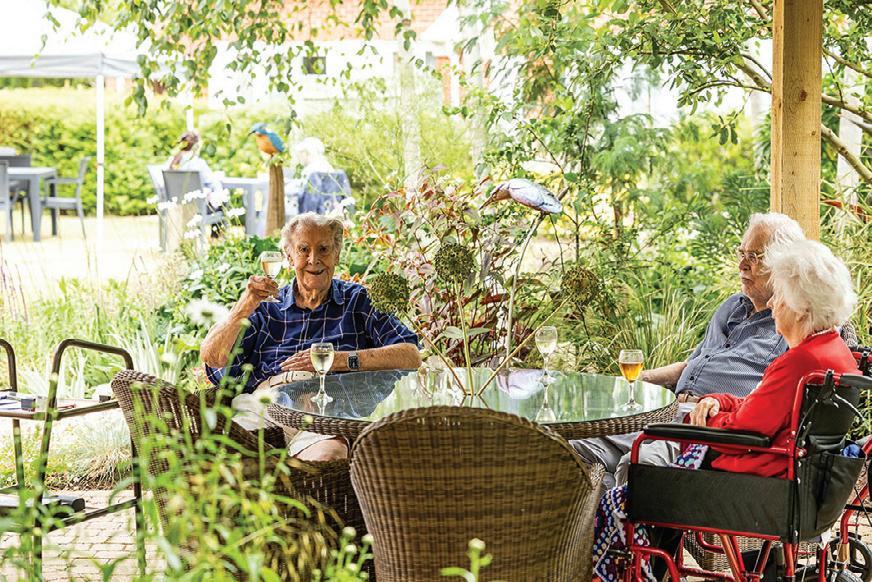
The opportunity to experience a beautiful
New Forest care home garden has raised nearly £1,000 for nursing and health
charities.Ninety-three community visitors spent time enjoying the grounds of Colten Care’s Kingfishers in New Milton when it opened to the public for a weekend under the National Garden Scheme (NGS).
On hand to welcome them were residents and pianists Mollie Speirs and Averil Meek who provided a soundtrack of classical and popular pieces including, appropriately for the garden theme, the tune Tulips From Amsterdam.
Guests enjoyed wandering through the grounds, taking in the warm and welcoming atmosphere and sampling refreshments.
A plant sale gave them the chance to discuss and take home favourite flora grown in the garden. Kingfishers resident Terry Brown said: “Our garden is looking great, beautiful. It was so nice to see the locals come in and enjoy it.”
Companionship Team Leader Rose Arcellana said: “We thank everyone who supported us and helped to make the weekend a success. To have raised £1,000 is a wonderful achievement.”
Kingfishers is one of three Colten Care homes that gained a listing in the NGS summer programme this year.
In its guide, the NGS describes the Kingfishers garden as ‘colourful and vibrant’ with winding paths to stroll to points of interest such as a lavender avenue, pergola, greenhouse and vegetable patch and, a recent addition, a fascinating water feature’.
The NGS says residents are involved in the garden with planning, propagating plants and building habitats for fauna.
The other Colten Care homes involved in the NGS this year are Brook View in West Moors and Woodpeckers in Brockenhurst.
Brook View will host visitors on the weekend of the 16th and 17th August. Its programme entry reads: ‘Our colourful and vibrant garden is spread over two main areas, one warm and sunny, the other cooler and shadier. There is a peaceful pond area, games lawn and mixed borders. Walking past our greenhouse leads to further gardens and raised beds, in a courtyard setting. Residents help out with the production of many of our plants, all expertly managed by our gardener’.

Woodpeckers is opening its garden on 30th and 31st August. On view will be dahlias, crocosmias and rudbeckias with the NGS explaining: ‘The courtyard area, small orchard and woodland all look particularly beautiful in late summer with views through to neighbouring fields of New Forest ponies and deer. Keep a lookout for the disguised bug house, and a wooden chainsaw sculpture’.
Andy Richards, Colten Care’s Landscape and Estates Manager, said: “NGS open days are lovely occasions when we show off our gardens and welcome members of our local communities to come along and enjoy time with us.
“Visitors often remark on how well we look after our plants and green spaces but as any keen gardener knows it doesn’t happen by magic. A great deal of hard graft goes in to establish and maintain a beautiful looking garden.”
Andy’s comments were echoed by Elaine Farrer, Colten Care’s Chief Operating Officer, who added: “It’s a testament to the attention to detail of our gardeners and residents’ gardening clubs that our green spaces are considered to be of ‘NGS quality’ and continue to go from strength to strength.”

Two studies in Brain today found that retired professional rugby players had changes in their brains and raised levels of proteins in their blood that could increase the risk of developing dementia in later life.
Around half (45%) of dementia cases are linked to established health and lifestyle risk factors which we have some control over, including traumatic brain injury from contact sports like rugby.
People who play contact sports like rugby are more prone to having head impact and injuries.
Traumatic brain injury happens when a head injury disrupts how the brain normally functions. It can range from concussion to more severe cases resulting in coma and in some cases death.
If nobody experienced a severe head injury, there’d be three fewer cases of dementia for every 100 people who develop it now.
Scientists at Imperial College London studied 200 retired rugby players aged 30 to 61 years old.

To estimate their history of traumatic brain injuries, players were asked about their career length, position and the number of concussions they recall experiencing.
Information on the players was compared with 33 people with no experience of rugby or history of head injuries.
All the participants underwent brain scans and blood tests for a protein called p-tau217, which indicates the presence of dementia-related changes in the brain. They also had tests of their memory and thinking abilities to check for any signs of dementia.

Although none of the former rugby players developed young-onset dementia during the study, they did show changes known to be linked to dementia.
Many of the former players had less brain tissue in areas that play important roles in thinking and memory.
They also had higher levels p-tau217 in their blood, indicating a higher future risk of Alzheimer’s disease – the most common cause of dementia.
Despite these biological changes, the retired players showed no difference in memory and thinking abilities compared with people with no experience of rugby or head injuries.
Dr Jacqui Hanley, Head of Research at Alzheimer’s Research UK, explains more: “Not much is known about how traumatic brain injury causes long-term changes to the brain, so the findings from this latest research raise some interesting areas for further study.
As this study is running for four more years, it will be interesting to see what else it reveals and if the physical changes seen here will predict memory and thinking problems later in their lives.”
There are also key limitations to bear in mind, such as the reliance on self-reporting and interview to determine traumatic brain injury history.
Dr Hanley adds, “Deepening our understanding around traumatic brain injury could ultimately help lower dementia risk for professional sportspeople, but more research will be required for this. In the meantime, reducing traumatic brain injury in contact sports is critical to help prevent brain damage and minimise dementia risk for the players.”
On Saturday 28th June, residents of Rosedale Court Care Home, part of the Runwood Homes Group, came together with families, staff, and members of the local community for a truly memorable day, as the home hosted a Vintage Cars and Julie Jive Rock ’n’ Roll Day.
The event was organised by Louise, the Lifestyle Coordinator at Rosedale Court, who worked closely with the South East Essex Car Group and singer Julie Jive to bring an afternoon of nostalgia and joy to residents and their loved ones.
Guests were treated to a display of three beautiful classic cars — an Austin 7, a
Beetle, and a Ford Prefect — kindly showcased by local vintage car owners Ahmed, Colin, and Ruth. The stunning cars sparked conversations, stories, and fond memories among the residents.
Residents and families enjoyed delicious burgers and hot dogs, refreshing ice lollies, and drinks from the Rosedale Court Bar, while being entertained by the lively rock ’n’ roll performance from Julie Jive. Dancing, singing, and laughter filled the afternoon, making it a truly special occasion for all.
Gloria exclaimed “I love the cars; they are older than me!”
In care environments where hygiene and safety are paramount, Jangro’s Professional Nitrile disposable gloves (DG130) offer a dependable solution, meeting the rigorous demands of daily care tasks. Designed with caregivers in mind, these gloves provide a comfortable fit without compromising on protection.
Made from high-quality nitrile, these gloves are both powder and latexfree, making them an ideal choice for individuals with latex sensitivities. Nitrile technology provides an exceptionally soft and pliable material that conforms naturally to the shape of the hand. This flexibility reduces hand fatigue during prolonged use and extended wear, allowing caregivers to perform tasks with comfort and ease. Textured fingertips enhance grip, even when wet, ensuring precision during delicate procedures. Whether assisting with personal care, handling food, or performing cleaning duties, these gloves support a wide range of applications within care settings. They’re more than just protective, these gloves are fully compliant with EN455 standards for medical use and EN ISO 374-5 for protection against bacteria, fungi and viruses, underscoring their suitability for infec-
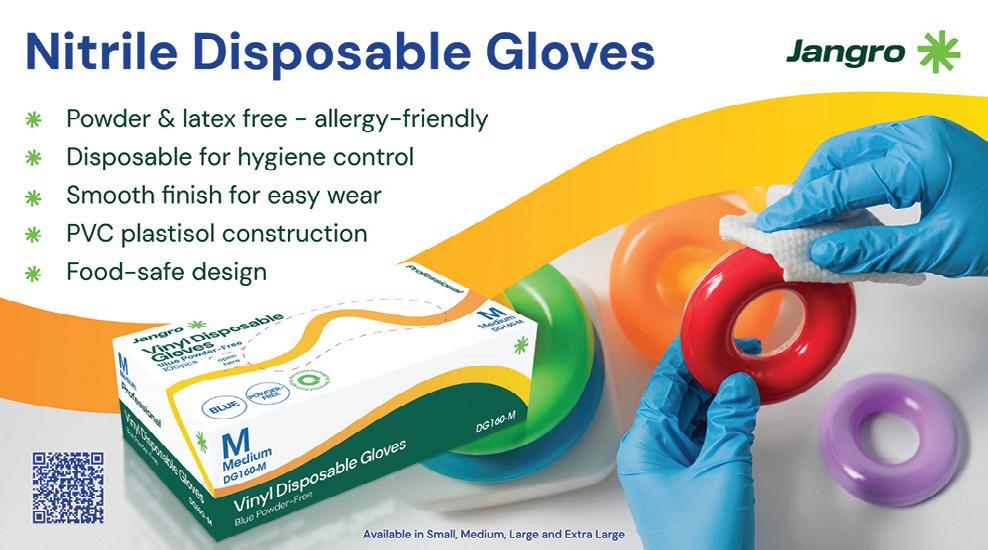
tion control protocols. They also comply with the Medical Devices Regulation (EU) 2017/745 Class I and are manufactured in accordance with the Personal Protective Equipment Regulation (EU) 2016/425. Plus, they’ve been tested for food safety compliance under Commission Regulation (EU) No 10/2011, meaning these gloves are as versatile as they are protective.
The design features, including ambidextrous fitting and ridged cuffs for easy removal and their vibrant blue colour to aid visibility, have been carefully considered to streamline workflow for busy care professionals.
At Jangro, we understand that the right protective equipment isn’t just about meeting standards, it’s about supporting the people who care for others every day. That is why our nitrile gloves are manufactured under stringent quality controls to meet the demands of healthcare environments, providing peace of mind for both staff and residents.
For more information or to view the full range of disposable gloves visit Jangro’s official website. www.jangro.net
Under the
a key space used to enrich the lives of residents living at Berry Hill Park.
The cadets threw themselves into the project with dedication and energy, erecting new garden furniture as part of a friendly ‘girls vs boys’ challenge, narrowly won by the girls. They also cleared an impressive 40 bags of brambles from the shrubbery, built a new bird bath and garden border, and added cheerful character by painting garden gnomes.

The visit concluded with a light-hearted football match between the cadets and care home colleagues, which brought laughter, smiles, and a few enthusiastic tackles!
Home Manager at HC-One’s Berry Hill Park Care Home, Tara Spencer, commented: “We were delighted to welcome the police cadets into Berry Hill Park. They worked incredibly hard and created something truly beautiful for our residents. Our residents and team thoroughly enjoyed the cadets’ visit, and we look forward to continuing this valuable partnership and community engagement.”
PC Charlotte Doherty from Nottinghamshire Police, added: “Both staff and residents at Berry Hill Park Care Home brought a smile to all our faces. It was an absolute pleasure for our police cadettes to work with them and to be able to give something back to the community. We will definitely be returning!”
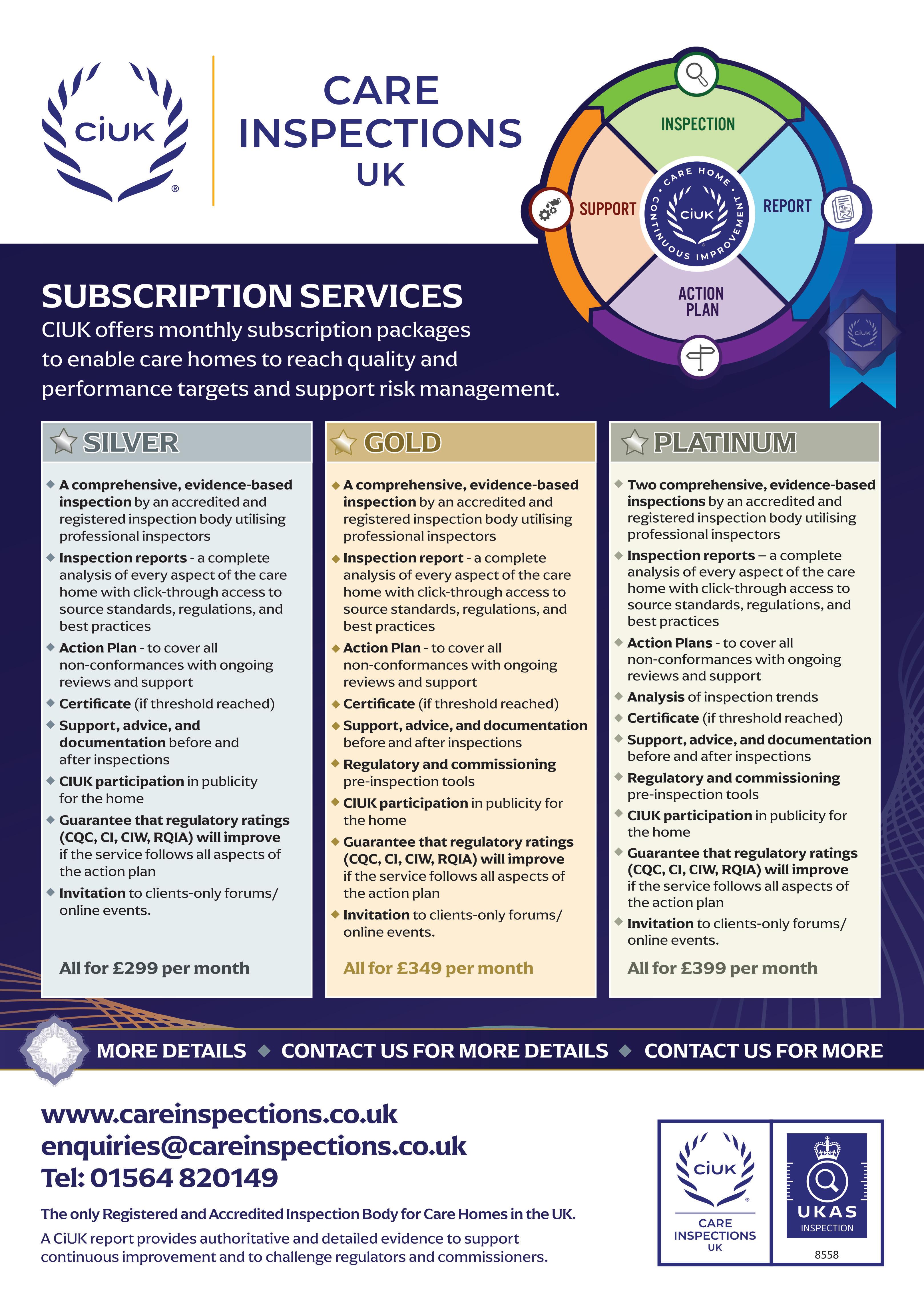
The owners of a care organisation have discovered that one of their homes once belonged to the family of film star Russell Crowe.
Mario Kreft MBE and his wife, Gill, the who run the Pendine Park care organisation, were researching the history of Hillbury House in Wrexham, North Wales, when they uncovered the link with the Gladiator icon.
They have now launched a search to find any long lost relatives of the Crowe family to help them mark a two important milestones.
It’s Pendine’s 40th anniversary this year while Hillbury is celebrating its 60th anniversary as a care home that was originally opened by the Catholic Order of the Sisters of Nazareth. It became part of the Pendine organisation in 2003.
The house itself, a red brick Victorian villa, was originally built in 1864 for a wealthy local businessman, John Bury.

Fast forward nearly a century and it was bought by Russell Crowe’s great uncle, Frank Crowe, who ran a successful fruit and veg company called Crofruit.
Mario and Gill found the link with the Crowe family when they were studying the deeds for Hillbury while researching the history of the property for their anniversary celebrations.
The document signed by Frank Crowe on May 31, 1954, reveals he paid £6,000 for the property.
Mario said: “We were amazed to find the connection Russell Crowe and did a bit of research.
“It seems Russell’s great grandparents, Fred and Kezia, emigrated to Canada in June 1925 along with 12 of their 13 children.
“His grandfather, John, stayed behind to run Crofruit. He was also a member of Grove Park School’s water polo team. His older brother, Frank, returned from Canada in 1927 to help John run the business.
“It seems that John decided to emigrate himself, to New Zealand where he married and had two children, David and Alex, Russell’s father.
The family later moved to Australia when Russell was still a child.”
“However, Frank stayed put in Wrexham and had a family of his own and bought Hillbury in 1954.
“The Crowes lived there until 1965 when they sold Hillbury for £12,500 to the Sisters of Nazareth who established a care home there, with Frank more than doubling his money and making a tidy profit in the process.”
Gill Kreft added: “We knew that when Wrexham’s football club was taken over by a couple of other Hollywood stars, Ryan Reynolds and Rob McElhenney, Russell announced his connection with Wrexham on social media, saying that his family came from here.
“He’s clearly proud to be associated with Wrexham and rightly so, it’s a fantastic place and now it’s got a great football team again.
“If he’s ever back watching Wrexham at the Racecourse, we’ll try make sure he comes to visit his family’s home.
“We’re also hoping that some of the long lost Crowe relatives might get in touch so we can invite them to a special celebration at Hillbury.”
News of the Crowe connection has delighted Cindy Clutton, the manager of both Hillbury and Gwern Alyn next door which became Pendine’s first care home in 1985.
Cindy said: “It was a total surprise when I heard about the link with Russell Crowe because you never think that anybody that famous would be connected to Hillbury.
“It would be really nice if he could come and visit – we’d delighted if he came to Wrexham to retrace his family roots.
“He’d be more than welcome – we’d give him a cup of tea and a Welsh Cake.
“When he’s a bit older, and perhaps needs a bit of help, there’s always a warm Welsh welcome for him here.
“Wrexham has got a lot of stars these days thanks to Ryan Reynolds and Rob McElhenney taking over the football club but there’s nobody bigger than Russell.
A care home in Horsham has kept its fundraising efforts on the right track in support of cancer research.
The team at Care UK’s Skylark House, on St Mark’s Lane, set off on a 10-mile hike across the South Downs Way national trail to raise money for Cancer Research UK. In total they were able to collect £1,300.
The funds will go towards new and ongoing research into more than 200 types of cancer, with the aim of helping everyone live longer, healthier lives free from the fear of cancer. Care Keen to match the home’s efforts, Care UK donated an additional £1,000 through its match-funding scheme, taking the total from £1,210 to £2,300.
Shayani Jospeh Peter, Care Assistant at Skylark House, said: “I felt it was such a worthy cause, I just had to take part. I’ve never done anything like this before, so I felt proud of myself and the team for

what we achieved. It was great to spend the day with my colleagues raising funds. I can’t wait for next year!”
Dora Woloszyn, Home Manager at Skylark House, said: “We’re incredibly proud of the team who joined us on the walk. We are also deeply grateful to residents, their relatives and everyone in the community who came together to support such a wonderful cause.
“Cancer Research does such fantastic work for those living with and affected by cancer.
Here at Skylark House, we want to support our community in any way we can, and we know so many people are impacted by cancer. We wanted to contribute to the charity’s remarkable efforts, enabling more people in need to receive support.
“The generosity and enthusiasm of everyone at Skylark House in our fundraising efforts has been truly heartwarming, and we look forward to continuing to support the community.”
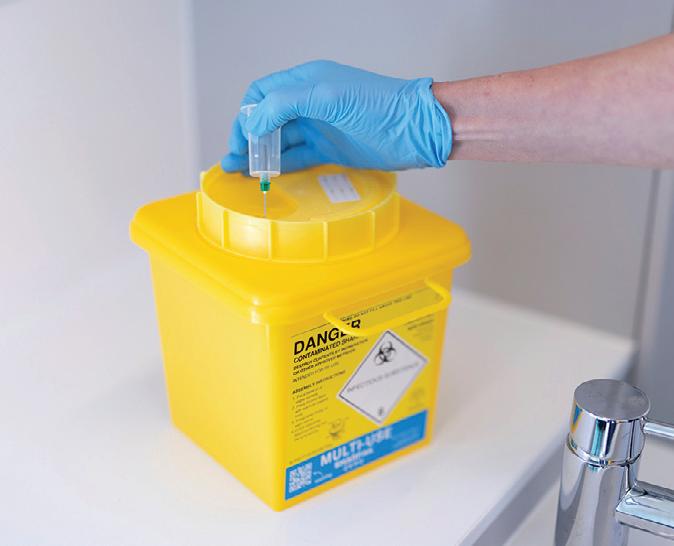
Sanaway, a leading clinical waste, sharps, and washroom hygiene service provider, has introduced new reusable and recyclable sharps containers as part of its auditable ‘Zero Waste to Landfill’ service commitment.
The initiative is part of Sanaway’s ongoing focus to reduce environmental impact for both the company, and its nursing and residential care home customers.
The new reusable recyclable sharps container enables one container to be reused 10 times before being recycled into new reusable sharps containers. The container’s VisiLOCK system optimises safety by eliminating the risk of content spills that may lead to cross-contamination or accidental needlestick injury.
The family-owned business operates across the South of England, servicing customers that demand a reliable, personal and high standard of service at a competitive price.
Co-founder and director, Patrick Martin says: “We are exceptionally proud of our environmental philosophy and commitment, which has been at the core of the company since day one.
“Providing the new reusable sharps service is now standard for all our customers, and at no extra cost. This not only demonstrates our dedication to help minimise the impact our industry has on the environment, but can also help customers achieve up to an 87% carbon saving. This being in line with the NHS’s targets for a 50% reduction in emissions by 2026.”
REDUCE, REUSE AND RECYCLE
Each sharps container has a VisiLOCK closing mechanism to ensure optimum user safety. Once full:
• The containers are collected by Sanaway delivered to the processing facility.
• A robot opens and photographs the contents before:
o Sharps are incinerated.
o Containers are sanitised and recovered.
• The sharps containers are thoroughly checked before being returned for reuse.
• Containers are tracked using barcode scanning to monitor their usage cycles, after 10 uses, the container is granulated and remanufactured into a new sharps container.
• This process is repeated 10 times, meaning the original plastic is reused 100 times.
• After completing 10 full cycles, the plastic is granulated again and repurposed into non-medical products, such as road traffic cones.
Sanaway’s Zero Waste to Landfill philosophy is a market leading standard, based on Energy from Waste (EFW) technology, which means it is a sustainable solution for both waste management and energy production. 99.995% of the process is recyclable and all the recyclable elements are removed before the incineration process leaving only 0.005% nonrecyclable.
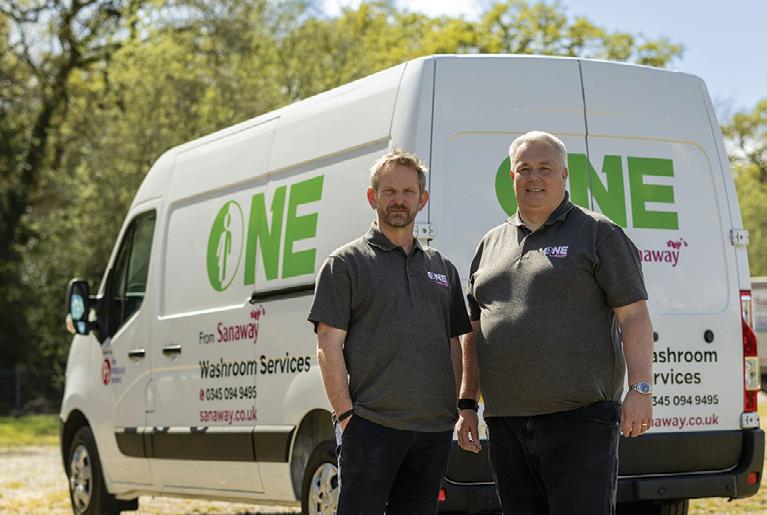
The company’s auditable Zero Waste to Landfill service diverts all of the 50 plus tonnes of waste the company collects from its customers every year from landfill, and contributes towards the power supply for more than 50,000 homes. The company’s ISO 9001 accreditation also gives the added peace of mind from a day to day management perspective, providing a benefit for nursing and residential care homes with ISO 14001 certification, enabling them to fulfil their continuous improvement requirements.
Commenting on the new service, Martin concludes: “We believe considered improvements like these to our customer first, high service standards are the main reason many of our clients have been with us for so many years, contributing to our enviable 95% customer retention rate and year

The Queen’s Institute of Community Nursing’s newly appointed Chief Executive marked her first day in post with a visit to a leading all-inclusive care group to launch a national initiative for adult social care nursing.
Berkley Care Group welcomed Steph Lawrence MBE, newly appointed Chief Executive of the Queen’s Institute of Community Nursing (QICN), to Jubilee House on Monday 1st July for her first official day in post. She was joined by Deborah Sturdy CBE, Chief Nurse for Adult Social Care at the Department of Health and Social Care (DHSC).
The visit coincided with the launch of a major new initiative, the Faculty of Adult Social Care Nursing, a national programme designed to strengthen the voice, visibility, and professional support available to nurses working across adult social care.
The new Faculty is the first of its kind in the UK, and aims to offer strategic leadership, specialist education, and professional advocacy to support nurses delivering person-centred care across care homes, domiciliary services, and community care.
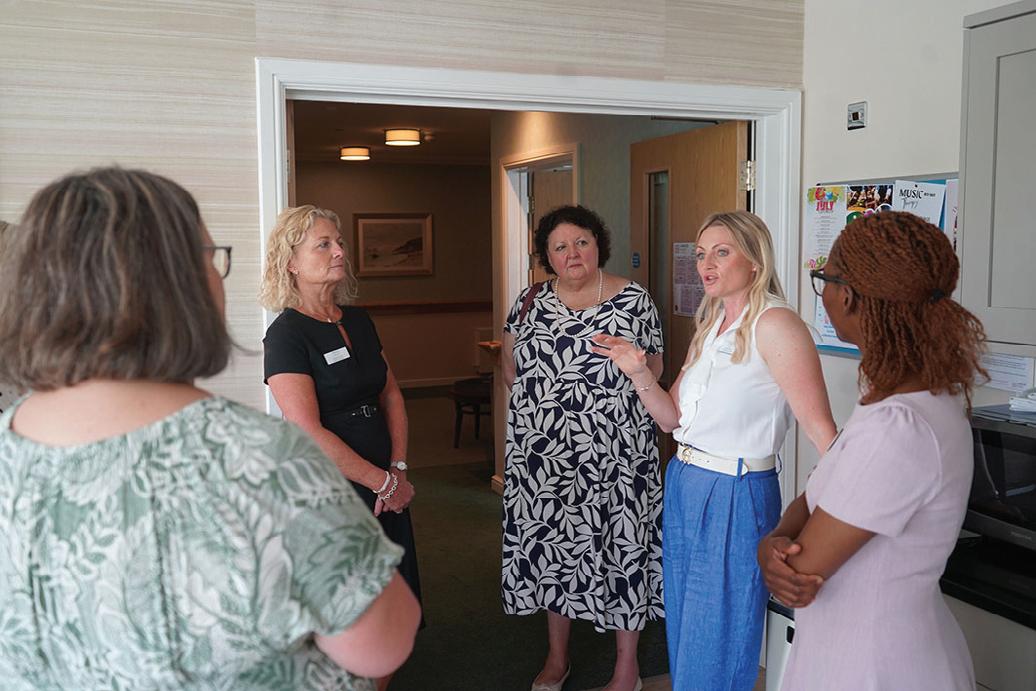
Deborah Sturdy CBE, who has long championed the development of adult social care nursing, said she was “delighted to join Steph Lawerence and QICN colleagues at the launch of the QICN Social Care Nursing Faculty at Jubilee Court Care Home”, adding that “this initiative provides an important recognition of the value and importance of the role of social care nursing within the community. The faculty will be a great place for the social care nursing community to come together and build its knowledge and skills and share
excellence in practice”.
Speaking during the visit, Steph Lawrence MBE, Chief Executive of the Queen’s Institute of Community Nursing, said: “I’m delighted to launch the new Faculty of Adult Social Care Nursing on my first day leading the QICN. The Faculty recognises the expertise and leadership of adult social care nurses who deliver care in diverse and often challenging environments.
“It will provide a much-needed platform to influence policy, research, and innovation in care and marks a major step forward in raising the profile of this essential workforce. It was a real pleasure to begin this journey at Jubilee House, where the passion and professionalism of the team truly reflects what we want this Faculty to stand for.”
Commenting on the visit, Masline Chitura, Quality Director at Berkley Care Group, said: “It was a real privilege to host Steph and Deborah at Jubilee House on such an important day for adult social care nursing. The launch of the new Faculty is a landmark moment, and we’re proud that our team could help bring it to life through the quality of care, professionalism, and passion they demonstrate every day.
“Visits like this are a chance to showcase the incredible work happening in our homes, but also to start meaningful conversations about how we continue to elevate nursing across the sector. We’re excited to see where this new collaboration with QICN can take us and proud that Berkley Care could play a part in such a forward-looking step for care.”
Say Goodbye to long lines, chasing down prescriptions or scrambling to find you medications in store!
At Automeds Pharmacy, we’re reshaping the way healthcare is delivered. Serving the South of England with over a decade of expertise, we’re proud to be a distance-selling pharmacy that is truly dedicated to the evolving needs of our patients alongside specialising in care home dispensing.

Whether you’re a care home looking for reliable medication management or are in need of hassle-free prescriptions, Automeds Pharmacy is here to streamline your experience. Our team is specially trained to provide bespoke, efficient medication solutions tailored to your needs.
We partner with a range of eMAR providers, offering flexibility and variety—because every patient deserves a solution that fits just right. From same-day deliveries to bulk dispensing for care homes, we ensure you get the medications you need, when you need them.
We understand that repeat prescription ordering can be a hassle. That’s why our experienced team takes the pressure off our care home staff by handling this process for them. No more wasting time hunting down prescriptions—just more time for what matters most: quality care for residents.
With a daily cut-off time Monday to Friday, urgent items are delivered the same day, so no one has to wait.
As Automeds Pharmacy continues to grow, our mission remains steadfast: to offer tailored medication solutions that make a real difference in the lives of our patients.
We’re not just a pharmacy—we’re a partner in your healthcare journey, and we’ll be with you every step of the way.
Enquire today for your bespoke package! 01305 230091 or wecare@automeds.co.uk or visit www.automeds.co.uk

The Salvation Army has announced it will transition from providing residential care for older people to grow its community-based support model.
Shifting focus from residential settings to community-based support will help reach deeper into communities and support more people who are isolated and vulnerable, particularly older people living in poverty.
The church and charity currently run 11 residential care homes across the UK and already has a large network of community support for older people.
Work is underway to actively explore transferring six care homes to alternative providers and there has already been positive industry interest. However, a formal consultation is due to begin on the possible closure of the remaining care homes. These are: Davidson House and Eagle Lodge in Edinburgh; Holt House in Manchester; The Hawthorns in Buxton and Dewdown House in Weston Super Mare.
Salvation Army Director of Older People’s Services Glenda Roberts said:
“Our residential care homes are places of great love and care, but they do not have the specialised clinical expertise required by an aging population who are increasingly developing more complex conditions. Our buildings would also require significant modernisation.
“Salvation Army Corps (community churches) already support thousands of older people every week and building on this community work will mean we can reach even deeper into communities to support many more vulnerable older people.
“Taking action now will allow us to reach more people in the future but we know how difficult residents and our staff will find this news. Our immediate focus is on our current residents, their loved ones and of course our staff while we make this change.
“We are doing everything we can to support all those affected by this process and have set up a dedicat-
ed team to provide support. There will be a formal consultation period with our care home staff who have worked hard to ensure our residents are always surrounded by love, friendship and support.
“Following the consultation, if a home does close, our focus will be to settle every single resident into new accommodation with the support of our partners. Community chaplains will also continue to work with residents to ensure a consistency of pastoral support.”
There is no formal timetable for the remaining six care homes, but work is underway to explore whether the homes could transition to alternative providers.
Glenda Roberts continued;
“There have been a number of societal changes over the last few years which make it increasingly difficult for our model of residential care to maintain the high standards our residents need.
“The biggest challenge is an aging society. Residents are joining us later in life which means they often have more complex needs. It would take many millions to change our staffing, governance and expertise to be able to offer the specialised nursing required and to adapt our buildings.
“Other care home providers are better placed to meet the complex and changing clinical needs of older people. Indeed, some have expressed an interest in continuing the work we have started with our residential older people care homes.
“Every week, around 3500 older people attend Salvation Army community activities ranging from lunch clubs to specialist dementia services and our plan is to substantially increase that vital support. By building on our community foundation, we can reach deeper into communities and support more vulnerable older people.”

TWO artists living at a Barnsley care home will display their work for the first time in an exhibition at the Town Hall this month.
Patricia Wroe, 89, and Peter Hardy, 76, will have their work unveiled at the Experience Barnsley Museum and Discovery Centre on 11th July.
Located within the Town Hall, Barnsley Mayor Cllr David Leech and local artist Charlotte Fairclough will officially open the display, which will then be open to the public.
The idea for the exhibition came from Rachael Addy, activities coordinator at Deangate Care Home, where both residents live.
Rachael contacted Barnsley Museums in the hope of boosting the residents’ confidence, as both had initially doubted their talents, saying: “Who would want to see our work? They’re not good enough.”
Rachael said: “It means so much to show everyone how talented these two individuals are. I want people to see past the fact they live in a care home. I want them to see they are two talented individuals in their own right and they have produced some stunning artwork regardless of age and circumstance.”
Both residents were born in Barnsley and have lived in the town all their lives. Patricia recalled entering a painting competition at the age of five, but didn’t return to art until her 80s.
Peter is a passionate photographer whose love for the craft began in childhood. He said: “My passion came from my father, sitting with him developing photos in the shed. There’s something special about capturing a moment that could mean something different to each person who sees it.”
Peter’s photographs, which include landscapes and portraits from across the UK, still decorate his bedroom walls. Patricia’s talent only came to light when she revealed a bag of artwork she had kept hidden under her bed.
She said: “They’re not brilliant. I’m not a professional. Why would anyone want to look at them?”

That moment inspired Rachael to reach out to Barnsley Museums. Community heritage curator Steven Skelley responded with enthusiasm, and artist Charlotte Fairclough was invited to view the work.
Charlotte has since visited Deangate and worked with both residents to select pieces for professional framing and display. She was moved by their stories and impressed by their individual flair.
The exhibition will be part of a pop-up display in the Town Hall this summer, celebrating creativity at any age.
Rachael added: “We don’t want to spoil the surprise. You’ll have to come and see which pieces were chosen for yourself.”
A care home in Standish has welcomed its first residents, marking another milestone for a unique care village in the North West.
Doreen Williams had the honour of being Langtree Care Home’s first resident when she arrived this week; she has now been joined by Elaine Morris and Albert Naylor.
The latest addition to the Millennium Care Group, a family-run and B Corpaccredited provider with over three decades of experience, Langtree is the company’s fifth home in the North West.
The 52-bed advanced dementia and nursing care home in Standish has joined two existing homes on Millennium Care’s Chorley Road site, Lakeside and Worthington Lake Care Home. Together, they create the Standish Care Village.
Doreen was a resident at Langtree’s sister home, Worthington Lake, for over two years. But, unfortunately, due to a change in care needs, the home could no longer provide the care she needed. The timely opening of Langtree aligned perfectly, giving Doreen a new home with the same values and ethos as Worthington in the same familiar location and setting, while Doreen’s move was well managed and supported by staff with whom she has strong relationships with.
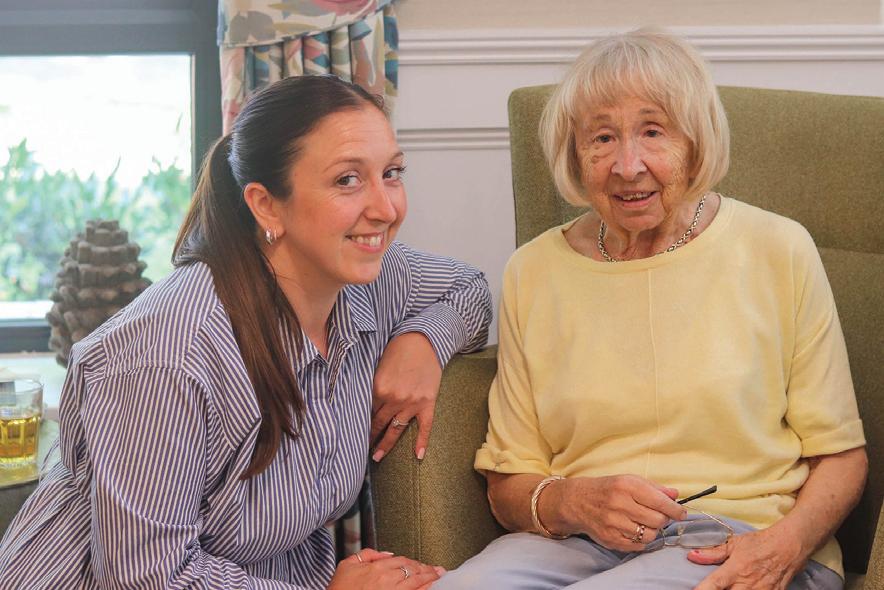
The level of continuity within the Standish Care Village will provide current and future residents with a
home for life, giving them and their loved ones unrivalled security and peace of mind.
The Standish Care Village now caters for respite, residential, dementia, nursing and advanced dementia care.
Stacey Astin, Group Regional Manager at Millennium Care, said:
“As a Group were delighted that we have been able to continue providing care for Doreen, and we can now offer continuity to current and future residents. Previously, it has been a painful process when residents have had to move homes for themselves, their families and staff at the home.
“The Standish Care Village ensures connections can be maintained, while the homes can also join forces to create better living and working environments for all.”
Tara Morris, Registered Manager at Langtree Care Home, said:
“We’ve spent the last few months getting ready for this moment. As Langtree’s Home Manager, I am delighted to see our first cohort of residents and, of course, Doreen, mark a very special milestone for the home.
“I know this home will provide countless lifelines for residents and their families, while being part of the Standish Care Village gives residents at Lakeside and Worthington Lake care home assurances of care continuity.”
The South West’s Leading Care & Occupational Therapy Event – Are You In?
Here’s 5 Reasons You Need to Be at The Care & Occupational Therapy Show!
On 16th July at Westpoint, Exeter, The Care & Occupational Therapy Show is bringing together the best in the Care and Occupational Therapy industries for a game-changing event. We will be there, here’s why you need to be there too: �� Unmissable keynote sessions from industry leaders like The Homecare Associations,







The Equality and Human Rights Commission (EHRC) has today published new guidance to empower social care commissioners in Wales to meet their legal duties under the Public Sector Equality Duty (PSED) and address persistent inequalities across the sector.
The guidance provides a practical framework for integrating equality and human rights considerations throughout the commissioning cycle, aligning with Standard 10 of the Welsh Government's National Framework for commissioning care and support which requires local authorities and health boards to proactively address inequalities.
Interim Chair of the EHRC’s Wales Committee, Martyn Jones JP DL, said: “Our evidence shows alarming patterns of inequality affecting both those who need care and those who provide it. Ethnic minority care workers face discrimination and poorer working conditions, while vulnerable groups report distressing experiences within care settings.”

"By considering equality at every stage of the commissioning cycle, we can transform lives. Our guidance gives commissioners the practical tools they need to embed equality and human rights into decisions, which will help improve outcomes for both service users and the social care workforce.”
The guidance addresses findings from the EHRC's 2023 "Is Wales Fairer?" report and an inquiry into the treatment of lowerpaid ethnic minority workers, which revealed significant inequalities in both service provision and workforce treatment.
It offers commissioners practical strategies for leveraging procurement powers to drive equality improvements through contractual requirements.
KEY FEATURES OF THE GUIDANCE INCLUDE:
• Practical advice on applying the PSED at each stage of the commissioning cycle
• Tools for embedding equality considerations in procurement processes
• Strategies to address specific inequalities, including those facing ethnic minority workers and disabled service users
• Guidance on setting SMART objectives and measuring outcome
• Real-world examples showing how commissioners can use procurement to promote equality
The resource is built around the EHRC's nine guiding principles for social care, which emphasise availability, accessibility, person-centred care, choice and control, community connection, effective redress, robust regulation, support for unpaid carers, and a valued workforce with fair pay and treatment.

Residents and staff at Enfield care home Bullsmoor Lodge welcomed the roar and rumble of a posse of bikers recently, as eleven members of the Black Mafia Motorcycle Club arrived to help celebrate the home’s ‘Outstanding’ Veteran Friendly Framework assessment.
The Black Mafia Motorcycle Club was founded by veterans of the Royal Green Jackets, an infantry regiment of the British Army formed in 1966, taking its name from the regiment’s nickname.
Del Goody, President of the Black Mafia Motorcycle Club, said:
“All of us were very touched by the warm welcome we received. We feel very strongly about how important it is not to forget about the elderly community and if we can bring some sunshine into their day then we are more than happy to do so, as indeed the dedicated staff do on a daily basis at Bullsmoor Lodge. We met some fantastic people, residents and staff alike, and would be delighted to return at some point in the future.”
Their visit came as Bullsmoor Lodge celebrated the completion of its Veteran Friendly Framework assessment, which resulted in an ‘Oustanding’ commendation. The aim of the VFF is to better support the practical, emotional and social needs of the Armed Forces community in residential care homes across England by providing training and resources to assess and improve the care they offer. It will help tackle loneliness and has the scope to deliver improved health and wellbeing outcomes for the 25,000 veterans living in care homes in England.
To achieve its Veteran Friendly status, Bullsmoor Lodge was required to meet eight standards. These included noting Armed Forces status within care plans, addressing social isolation and signposting to support services, such as their local Royal British Legion branch and other charities that provide support for
veterans or their partners.
Manager Lisa Coombs said:
“We’re really proud to share that we’ve been officially accredited under the Veteran Friendly Framework (VFF)! This has been such a meaningful journey for us, helping our team learn more about how to support veterans and their families in the best possible way.
“It has opened up so many important conversations with our residents. What we once worried might be difficult stories to hear have actually turned into beautiful memories, from heart-warming love stories to cherished memorabilia. It’s been incredible to see how much joy and pride these moments bring to our residents when they’re able to share them.

“We’re excited about what’s ahead, we’ve got some lovely events in the works and new partnerships forming. One of those events will be our VFF Celebration Afternoon Tea (date to be confirmed), and we can’t wait to celebrate together. This is just the beginning, and we truly believe it will help us make a difference – not only in our home but also in the wider community.”
The VFF is a collaboration between Armed Forces charities Royal Star & Garter and Royal British Legion, and NHS Veterans’ Covenant Healthcare Alliance (VCHA), with funding support from the Armed Forces Covenant Fund Trust.
Kathryn Glass is the VFF Project Lead at Royal Star & Garter and is responsible for supporting and assessing care homes going through the scheme. She said: “The application that Bullsmoor Lodge submitted was of an exceptionally high standard and is a testament to the dedication, passion and commitment they have for providing high-quality person-centred care for their residents, along with forging some really meaningful connections to the AF Community and NHS services.”
All nine AgeCare care homes are undergoing VFF accreditation this year.
In care homes, where hygiene, safety, and reliability are paramount, it’s essential that laundry operations run seamlessly. Forbes Professional’s Complete Care solution is tailored to meet the specific demands of this environment, offering fully supported and cost-effective laundry systems.
With Complete Care, care homes benefit from access to premium commercial laundry appliances without upfront capital expenditure. The all-inclusive rental plan covers installation, routine servicing, maintenance, and repairs; enabling staff to focus on resident care rather than laundry appliance logistics. Unexpected breakdowns can severely disrupt operations, which is why Forbes provides nationwide, award-winning support with a same or next-day engineer response to minimise downtime.
Preventative servicing is central to Forbes’ approach. Their offering includes routine maintenance, full certification, annual gas safety checks, and professional dryer duct cleaning - ensuring systems meet all legal and regulatory standards. Whether supporting existing machines or those rented through Forbes, this

proactive strategy improves operational efficiency and reduces risk.
Under Regulation 35 of the Gas Safety Regulations 1998, annual gas inspections are mandatory. Forbes’ Gas Safe-registered engineers conduct these checks to ensure safe, legally compliant environments. Additionally, regular duct cleaning - often overlooked - is vital not only for performance but also for fire prevention. Forbes’ nationwide service mitigates these risks while optimising dryer efficiency.
Whether you need new rental equipment, service and maintenance for existing appliances, or a full purchase, Forbes offers flexible procurement routes to suit different operational models and budgets. Their expert consultants work closely with care providers to design tailored solutions for each setting.
With decades of experience in the care sector, Forbes Professional is a trusted partner to care homes across the UK; delivering dependable, fully supported laundry solutions that prioritise safety, compliance, and peace of mind.
0345 070 2335

Residents of Cabrini House in Orpington, a care home run by Diagrama Foundation for adults with learning disabilities, are discovering freedom, joy, and confidence each week through the simple but powerful act of sailing.
Each week, residents travel by minibus to Chipstead Lake near Sevenoaks, where they take part in sailing sessions that have become one of the most popular activities on offer at the home. While Cabrini House offers a wide range of weekly outings, from cycling at Norman Park and indoor bowls to cinema trips and dance parties, sailing holds a special place in the hearts of many.
Support Worker Leah Mallows explains:
“Regular activities like sailing help our residents build independence, physical fitness, and social confidence. More than that, they bring joy and a sense of purpose. It’s incredible to see how much our residents grow when given the opportunity to try something new and challeng-

ing.”
Some residents enjoy the lake’s sailing club in small groups, supported by staff and experienced Chipstead Lake sailors, but two residents have gained so much skill and confidence that they now sail solo.
One of those is Ian, a long-time sailing enthusiast with a personal certificate to prove his dedication.“I love sailing,” he says with a big smile. “I like collecting sailing things.” Ian has been enjoying this activity for many years and shows no signs of slowing down. Another of his favourite parts of lake visits is Jess, a lively dog who loves chasing a ball into the water and swimming to retrieve it.
Leah Mallows continued:
“Ian doesn’t like wearing hats, even though sun safety is essential on the water so we’d like to put out a special request – If you have a cap with a boat on it, please consider sending it to Ian at Cabrini House we think he might just wear one he likes!”
Silvanna Court Care Home, part of Runwood Homes Group, has strengthened its intergenerational partnership with Abacus Primary School through a touching new initiative; a fortnightly visit to the school’s Sign Language Club.
Silvanna Court resident Reg, who has been deaf since birth, was invited to join the children in their weekly sessions. Reg now visits the club fortnightly to support and connect with pupils who are learning British Sign Language.
The initiative was born from a conversation between Headteacher Heidi and Leah, Lifestyle Coordinator at Silvanna Court during one of their Dementia Champion planning meetings. With the Sign Language Club happening just across the corridor, the idea to involve Reg came

naturally.
During the most recent session, Reg asked the children questions and responded entirely in sign language. The children, eager and proud to showcase their skills, engaged warmly with Reg which was very moving for everyone.
Leah shared: “There were a few tears. It was so emotional to see the children excited to communicate with Reg. They made him feel included, valued, and proud.”
Reg added: “I’m so happy the children are learning sign language. It’s made me feel very included and happy.”
A standout moment came when both Reg and the children signed “bunny rabbit”, sparking joyful giggles throughout the room.

At Rosa Lifestyle, we believe that daily living aids should do more than just meet functional needs - they should spark joy, preserve dignity and reflect individuals’ personalities. This belief is at the heart of every product we create, and it’s a vision born from a very personal place.
Our founder, Sarah, established Rosa Lifestyle after experiencing first-hand the lack of practical yet dignified and stylish solutions available for her own grandmother, who was living with dementia. She found that too often, the market was saturated with clinical-looking, uninspired products that did little to support wellbeing or enhance the experience of those living with cognitive or physical challenges. Rosa Lifestyle was created to change that.
We design products that support people to continue eating and drinking more independently, but also with more confidence and comfort. Our core range of produces includes lightweight, two-handled mugs, compatible mug lids, and matching snack trays - all made from high-quality melamine to give the look of a china or ceramic mug but importantly, without the weight. Each item is carefully developed to be functional, durable, and attractive - bringing a sense of warmth and homeliness to mealtimes.
WHAT THOUGHTFUL DESIGN CAN DO
The impact of beautifully considered daily living aids extends far beyond aesthetics. As a resident living with early-onset dementia shared in her heartfelt response: “I am a youngster in a care home and was needing to use their plastic two-handled beakers which I hated! Found your beautiful, colourful mugs! They are great and don't remind me of my disabilities and much nicer when visitors join me for afternoon tea!” This testimonial cuts to the very heart of our mission - creating products that people are proud to use, that support their needs without highlighting their limitations and fostering greater social connections and inclusion. Our two-handled mugs, for example, are specifically designed to offer greater stability for individuals with limited grip strength, tremors, reduced vision, or reduced dexterity. The dual handles allow for a balanced, secure grip, reducing the risk of spills and burns. This not only improves safety but can dramatically reduce anxiety around drinking - both for users and their caregivers.
Meanwhile, our mug lids help prevent spills and keep beverages warmer for longer, while our snack trays are perfect for that lunchtime sandwich or afternoon cake and have an integrated cup holder for greater

stability, are lightweight, and easy to clean. Together, these products support better hydration and nutrition - two essential but potentially challenging areas in care environments.
REAL IMPACT, REAL VOICES
The most powerful endorsements of our work come from those who use our products every day. One care home manager told us: “The mugs are being well utilised and have been a wonderful addition to the home.” While at a dementia day centre in Fife, the team shared how Rosa Lifestyle mugs have transformed daily routines: “We use the mugs every day for our clients who love them! With these mugs being lighter than others, we’ve noticed that not only do our clients drink more fluids (and soup) than they otherwise would - which really helps their overall fluid and nutrition intake - it also promotes their independence and dignity as well.” These kinds of outcomes are why we do what we do.

For caregivers, whether professionals or family members, our products are more than tools. They are part of a broader culture of care that values choice, dignity, and self-expression. When a resident or loved one feels more confident and capable using a product that respects their tastes and abilities, the knock-on effects are enormous: greater participation in mealtimes, improved mood, and fewer incidents of frustration or distress.
Our hope is that Rosa Lifestyle products are seen as adaptive homeware rather than clinical aids and become staples in care homes, day centres, and private homes alike - not only because they’re functional, but because they bring a dignified positivity to people’s everyday lives.
In an ever faster moving and busy world, small moments matter. A warm cup of tea enjoyed without fear of spilling. The comfort of a snack on a familiar tray. The joy of choosing a mug that feels personal. These are the moments that build dignity, connection, and overall wellbeing.
To learn more about Rosa Lifestyle or explore our product range, please visit www.rosalifestyle.co.uk or see the advert on page 5
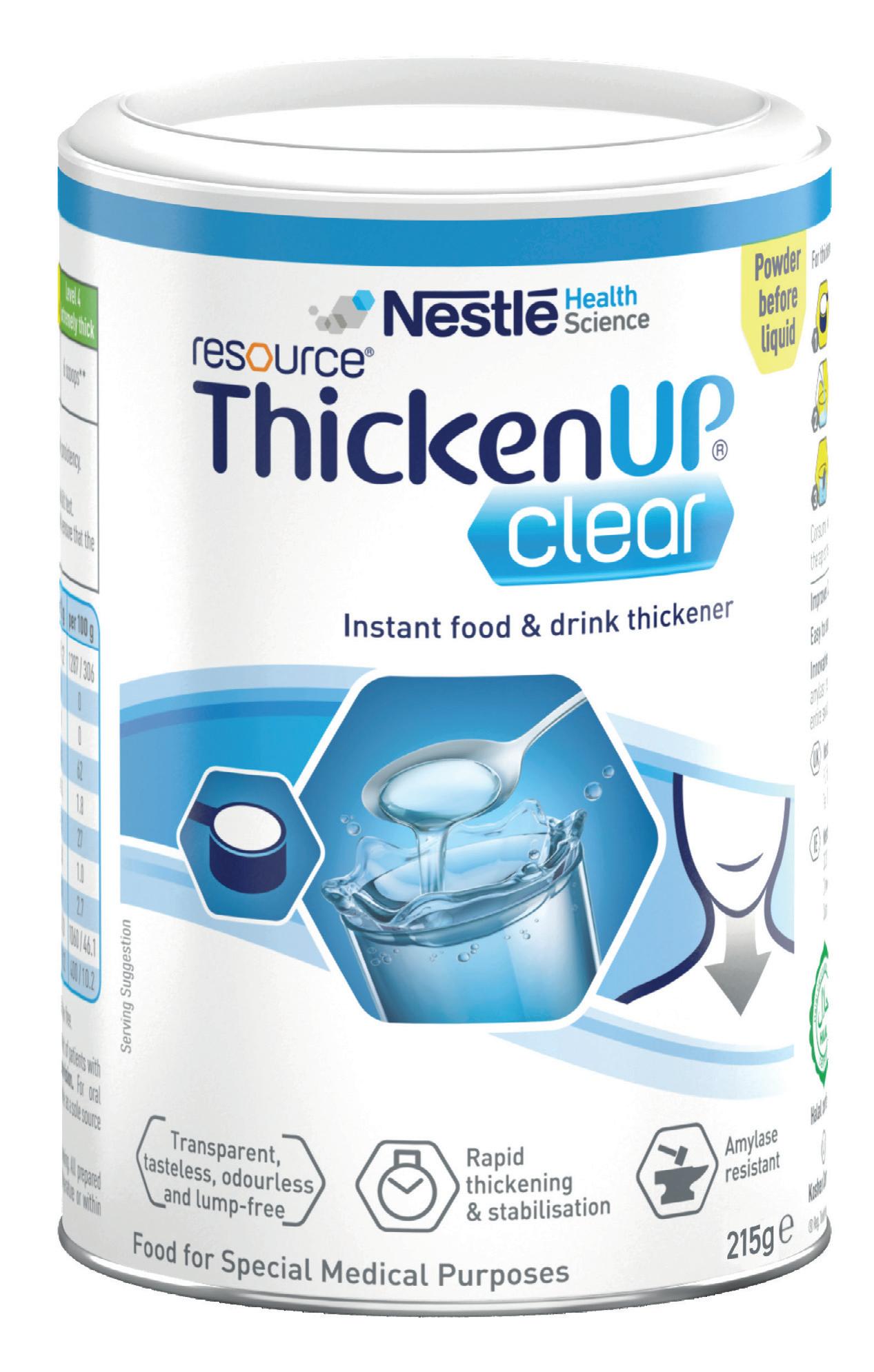
From March 31st, new waste disposal regulations came into effect as part of the Government’s Simpler Recycling initiative.
Designed to reduce waste and increase recycling rates across the country, this has direct and potentially significant implications for the care home and nursing home sector. Anenta, the UK’s leading independent healthcare waste management specialist for the care home sector, explains to issues at hand.
Under the news Simpler Recycling regulations, in addition to segregating clinical waste and offensive waste into separate waste streams, care homes now have a legal duty to separate out all recyclable materials from general waste.

Paper and card, plastic, glass, metal, and food waste all need to be separated and stored in segregated waste collection streams, necessitating larger storage areas, more waste receptacles, and more waste collections.
Although this has implications and associated costs, the new regulations are important because incorrectly disposed waste not only puts a strain on England’s waste capacity – hampering sustainable waste targets – but also significantly adds to the cost of care home waste bills.
FOOD FRUSTRATION
Of all the new waste streams, food waste is likely to be one of the biggest headaches for care homes. That’s because if you produce more than 5kg of food waste per week, you will need to implement a separate food waste disposal system.
Food is a particularly significant form of waste for most care homes as it’s almost impossible to avoid when catering for residents.
In some cases, care homes will have good protocols in place for uneat-
en or waste food, with collections for anaerobic digestion or composting in place. However, for many others this will not be the case, quite simply because it’s always been easier to put waste food into general waste.
And while food waste from canteens or communal eating areas may be relatively easy to collect and recycle, it’s important to remember that a significant amount of other food waste – resulting from items being consumed by both staff and residents in other areas – have the potential to end up in general waste too. Under the new rules that cannot be allowed to happen and that means you now need to make separate food waste bins readily available in public areas.
WHAT IF YOU DON’T COMPLY?
Under the new legislation, if you put food waste into the wrong bins, your supplier will not be permitted to collect them. However, you’ll still be charged, and repeated non-compliance could result in fines or other penalties, which could be as high as £5,000 or more.
To avoid this, you’ll not only need to have sufficient food waste bins in place within your care home, but appropriate training to ensure that all staff are aware of the importance of segregating waste correctly. Here, appropriate signage is also advised to avoid any confusion.
You’ll also need to ensure that food waste collected within your care home – including inedible food parts such as bones, eggshells, fruit and vegetable skins, tea bags and coffee grounds – actually make it into the designated food waste bin for collection.
When you consider that general waste for care homes costs anything between £180 and £250 a tonne, whereas food waste – collected for
Mobile Kitchens Ltd specialises in the hire or sale of temporary catering facilities and foodservice equipment. Ideal for events or to provide temporary catering facilities during your kitchen refurbishment, our versatile units and equipment offer an efficient and economic solution to the caterers’ needs.
Production Kitchens, Preparation Kitchens, Ware-washing Units, Dry Store Units, Cold Rooms and Restaurant Units are available as individual units in their own right or they can be linked together on site to form a complete complex.
Alternatively, we can offer modular, open-plan facilities, usually for larger, longer-term hires.
We offer a free design service, and project management from concept through to delivery and installation on site, plus full technical support throughout the hire period.
The standard specification of our smallest Production Kitchen unit includes a six burner oven range, sala-

anaerobic digestion – costs between £105 to £190 per tonne, it simply doesn’t make sense to continue putting food in your general waste.
Quite apart from avoiding large fines – which could affect your reputation – switching from using the general waste stream for food disposal to anaerobic digestion will save your business anything between 8% and 16%. That’s a saving of £60-£120 per 1,100 litre bin per annum. For care home groups with multiple locations, that’s a saving that soon mounts up.
So, far from being a bad thing financially, the new recycling regulations actually have the potential to bring about long-term cost savings for care homes throughout England. Viewed through that lens switching to segregation makes complete sense.
But it’s not the only benefit. By diverting your food waste from general waste into a separate food waste recycling stream, it can be reprocessed through anaerobic digestion to create organic fertiliser and biogas, helping your business move one step closer to becoming zero-to-landfill and achieving your environmental targets.
This avoids your care home food ending up in landfill where it would release methane, a gas which, according to the UN Environmental Programme, is 80 times more harmful than carbon dioxide
Adopting this process will help to ensure that the correct waste goes into the correct channels, saving your care home money, keeping you compliant, minimising environmental impact, and avoiding inadvertent contamination that could cause issues with your waste collection, leading to extra cost, and stringent action by the authorities.
Far from being feared, the new Simpler Recycling regulations should be embraced, saving your care home money and playing a part in saving the future of the planet.
For guidance and advice on how to meet the Simpler Recycling Workplace Rules, and for information on the best systems to adopt for waste storage and collection, email Anenta at contact@anenta.com or call 033 0122 2143. www.anentawaste.com
mander grill, twin basket fryer, upright fridge, hot cupboard, single bowl sink unit with integral hand wash basin, plus ample power points to plug in Microwaves, Food Processors, Toasters etc. Internal equipment can be interchanged and clients can effectively specify their preferred layout.
We have many tried and tested design layouts and would be pleased to put forward our recommendations for your project.
So if you’re planning a refurbishment or need to cater for an event then why not give us a call and we’ll be happy to provide advice and put forward a competitive proposal.
For further information or to arrange a site visit, email: sales@mk-hire.co.uk or call us on 0345 812 0800, or visit our website: www.mk-hire.co.uk
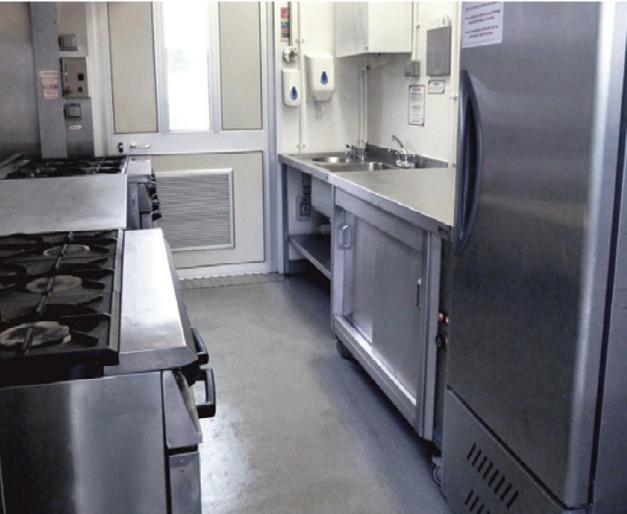
Following the British Dietetic Association’s (BDA) rollout of the Care Home Digest last year, Bidfood, one of the UK’s leading wholesalers, has produced an industry-leading, four-weekly menu cycle, aligned with the Care Home Digest.
Designed to support care operators in implementing the guidelines, the menu cycle offers unrivalled inspiration for Bidfood’s care customers, featuring over 300 Care Home Digest-aligned recipes available for download.
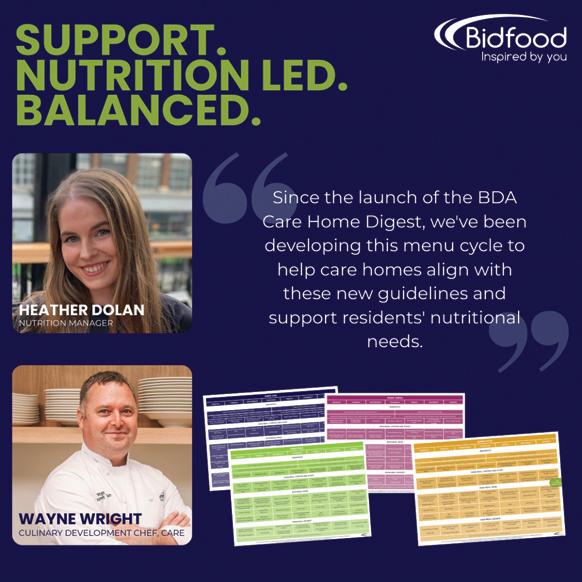
Until last year, healthcare foodservice guidelines were mainly aimed at hospitals, leaving care operators, many of which don’t have access to a dietitian, without tailored resource to support with menu planning.
However, using the new Digest, Bidfood’s expert chef and nutrition team have collaborated to develop this extensive bank of recipes and four-week menu cycle. The cycle demonstrates how operators can align their menus to meet the unique needs and preferences of their individual residents, incorporating food waste tips and a variety of dish types to suit a range of kitchen skill levels.
The menu plan features a balance of food groups including both animal and plant-based proteins, higher-fibre carbohydrates, “healthy” fats and plenty of fruit and vegetables, maximising levels of key nutrients such as protein, fibre and essential vitamins and minerals. The team have also worked hard to reduce sources of saturated fat, free sugars and salt where
possible.
What’s more, every recipe has been nutritionally analysed and adjusted, tweaking both the ingredients used and the quantities, to ensure that nutrition is prioritised whilst also balancing taste, cost and other factors.
Nutrition Manager, Heather Dolan said “At Bidfood we pride ourselves on an evidence-based approach to nutrition, so we were delighted when the BDA’s Care Home Digest was released. We’ve been working on this menu ever since, with the aim of helping care homes to implement the Digest, and ultimately, supporting them in meeting residents’ nutrition and hydration needs.
“It’s been a pleasure collaborating with our healthcare chefs on this project. They’ve brought a wealth of culinary expertise and creative flair to the project. Together, I believe we’ve struck the perfect balance of classic dishes and fresh, innovative concepts.”
To view the four week menu cycle, please visit https://view.bidfood.co.uk/bidfoods-four-weeklymenu-cycle/?page=1
The British Dietetic Association’s Care Home Digest was created to support care homes in developing varied and balanced menus that will tempt residents to eat and drink well, whilst being designed as a toolkit that makes it easy for care operators to dip in and out of chapters as needed. For more information on the Care Home Digest, visit www.bidfood.co.uk/blog/what-you-need-to-knowabout-the-new-bda-care-home-digest/

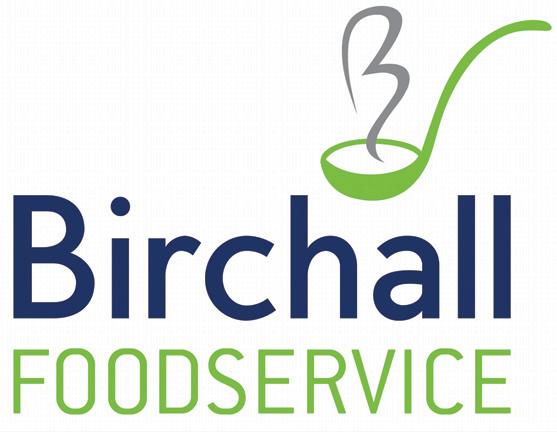
Burnley-based wholesaler and founder Country Range member, Birchall Foodservice, has launched its first-ever Care Home Activity Pack — a 62-page guide designed to support activity coordinators and caterers working within the healthcare sectors.
Recognising the challenges that care home teams face in delivering engaging, enjoyable, and meaningful activities for residents, the pack offers a comprehensive range of creative ideas built around food. Its aim is simple: to spark joy and connection through shared experiences that centre on mealtimes, cultural celebrations, and interactive activities.
At the heart of the pack is a month-by-month events calendar, highlighting key seasonal dates such as Valentine’s Day, Easter, and Remembrance Sunday — each paired with activity suggestions, food ideas, games, and even suggested decorations. These are supported by easy-to-follow recipes and product recommendations.
Popular food-themed games include Biscuit Jenga, Build Your Own Pizza nights, and Food Bingo, which are designed to encourage motor skills, social interaction, and laughter. There's also a "World on a Plate" section, offering immersive cultural experiences for countries including Italy, Mexico, Spain, France, China, and the UK — complete with themed menus, music ideas, and crafts.
To help tackle hydration in fun and engaging ways, the pack features ideas such as mocktail parties, milkshake decorating, and “Guess the Drink” challenges — all designed to improve fluid intake without it feeling like a chore.
Joe Moulton, Marketing Manager at Birchall Foodservice, said: "This pack combines food and fun to help care homes deliver meaningful activities that residents will genuinely enjoy. It’s all about sparking joy through shared experiences, whether that’s a themed afternoon tea or a game of Food Bingo."
The pack has been developed with support from trusted foodservice brands including Albany, Soreen, McVitie’s, Kellogg’s, Lakeland Dairies, and Nestlé. It offers a mix of inspiration and practicality, helping care teams save valuable planning time while delivering enriching experiences. Available now to all Birchall Foodservice customers and care homes across the UK, the pack is free to download.
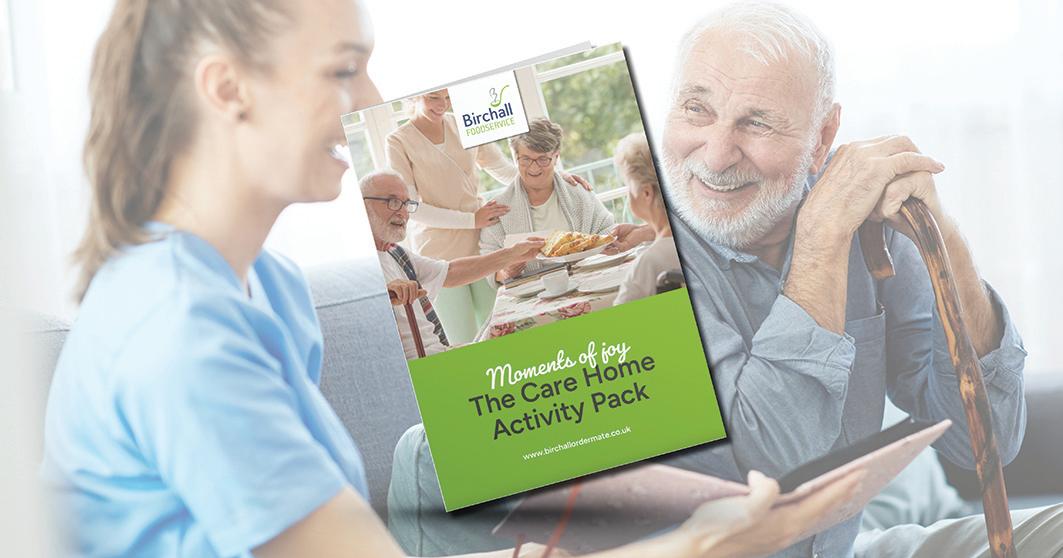
To access the Care Home Activity Pack, visit: www.birchallfoodservice.co.uk/resources or get in touch with the Birchall team by calling 01282 429446.
Jelly Drops (backed by the Alzheimer's Society through their Innovation Accelerator programme) have announced a new 288 pot ‘bulk’ pack for the care sector allowing care homes and in-home agencies to buy in bulk at a reduced rate, ahead of the anticipated warmer summer weather. These award-winning water sweets with added electrolytes boost hydration for people living with dementia and others that struggle to adequately hydrate. By eating two to three pots of Jelly Drops throughout the day, residents with hydration challenges can easily top up their fluid intake in a dignified and independent way.
Dehydration is a common challenge for people living with dementia and aspects like memory problems, potential lack of dexterity and/or avoiding drinks due to fear of incontinence or confusion about where
the toilet is, can all make individuals more susceptible to the dangers of dehydration. Conversely, being well hydrated supports brain function, reduces the risk of urinary tract infections (UTI’s) and unnecessary hospital visits. Even mild dehydration can significantly impact an individual’s wellbeing when they are already dealing with cognitive challenges like dementia.
Jelly Drops have supported over 100,000 families since being developed by Lewis Hornby for his late Grandma Pat who struggled with staying hydrated whilst living with dementia.
If you are interested in learning more about the 288 pot ‘bulk’ case of Jelly Drops to support hydration for your residents or clients,, please contact hello@jellydrops.com or visit www.jellydrops.com

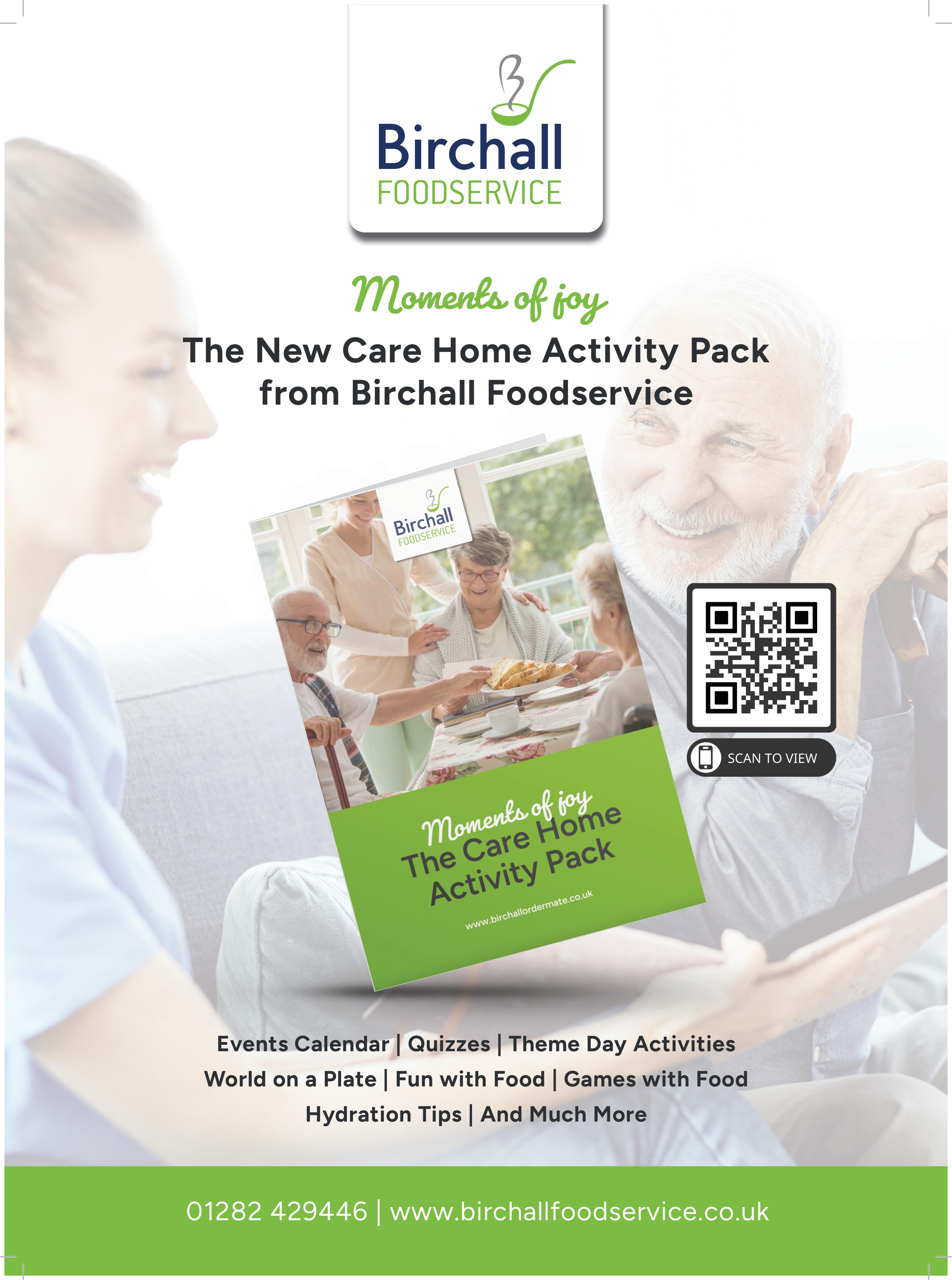
The Treat-Eezi full length pressure relieving mattress overlay (very high risk to stage 4 pressure ulcers) is designed to be laid on top of mattresses. It naturally and gently moves with the patient creating an almost zero chafing area allowing the patient a silent, comfortable sleep along with the assurance any pressure sores present are given the best possible chance to breathe and heal.
Quotations available via checkout.
£241.40p (Exclusive of VAT)
PRODUCT BENEFITS

• Precision Relief: Using advanced 3D pressure sensor mapping, our pressure-relieving mattress overlays provide targeted relief by accurately identifying pressure points, ensuring optimal support for patients.
• Pressure Relief: Our unique 4-layer pressure-relieving mattress overlays offer unique pressure sore prevention, trusted by over 10,000 medical professionals since 2016.
• Sleep Benefits: No noisy pump systems; our static solution guarantees a peaceful sleep environment, free from disruptions or maintenance hassles and allows the patient to sleep with their partner.
• Breathability: Enhanced breathability ensures optimal airflow for keeping patients comfortable and cool.
• Endorsements and Warranty: Backed by endorsements from NHS community services and a full two-year warranty.
• Easy Application: Our pressure-relieving mattress overlays have easy-to-follow instructions.
WHO IS IT FOR
The Treat-Eezi full-length pressure relieving mattress overlay is ideal for individuals who spend prolonged periods in bed or seated, including:
• Elderly individuals with limited mobility
• Patients recovering from surgery or injury
• Those at risk of developing pressure sores
• Caregivers looking to enhance comfort for their loved
ones
Sales/General Inquiries: 0208 133 2851 www.danmedicasouth.co.uk
See the advert on page 11 for more information.
At Novamed, we understand the daily challenges that incontinence brings.
With that in mind, our specialist team, which includes a retired NHS continence nurse, have developed a premium product range designed to give users comfort, protection, and dignity, as well as being manufactured to ISO 13485 quality standards. Our comprehensive incontinence care solutions include: All-in-one (slips) for moderate to heavy use Pull-up pants for light to moderate needs Disposable underpads to protect beds and furniture

• Biodegradable bamboo pads for light protection with an eco-conscious approach Each product provides skin-friendliness, odour
control, and ease of use. With consistent quality and comfort, Novamed are trusted by care professionals across the UK. Our Devon-based warehouse ensures fast, discreet delivery throughout the country. We offer free samples to help you assess the best fit. Novamed products are also trusted internationally, with distribution in Gibraltar, Montenegro, the Middle East, and Europe. For continence care you can depend on, contact Novamed today to learn more or request your free samples 0808 196 2070 www.novamedpads.co.uk info@novamedeurope.com
See the advert on page 4 for details.
CareZips® Classic are patented, easy dressing unisex adaptive pants designed for older and disabled people suffering with problems associated with continence, mobility, mental function and cognition. Suitable for persons living in care institutions, receiving care at home or living independently at home, CareZips® Classic enable people to dress themselves or with assistance from carers.
CareZips® Classic feature patented 3-zipper system, which opens the front of the pants from the waist to the knees for quicker access during toileting, continence pads changes and personal hygiene.

The forward positioning of the two side zippers lessens pressure on sensitive hip areas, helping to eliminate discomfort. The third zipper facilitates simple full frontal opening for faster more dignified diaper changes, catheter adjustments, personal cleansing and hygiene routines.
CareZips® Classic have many benefits for the older and disabled users and their carers:
• People dressing themselves enjoy the practical
Based in Derbyshire, we’re a family-run business with over 30 years of experience committed to helping care homes create safe, welcoming outdoor spaces for residents, staff and visitors.
We offer a wide range of garden furniture, including benches, companion seats, dining sets, picnic tables and planters, all crafted to be strong, durable and splinter-free. Unlike traditional timber, our furniture won’t rot, warp, or require painting, making it a low-maintenance, long-term solution for care environments.
Our products support the circular economy by transforming waste plastic into something both functional and stylish. Each piece is made here in the UK and built to withstand all weathers, year after year. In recognition of our sustainable practices, we’ve been awarded the King’s Award for Enterprise in Sustainable Development. Here’s what Darley Hall Care Home had to say
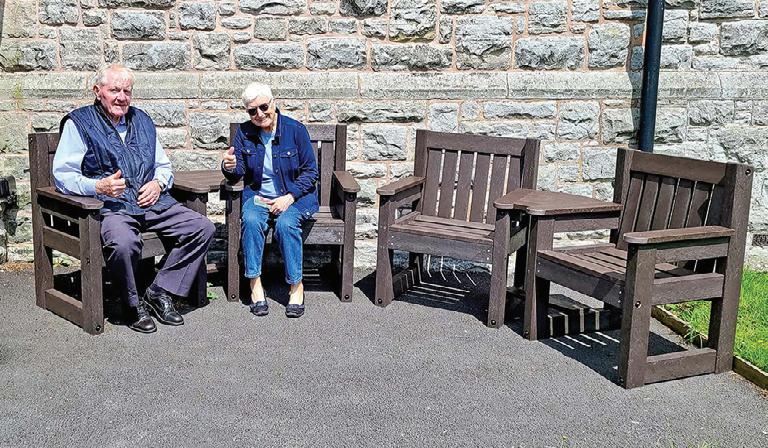
Watch your resident's eyes light up when the trolley arrives! Euroservice trolleys can also be used as a vending trolley or to sell personal care products to residents. How about a delicious snack/pastry trolley or even a drinks trolley for that afternoon tipple? Your lovely trolley could do so much for you and your residents! Visit the website at www.euroservice-uk.com to see the full range.
Or see the advert on page 13.

Angloplas are a UK manufacturer who specialise in producing dispensers for the health and hygiene industry. Although these are designed to keep the workplace tidy and uncluttered they are, more importantly, built knowing the control of healthcare-associated infections (HCAIs) are a priority for healthcare providers, and who are employing a combination of infection prevention and control strategies, including hand hygiene, cleaning, training and the adoption of new technologies, to tackle the problem.

As a result, a wide range of infection control products and technologies are emerging on the market, including antimicrobial technology. Angloplas’ range of dispensers are produced in the world’s first
proven Antimicrobial PVC with silver ion technology and which is exclusive to Angloplas. This helps reduce the risk of cross infection by stopping the growth of bacteria and mould and works continuously for the lifetime of the product, reducing levels of bacteria such as MRSA, E Coli, Legionella, Salmonella and mould by up to 99.99%.
For non-clinical environments Angloplas has recently launched its new Budget Range of products which are made to the same exacting standards as the antimicrobial protected ones but with lower price tags.
You can order Angloplas products directly from its website at www.angloplas.co.uk
See the advert on page 9.
functionality and versatility of the CareZips® Classic, all day comfort and easy garment care.
• People dependent on assisted dressing appreciate quick easy dressing process with less stress, embarrassment and greater dignity offered by CareZips® Classic.
• CareZips® Classic offer practical gains to the carers, helping them to provide better care, whilst reducing physical efforts and saving valuable time.
CareZips® Classic are unisex, available in 6 sizes and 3 practical colours (i.e. black, charcoal and navy). Tapered fit at the ankles gives a tidy appearance. Made from breathable moisture-wicking 4-way stretchy crease-free and easycare durable fabric, CareZips® Classic are comfortable, practical and conveniently functional. For more information, contact Win Health Medical Ltd - 01835 864866www.win-health.com
See the advert on page 3 for further information on Win Health’s product range.
Since our founding in 2010, Activities to Share has been dedicated to enhancing the lives of those in care by providing thoughtfully designed activity products. Our mission is to support activity coordinators in delivering uplifting, engaging experiences that foster connection, joy, and well-being.
We achieve this by listening closely to your feedback and evolving with your needs. Whether over the phone, via email, WhatsApp, or Live Chat on our website, our team is always ready to offer advice and help you find just the right products to bring your ideas to life.

While we embrace the convenience of technology to expand our resources and share knowledge, we remain firm believers in the irreplaceable power of sensory engagement. That’s why we continue to
make our Reminiscence Kits and Sensory Bags with real, tactile items that stimulate the senses. Some experiences— like popping bubbles for the splash, breathing in a familiar scent, or piecing together a puzzle with others—simply can’t be replicated on a screen. These sensory moments are invaluable in encouraging storytelling, sparking memories, and fostering conversation. Our values remain rooted in this commitment to meaningful connection. We’re here to partner with you—the professionals on the front lines of care—to create a sense of structure, well-being, and fun for those who need it most.
for your activity diary

In the evolving landscape of residential and nursing home care, technology now plays an increasingly pivotal role in enhancing said patient safety, staff responsiveness, and overall operational efficiency.
One of the most critical technologies at the heart of this transformation is the nurse call monitoring system. These systems serve as the backbone of communication between residents and care staff, and their importance cannot be overstated in delivering timely and effective care.

UNDERSTANDING NURSE CALL MONITORING SYSTEMS
A nurse call system enables residents to quickly and easily summon assistance. However, modern systems have evolved far beyond simple buzzers. Today, care facilities can choose from wireless, integrated, and modular systems—each designed to meet different operational needs, with modern solutions now connecting with fall detection sensors, electronic patient records (EPR), and mobile caregiver apps. This integration not only streamlines workflows but also helps care homes meet Care Quality Commission (CQC) compliance requirements while delivering faster, more personalised care.
Wireless Systems are ideal for facilities seeking flexibility and ease of installation. Without the need for extensive cabling, these systems can be deployed rapidly and expanded as needed.
Integrated Systems tie into a facility’s broader infrastructure—such as fire alarms, CCTV, and building management systems—allowing for a holistic response to emergencies and enhanced safety protocols.
Modular Systems provide a customisable solution, enabling care homes to scale up or down based on the size of the facility or changing care requirements.
The implementation of an advanced nurse call monitoring system delivers measurable benefits across multiple areas:
• Improved Staff Efficiency: With real-time alerts and data analytics, care teams can streamline workflows and focus attention where it’s most needed, reducing unnecessary checks and overlaps.
• Enhanced Patient Safety: Immediate access to assistance reduces the risk of falls, unattended health episodes, and delayed medication administration.
• Greater Resident Satisfaction: Prompt responses foster a sense of security and dignity among residents, improving their overall experience.
Operational Cost Savings: Efficient use of staff resources and reduced emergency incidents contribute to long-term financial sustainability for care providers.
As regulatory expectations and resident needs continue to rise, nurse call monitoring systems are no longer a luxury but a necessity. They not only support compliance with Care Quality Commission (CQC) standards but also set the tone for a culture of responsive, resident-centred care.
Implementing a nurse call system offers numerous benefits, including improved communication, enhanced safety, increased staff efficiency, better resource allocation, and improved documentation. These advantages contribute to a higher quality of care, improved patient/resident satisfaction, and a more efficient and effective healthcare environment
Investing in the right system requires careful evaluation of a care home’s size, staffing levels, and longterm care strategy. However, the return on investment—in terms of safety, efficiency, and satisfaction—makes it one of the most impactful upgrades a care home can undertake.
In today’s care environment, technology must work in harmony with human compassion.
Nurse call monitoring systems exemplify this synergy, serving as a quiet but powerful ally in the mission to deliver safe, dignified, and effective care.
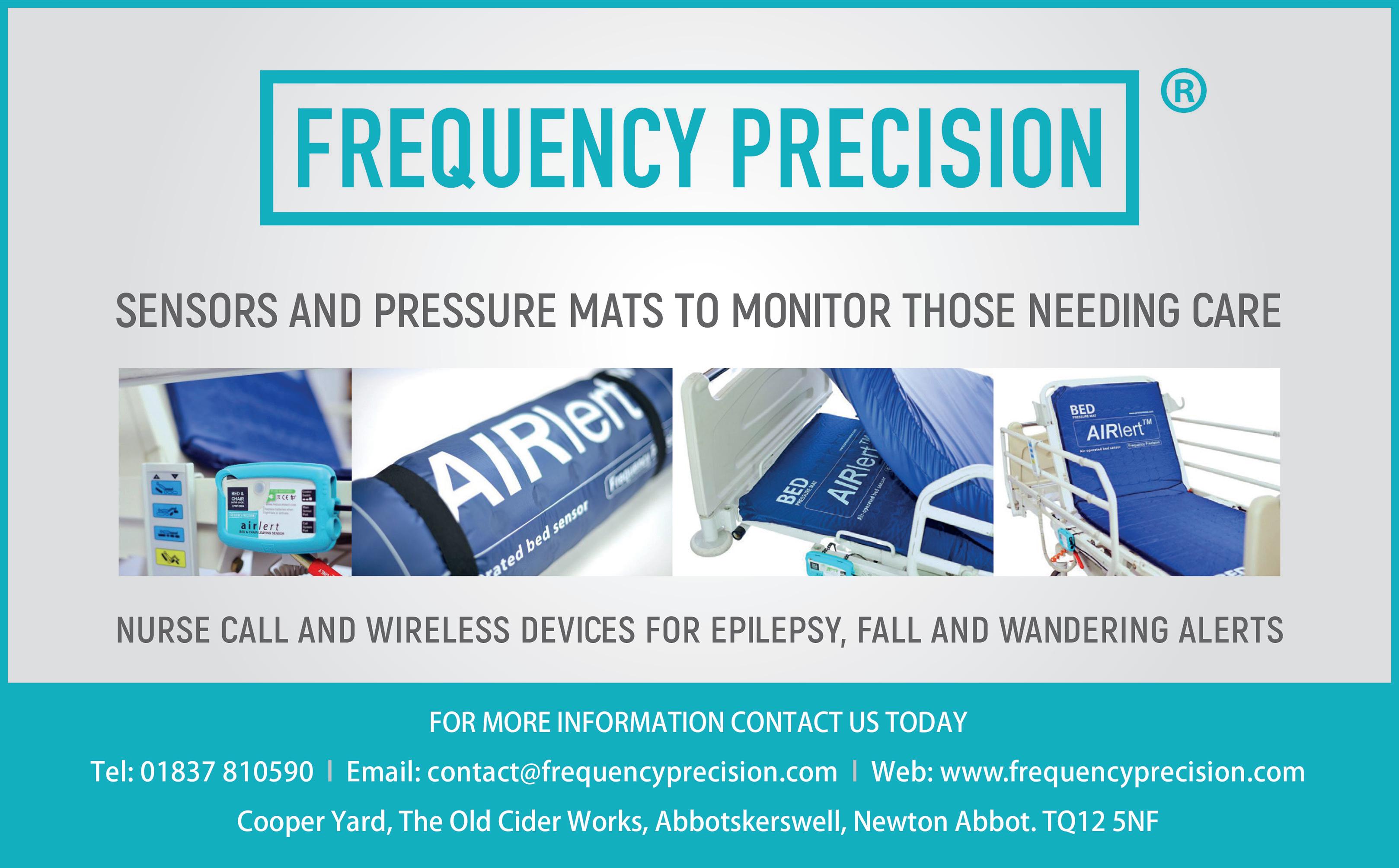
Technology has made people more connected with the world around them and the revolution in assistive care devices has made it possible for the elderly to spend their last years in a comfortable and familiar environment. These devices have also made it easier for home carers to provide quality care for their loved ones while managing their own lives. They allow you to care for your elderly whether they are travelling in the city for errands, staying alone at home, or staying in the same home as you. They are also helping nursing homes provide better care for them with discrete monitoring and quick responses to emergencies.

If you’re looking for these kinds of assistive care devices for your loved ones or nursing home, Frequency Precision produce some of the best systems available to help you with elderly care and mobility monitoring, ranging from bed, chair and floor sensor mats through fall monitoring and GPS tracking to fully integrated nurse call plug or wireless systems.
Phone: 01837 810590
Email: contact@frequencyprecision.com
Website: www.frequencyprecision.com
Blaucomm’s Nurse Call Messaging Service (NMS) is the market leading solution to remove the dependency on noisy nurse call panels and pagers, through its intelligent software, which delivers the alerts straight to the care staff who need them.
Care homes are rapidly introducing smartphones for digital care planning and eMar - now, the same devices can be used to receive the nurse call alerts they need for the residents under their care.
Furthermore, Blaucomm NMS is deeply linked into Person Centred Software MCM, so call bell data is linked straight to care plans. This unlocks a huge benefit to care homes to enhance the staff performance with how they accept and respond to residents, which ultimate-
ly promotes better response times and visibility for management to audit their performance.
The best part is that Blaucomm NMS links into your existing nurse call system - we work with all major brands such as Aidcall, ARM, Courtney Thorne, C-TEC, ENS, Intercall, Medicare, SAS and TeleAlarm.
Care operators are constantly recognising Blaucomm NMS for its reliability and dependability to their care operations, which is why we’ve been chosen time and time again over other solutions.
Head of IT Trudi Harrow at WCS Care had this to say about Blaucomm NMS:
“We find Blaucomm is a genuinely fantastic company with a reliable product.
"We would highly recommend this to anybody who wants to replace expensive pagers and silence those annoyingly loud nurse call screens!” To find out more about Blaucomm NMS, visit www.blaucomm.co.uk/healthcare

Fall Savers®, are an experienced market leading healthcare provider of resident safety solutions for over 15 years.
FALL SAVERS ® WIRELESS MONITOR
Eliminate all cables with our new generation falls management solutions!
Upgrade your falls programme with the latest technology from Fall Savers®. The NEW Fall Savers® Wireless eliminates the cord between the monitor and sensor pad. This results in less work for nursing staff, improved safety for patients and reduced wear and tear on sensor pads. Wireless advantages include the ability to use one monitor with two sensor pads simultaneously and support for many new wireless devices. BENEFITS INCLUDE:
Safer for patients; less work for staff

Bed and chair pads available
One monitor works with two sensor pads
Integrates with most nurse call systems
A variety of options, including: Call button
sensor mat Wireless door/window exit alerts TREADNOUGHT ®FLOOR SENSOR PAD
The TreadNought® Floor Sensor Pad is built to last with a durable construction that far out lasts the competition. Our anti-bacterial floor sensor pad is compatible with most nurse call systems or can be used with a portable pager to sound an alert when a person steps on to the sensor pad. Caregivers typically place the sensor
pad at the bedside, in a doorway or other locations to monitor persons at risk for falls or wandering. An optional anti-slip mesh reduces the potential for slippage on hard surface floors.
FEATURES INCLUDE:
Connects directly to most nurse call systems
High Quality anti-bacterial Floor Sensor Pad
Large Size Pad: Measures (L) 91cm x (H) 61cm
Options (sold separately): Anti-slip mesh for hard surface floors

See the advert on this page for further details or visit www.fallsavers.co.uk.

Falls are a significant concern for vulnerable individuals, especially seniors and patients at risk. Medpage, a leader in assistive technology, offers a range of cuttingedge products designed to enhance safety and provide peace of mind for caregivers and families. Here’s an in-depth look at some of their standout solutions:
MPRCG1 (2023) BED LEAVING DETECTION ALARM WITH CAREGIVER RADIO PAGER
The MPRCG1 is a comprehensive system tailored for fall prevention in domestic, commercial, and NHS care settings. This all-inclusive kit includes a bed pressure mat sensor, a BTX21-MP alarm sensor transmitter, and an MP-PAG31 radio pager. The system is designed to alert caregivers when a patient leaves their bed, reducing the risk of falls. Key features include:
Wireless Alerts: Notifications are sent to the caregiver’s pager via tone or vibration.
Customizable Alarm Delays: Options for instant, 15-minute, or 30-minute delays.
Durable Design: Antimicrobial and disinfectant-resistant materials ensure longevity.
• Ease of Use: Minimal installation required, making it user-friendly and portable.
HDKMB2 HOSPITAL DISCHARGE KIT FOR FALLS RISK PATIENTS

monitoring capabilities of healthcare facilities. Its versatility makes it a valuable addition to any care environment, ensuring timely responses to patient needs.
RON-WC2 WATERPROOF DISABLED PULL CORD ALARM TRANSMITTER WITH WIRELESS ALARM RECEIVER
The RON-WC2 is a robust solution for disabled individuals requiring immediate assistance. This waterproof pull cord alarm is ideal for use in bathrooms and other high-risk areas. Paired with a wireless alarm receiver, it ensures that help is just a pull away.
Features include:
Waterproof Design: Suitable for wet environments.
Wireless Connectivity: Reliable transmission to the alarm receiver.
Ease of Installation: Simple setup for quick deployment.
WHY CHOOSE MEDPAGE?
Medpage’s commitment to innovation and quality is evident in their product range. Each solution is designed with the user’s safety and convenience in mind, making them a trusted choice for caregivers and healthcare providers alike.
The HDKMB2 is a thoughtfully curated kit aimed at supporting patients transitioning from hospital to home care. It includes essential tools to mitigate fall risks and promote recovery. This kit is ideal for caregivers seeking a comprehensive solution to enhance patient safety during the critical post-discharge period.
CMEX-21 MULTI-PORT WIRELESS SENSOR INPUT EXPANDER FOR NURSE CALL CONNECTION
The CMEX-21 is Medpage’s latest innovation, designed to integrate seamlessly with existing nurse call systems. This multi-port expander allows for the connection of multiple wireless sensors, enhancing the
By investing in these advanced fall prevention tools, families and facilities can create safer environments for those at risk. Medpage continues to lead the way in providing practical, reliable solutions that make a real difference.
For more information, visit Medpage’s official website or contact their team to explore these products further. Safety starts with the right tools, and Medpage delivers just that. www.easylinkuk.co.uk
T: 01536 264 869
Courtney Thorne, a long-standing innovator in healthcare communication systems, is setting new standards in the care home sector with its advanced wireless nurse call technology—designed to improve resident safety, enhance staff efficiency, and support a more responsive care environment.
With over 30 years of experience serving the UK healthcare market, Courtney Thorne’s systems are now trusted by thousands of care homes nationwide. Unlike traditional hardwired solutions, their wireless nurse call systems offer non-invasive installation, scalability, and smart analytics—making them ideal for both new builds and retrofit projects.
“At the heart of our technology is the belief that better communication leads to better care,” says Graham Vickrage, Managing Director at Courtney Thorne. “Our wireless systems not only reduce response times but also empower staff
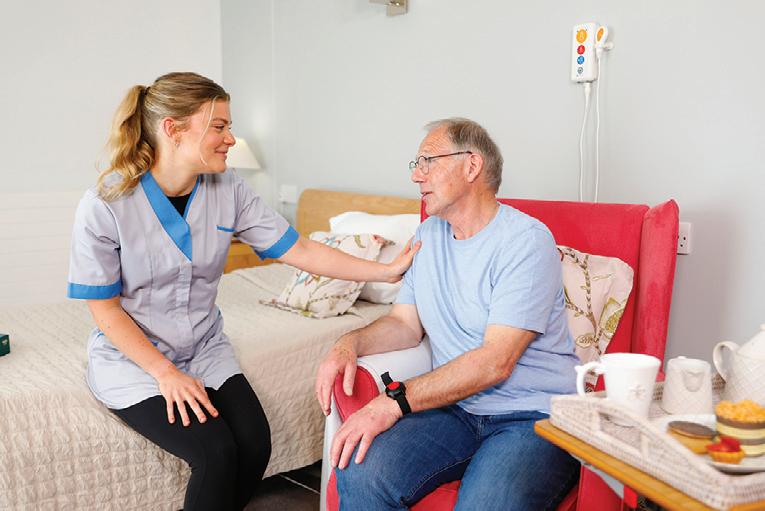
with the tools they need to deliver safe, person-centred care.”
Care providers are increasingly choosing wireless systems for their flexibility, reliability, and cost-effectiveness. With a full suite of accessories—including neck pendants, door monitors, fall detection, and bed sensors—Courtney Thorne systems can be tailored to meet the specific needs of each home and resident.
In an industry where compliance, safety, and staff pressures are always front of mind, Courtney Thorne provides more than just products—they offer ongoing support, training, and a commitment to innovation that helps care homes futureproof their operations.
For more information or to book a free demo, visit www.c-t.co.uk or contact info@c-t.co.uk.
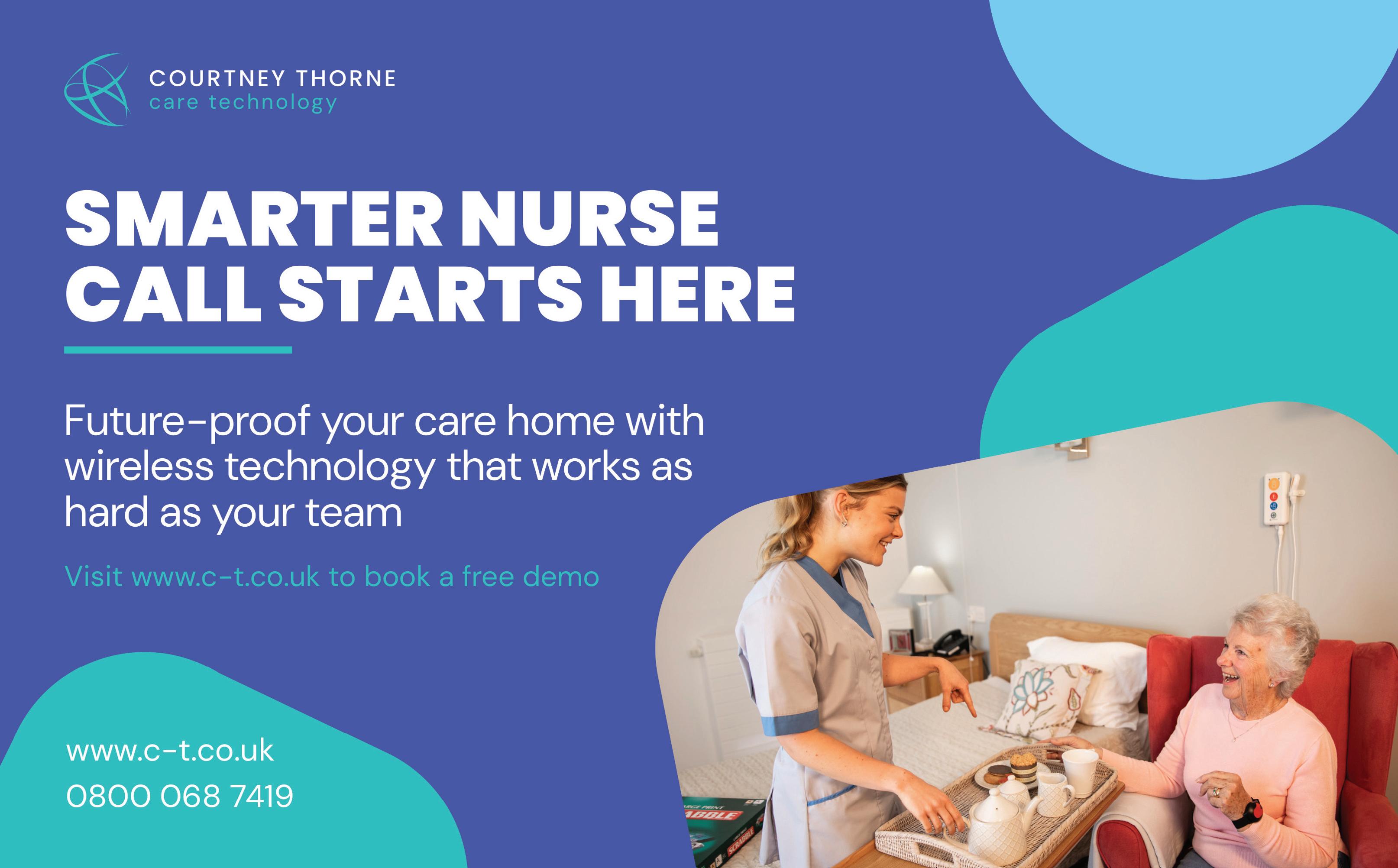
Adult social care is changing fast. Across England, providers are swapping paper and patched-together systems for complete digital records, in step with the government’s Digitising Social Care programme.
Primera Healthcare, which supports people at home in Birmingham and London, has moved early and decisively.
The team started 2025 by upgrading their older care system to Allin-one PASS, adding digital care planning, rostering and finance tools so that every part of the service now sits under a single platform.
The switch felt less like a software update and more like turning on the lights. Travel times, staff skills and visit continuity now feed automatically into the rota, so late or missed calls are spotted and fixed before they become problems.

Medication notes flow straight into electronic MAR charts, and live GPS data shows managers exactly where carers are, cutting the need for frantic phone calls on busy shifts.
Most striking of all is GP Connect. With one tap, authorised staff can see up-to-date diagnoses and prescriptions, saving time and keeping visits focused on the person rather than the paperwork.
“The transition was seamless,” says Shaelene Dewar, Quality Assurance Auditor. “The journal view gives us a live window on the whole business, and the Data Creation Team at PASS built our new forms in record time. GP Connect is brilliant. Reliable information in seconds, and the new charts help us spot patterns we never saw before.”
3. ENHANCED MONITORING
many care settings, the impact it can have is huge.
Here’s a closer look at why AI is set to make waves in social care:
1. BOOSTING EFFICIENCY
AI can help handle those resource-draining tasks in seconds. Whether it’s crunching a mountain of data, summarising care notes, or suggesting next steps, it frees up your team to do what they do best.
It can also improve communication, such as helping new team members quickly access policies or answer routine questions without waiting for assistance. By handling these background tasks, AI allows organisations to redirect resources to other core priorities.
2. ENSURING PERSON-CENTRED CARE
AI can support your teams when providing persona-centred care by analysing data over time, so they can build tailored plans that align with each individual’s goals, preferences, and abilities. It can even predict future needs, flagging issues before they arise so your team can act proactively.
Care organisations often operate round-the-clock, and AI can offer real-time monitoring to support this. For example, AI can highlight subtle behavioural changes, like someone sleeping poorly or becoming more withdrawn. These insights can alert your teams to potential concerns early, which means better, faster decisions can be made to support your clients.
For organisations, this level of tracking ensures care quality stays high, without adding to the workload. It’s like having an extra layer of support that’s always on duty.
4. EMPOWERING TEAMS
AI is here to help empower your care teams, not replace them. AI tools can provide instant recommendations or resources, which could help your newer employees confidently manage unexpected situations. Similarly, AI can assist with summarising care notes or giving quick access to up-to-date best practices, helping your teams provide the high-quality care they work so hard to deliver.
5. OPTIMISING COSTS
One of the big wins of AI is its ability to do more with less. By automating tasks and making resource allocation more efficient, it
Those changes have delivered quick, concrete gains. Oversight is tighter, risk is lower, and staff spend more minutes each day with the people they support.
Everything is logged, time-stamped and ready for inspection, which reassures families and pleases regulators.
As everyLIFE Technologies marks ten years of PASS, Primera’s experience shows what the next decade can look like when digital tools are placed at the heart of care.
Good care can always get better, and better starts with digital.
Ready to explore your own next step? Visit www.everylifetechnologies.com or call the everyLIFE team to see how PASS can help your service.
can help organisations manage tight budgets without compromising on care.
AI can even help reduce staff turnover by easing workload pressures, which means savings on recruitment and training costs too. Plus, because AI solutions are scalable, it can adapt to your organisation's needs.

AI in social care isn’t about replacing people with tech. It’s about giving your teams the time, insights, and tools they need to focus on the people they care for. That’s why OneAdvanced AI, the first UK hosted fully secure, private AI tool for businesses, was created. OneAdvanced AI can help care providers improve efficiency, deliver person-centred care, and empower teams, all while safeguarding your data. This marks a significant step towards a more innovative and sustainable future in social care.
Find out more at: www.oneadvanced.com/ai
See the advert on the back cover of this issue for further info.




People with dementia can enjoy productive and rewarding working lives in the digital era, contrary to the widespread stereotype that dementia is incompatible with the use of modern technology, according to new research from the University of Bath.
The study - Working lives with dementia: A digital futures perspective – argues that the digital revolution risks exacerbating inequalities amongst those with diverse needs but that organisations can and should develop, adapt and deploy digital technology and the working environment to help those with dementia to continue in employment.
“The bottom line is that we have an ageing population and workforce in which dementia will feature and which should, and can be, accommodated by the judicious use of digital technology and adapting working conditions. The reality is, this is not dealt with in any meaningful way right now – there are very rarely strategies in place,” said Dr James Fletcher of the University of Bath School of Management.
“There is widespread prejudice that those with dementia cannot cope with, or benefit from, digital technology, and they often get bundled into the same category as the oldest people. But it’s worth putting some perspective on this – an experienced 60-year-old employee with early stage dementia will have grown up through the digital, internet and social media revolutions – and with the right support, they will still have much to offer,” Dr Fletcher said.
The study was published as the UK government announced its welfare reform plans, part of which is to encourage more disabled people into work. Dr Fletcher said he hoped the research could be a useful example of the prospects and challenges of fulfilling that goal.
Dr Fletcher noted that quite simple adjustments to the working environment, such as improving workstation lighting, using appropriate fonts and colour schemes, and providing workers with calendars, voice activated controls, and automatic reminders could make a big difference for somebody diagnosed with dementia.
“And AI offers really interesting opportunities – it is superb at solving many of the problems faced by those with dementia, such as finding words, organising text and putting words in the right sequence. Couple that with the potential offered by hybrid working for those with dementia, and you can see the benefits for both employees and companies,” he said.
Dr Fletcher and his co-researcher Dr Olivia Brown argue that dementia is not inherently disabling and that its impact depends heavily on the environment and surroundings in which an employee is operating. Employers might consider, for example, that an employee with dementia may be able to access a building with a swipe card but may be foiled if access relies on codes that they have to remember.
“We need to approach this in the way we already respond to people with diverse needs, which is already familiar to most employees. Also, there is a misplaced tendency to see a dementia diagnosis in black and white terms when the reality is, the effects can vary day-to-day and hour-to-hour depending on environment and relationships,” Dr Brown said.
Dr Fletcher said that employees could suffer tremendous stress from a dementia diagnosis and disclosing this to their employer, with some developing strategies to conceal their condition. He said that, while we lack good statistics, it appears that the ‘vast majority’ of those diagnosed with dementia go into unemployment, often unwillingly.
“There are many who could stay in the workforce and don’t. And this is not just an issue for older people –growing numbers of younger people are being diagnosed,” he said.
The researchers noted that dementia is often considered to be a post-retirement phenomenon, but estimates suggest that 9% of the 35.6 million people worldwide with dementia are under 65 years of age, with around 370,000 new cases of young onset dementia annually.
Technology is a key part of the CQC’s improvement agenda; especially when it comes to how care services record performance during inspections.
THE PROBLEM
Many care providers want to move away from pen and paper-based audits and spreadsheets, but most software lacks the capability and flexibility to handle the complexity of the CQC requirements and ratings structure – leading to gaps in oversight and accountability.
THE SOLUTION
Drawing on our experience providing CQC improvement support, we developed an easy-to-use care audit platform designed to help care providers stay on top of their compliance obligations with the user in mind and the CQC framework at its core.
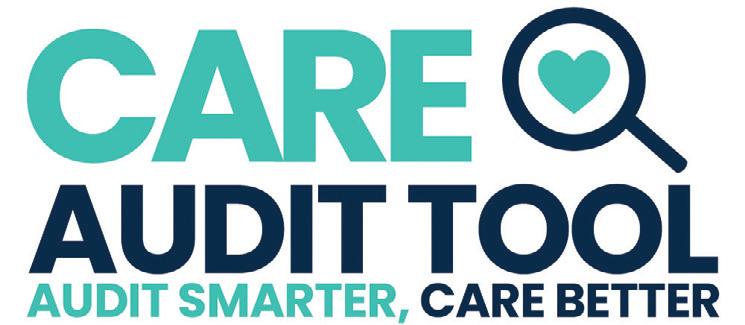
Our Enterprise Care Audit Tool enables care providers to improve oversight and respond to CQC requirements with confidence — delivering greater visibility, accountability, and control.
Now, we’ve made that same expertise and capability more accessible.
Our new cloud-based version is built on the same trusted foundation, giving providers of all sizes a faster, more flexible way to manage compliance with ease.
KEY FEATURES
• CQC-Aligned Dashboard - View audit outcomes and actions against CQC rating thresholds, with drill-down visibility for full organisational oversight.
• 100+ Ready-to-Use Audits - Covering all core operational areas including Care, Health & Safety, Estates, Catering, HR, and more.
• 2,000+ Question Library - Choose from a comprehensive library of questions, each aligned to statutory regulations and the CQC inspection framework.
• Automated Action Management - Audit outcomes that require follow-up are automatically fed into the dashboard and actions portal for clear accountability and tracking.
Reporting - Access a suite of structured reports to support internal reviews and inspection readiness.
• Engagement Surveys - Collect feedback from staff, service users, and relatives
STRESS LESS. TRACK MORE. BE READY.
If you’re spending hours chasing paperwork or stressed about being prepared for any inspection any day
- Care Audit Tool can help.
Website: careaudittool.co.uk
Email: info@careaudittool.co.uk
Phone: 0333 577 0807
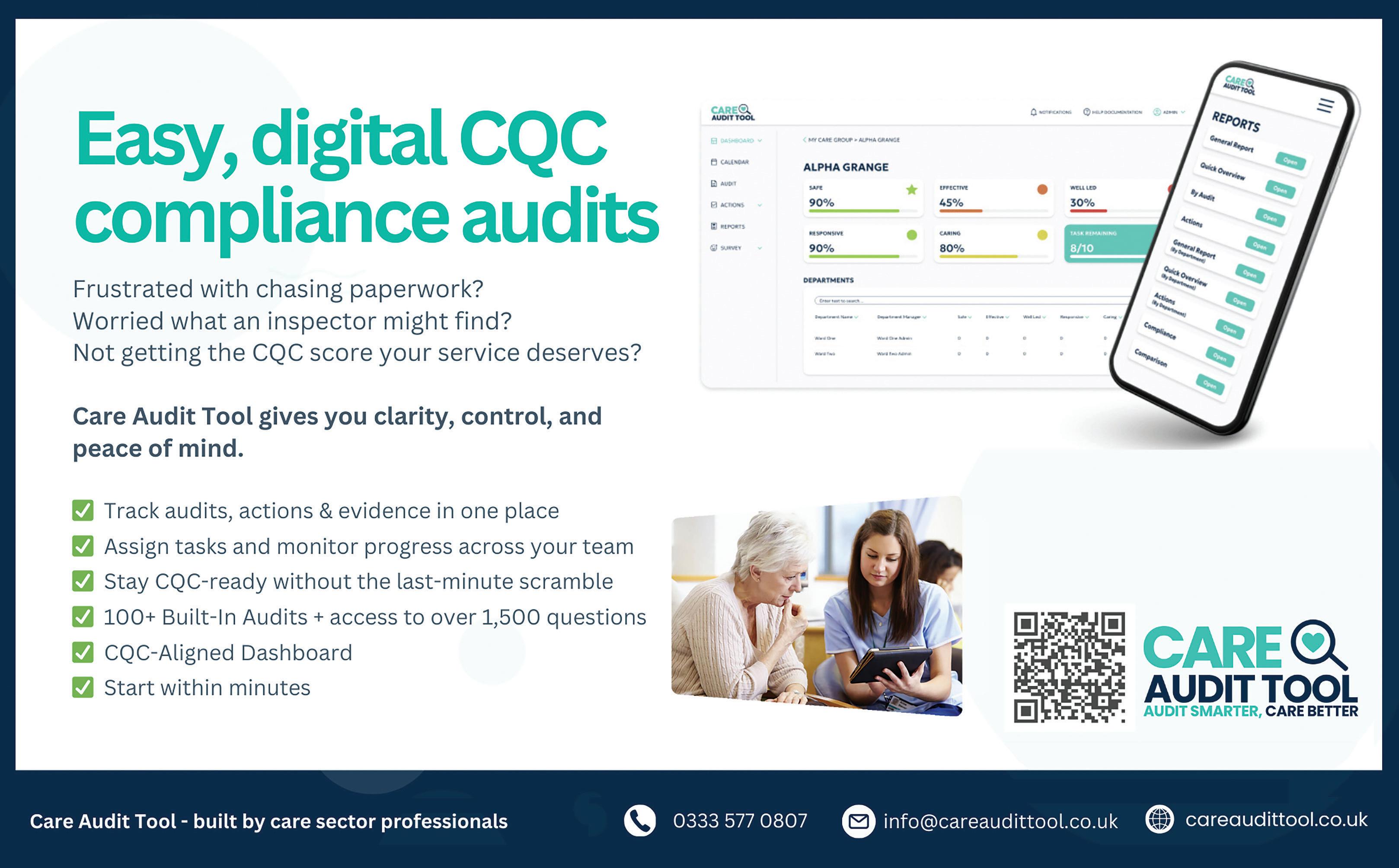
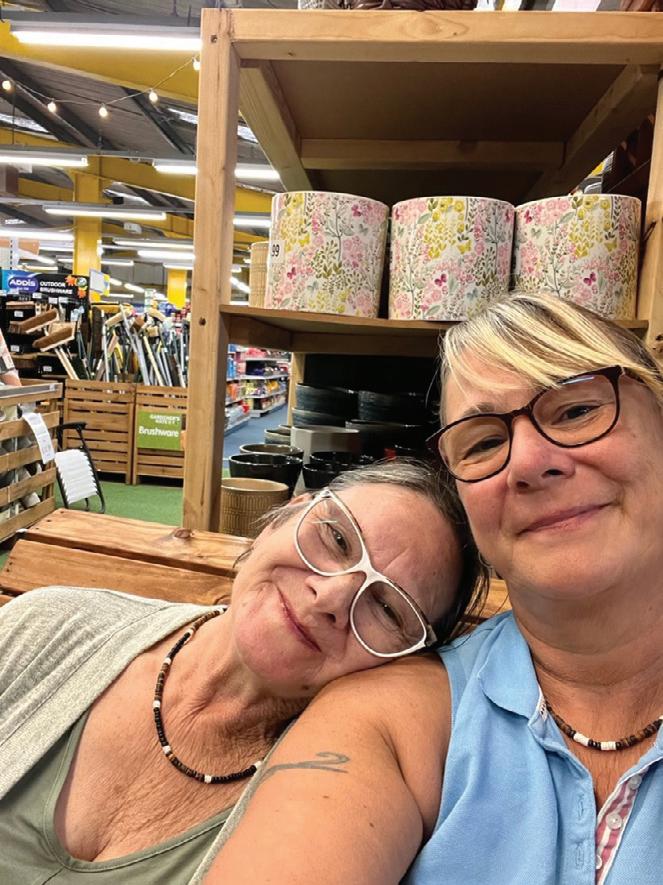
When Sharon’s mum Monica lost her partner and began struggling with her health, Sharon found herself trying to care from a distance—juggling a demanding job in Exeter with near-daily phone calls and constant worry about her mum, who lives alone with her two dogs in Barnstaple, Devon.
“Mum was always independent, but after losing her partner and being told she needed a hip replacement, she became withdrawn and physically frail. I was constantly worried,” said Sharon.
“I’d ring every morning to check she was up, had taken her pills, had something to eat. It was overwhelming.
“She didn’t want a carer. She insisted she didn’t ‘need care.’ But with living over an hour and a half away, I knew I needed to find some kind of support for both of us.”
Sharon learned about new technology being offered by her employer Bluebird Care N.E.W. Devon in partnership with Access Health, Support and Care (HSC), using discreet technology enabled care (TEC) to provide reassurance without intrusion.
The system, Access Assure, uses non-intrusive smart home devices – no cameras, no recordings – just sensors placed around the home to understand daily routines. Movements like opening a cupboard, boiling the kettle, and general mobility patterns are monitored, with alerts sent to family members if anything out of the ordinary occurs or daily living activity patterns change.
For Sharon, the reassurance was instant and the relief had an immediate positive impact on her own wellbeing.
Article supplied by The Access Group
“Suddenly, I wasn’t waking up worried. I knew Mum was up and moving, when the kettle went on, when she’d opened the medicine cupboard. And I knew I’d be alerted if anything changed for Mum.
“It completely changed our dynamic. I could go back to being her daughter again, not just her carer.”
A Bluebird Care N.E.W Devon professional now visits once a week to check the equipment and provide some company.
What started as a technical check-in is now something Sharon’s mum actively enjoys, helping ease the path toward accepting future care, should she need it.
“I didn’t expect technology to bring us closer,” Sharon reflected. “But it has. When I visit now, we go out, we laugh, we just enjoy each other’s company again.”
The smart system behind Sharon’s peace of mind uses AI to learn her mum’s typical routines and flag any irregularities, like missed medication or disrupted sleep, while preserving her Mum’s privacy.
It’s a lifeline that’s helping more families keep loved ones safe at home, without compromising their dignity or sense of autonomy.
“This has been a game changer for us,” Sharon said. “I’d recommend it to anyone.”
William Flint, Director for Bluebird Care N.E.W Devon said: “Using TEC has changed the way we think about care at home. It’s not just about early intervention or risk reduction, it’s about giving families space to reconnect, to be daughters and sons again for example, not just carers.
“It’s a powerful reminder that the right technology, used in the right way, can be deeply human.”
Andy Sparkes, Managing Director for Access TEC, added: “Access Assure is about more than sensors, smart technology, or even an intelligent dashboard that transforms data into meaningful action.
At its core, it’s about reassurance and restoring peace of mind. Families like Sharon’s shouldn’t have to choose between their loved ones living independently and their safety.
“This technology works quietly in the background, empowering individuals to live fulfilling and meaningful lives in the place they choose, while making sure someone’s always on hand if they need that extra layer of support.”
Following stories like Sharon’s, Bluebird Care N.E.W Devon is now preparing to roll out Access Assure across more of its services, bringing the benefits of technology enabled care to families across the region.
PASS by everyLIFE has announced the launch of PASSgenius™, a powerful new suite of data, AI and automation tools built into its award-winning care management software – marking a major step forward in digital innovation for social care.
Designed to turn complex data into clear, actionable insight, PASSgenius™ helps care providers make faster decisions, plan smarter rotas, reduce admin and stay ahead of risk – using the information they already collect.
Commenting on the launch, Robin Batchelor, CEO of PASS by everyLIFE, said: “Care providers are under more pressure than ever. With PASSgenius™, we’re giving them the tools to unlock the power of the data they already hold, helping them make better decisions, deliver safer care and free up time for what really matters.”

One of the standout features of PASSgenius™ is its AI-powered care note summaries – a tool that can scan weeks of care logs in seconds and highlights key changes in behaviour, health or mobility, helping
teams identify risks earlier and provide more responsive, person-centred support. Instead of reviewing long records manually, users receive concise summaries and recommendations that surface what’s changed and what needs attention, improving both care quality and continuity across shifts. At the heart of the new suite is the PASSgenius™ Dashboard – a fully interactive, customisable dashboard that provides real-time oversight across key performance areas, such as:
• Required hours: Spot gaps in care hours early and plan ahead
• Pending hours: See unassigned visits and fill them faster
• Travel time: Flag long journeys and improve routing
• Punctuality: Track lateness trends and take action sooner
• Cancelled hours: See costly cancellations and reduce repeat offenders
• Missed and overdue visits: Catch missed visits fast and protect care quality
PASSgenius™ is available now at no extra cost to All-in-one PASS users.
To learn more or see PASSgenius™ in action, visit: www.everylifetechnologies.com/passgenius
Under-25s (Generation Z) have much to offer the world of care, especially as it progresses. In a constantly adapting industry, young people are key to helping care companies grow with the times, especially surrounding technology.
However, young people make up only 11% of care workers. Why is this? What is keeping Gen-Z from joining and staying in the world of care?
With the average care worker aged 45 and over a quarter of the workforce potentially choosing retirement in the next 10 years, there aren’t enough young workers to pick up the many mantles left behind. With social care already having the highest number of vacancies in the UK, care providers cannot afford for this number to grow and for their workforces to decrease.
Supporting service users is no 9-5 or Monday to Friday job. This alone can be off-putting to the under-25s, who may juggle education and prioritise a larger social life.
This is what Gen-Z values. They have entered the career world understanding the importance of mental health and their worth in the workplace - and they are often viewed negatively for this. But they couldn’t be more correct.
Just as care services get a bad rep for offering a poor work-life balance, Gen-Z gets a bad rep for prioritising a healthy one. You can see the dilemma. So, how can this be fixed?
Irregular, unsociable hours, poor workload management, and low resources can easily lead to poor staff retention. From the most recent

findings in 2021-2022, care saw a high turnover rate of 53% for those under 20 years old while care workers over 60 had a rate of 24%. It’s common for shift-based workers to feel they have very little control over their working lives, leading them to accommodate the shifts they have no say over. Especially due to last-minute scheduling and changes, many shift workers often must change or completely scrap personal plans - or wait until after shifts are allocated - resulting in lives only revolving around work.
As much as someone can be a work-first individual, removing time
By Becky Mundie, RotaCloud (www.rotacloud.com)
for personal and social lives - and simply downtime - can be damaging in the long run, causing stress and mental health issues. Factor in graveyard shifts or being on-call, and the feeling is greatly exacerbated.
Is there any wonder, when combining this with the high workload and responsibility that comes with care, that the under-25s - the generation valuing mental health - make up so few care workers?
There are simple ways to remedy this, however.
Simply offering flexibility, allowing staff to have a say in the days and hours they work, and offering the ability to oversee shifts further in advance, can make all the difference.
Implementing digital automation allows staff to feel more in control of their work and lives. This alone can greatly improve employee experience.
Surprisingly, employee experience can go hand-in-hand with updated technology - and what goes hand-in-hand with technology? The generation that has grown up with it.
Not only does digital automation benefit your service users, employees, and overall business growth, but it will also make your workplace more attractive to the new generation - who, once joining, can make adopting these new technologies and processes all the smoother. Under-25s are the future, as well as new technologies. It’s time to start investing in both.
For further information on RotaCloud, please see facing page.

By Elena Martin, Director of Operations and Commissioning, Langdale Care
Homes Group (www.langdalecarehomes.co.uk)
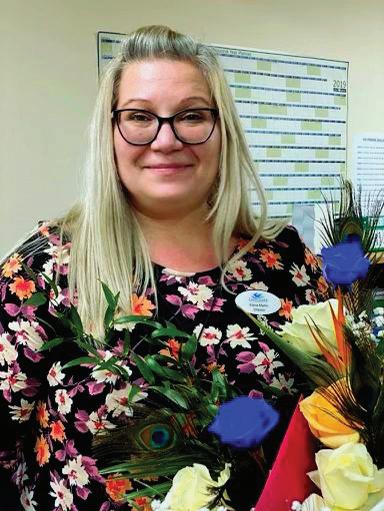
In the ever-evolving landscape of adult social care, it is essential to ensure that training initiatives not only equip care professionals with the necessary knowledge and skills but also nurture an environment where they feel confident and supported to deliver their best.
As a Registered General Nurse with over two decades of experience in the care industry, I have seen first-hand how thoughtfully designed training programmes can bring about meaningful changes that resonate with both staff and residents. These programmes, when aligned with the real-world needs of care professionals, have the power to transform not only the quality of care but also the overall morale and satisfaction within the care setting.
One of the key features of impactful training is its accessibility, relevance, and applicability to the challenges faced by care staff on a daily basis. From comprehensive first aid instruction to specialised courses on dementia care, well-designed training modules can provide care professionals with the tools and techniques required to respond effectively to a variety of situations. By prioritising the development of our staff's clinical proficiency, we enable them to deliver high-quality, person-centred care that focuses on the well-being and dignity of residents.
However, building confidence and capability goes beyond technical skills alone. It is equally vital to focus on the interpersonal skills that underpin meaningful relationships with residents and contribute to their overall happiness and fulfilment. Training programmes that emphasise relational care, for instance, can help care staff appreciate the importance of creating an atmosphere of trust and understanding. By encouraging
staff to focus on these human aspects of care, we cultivate a setting that radiates warmth and kindness, ensuring that residents feel valued and respected.
Moreover, to ensure that staff can consistently provide the best possible care, our training must remain adaptable and responsive to emerging trends and best practices in the sector. By implementing regular refresher courses, we reinforce foundational knowledge, address any skill gaps, and ensure that care professionals are up to date with the latest advancements. Similarly, ongoing supervision and performance evaluations play a vital role in identifying opportunities for professional growth, creating a framework of accountability and continuous development. This commitment to lifelong learning not only enhances the quality of care but also reinforces a sense of purpose and pride among staff.
The ripple effect of robust training programmes extends far beyond individual care professionals. When staff feel confident, valued, and well-equipped, they are better positioned to deliver exceptional care that is tailored to the unique needs and preferences of each resident. This, in turn, results in improved well-being for residents, greater peace of mind for their families, and stronger outcomes for the care community as a whole.
At the core of our training philosophy lies the understanding that empowered staff lead to empowered residents. When care professionals are equipped with the knowledge, skills, and assurance to excel in their roles, they are better able to encourage residents to maintain their independence, involve them in decisionmaking, and take the time to truly listen to their stories and concerns.
In conclusion, aligning training with the practical needs of both staff and residents goes far beyond fulfilling regulatory requirements—it is the foundation for fostering confidence, compassion, and excellence in adult social care. As we look ahead to the challenges and opportunities of the future, let us remain steadfast in our commitment to investing in our staff, enabling them to make a lasting difference in the lives of those they care for.
In today’s care home environment, staff training is under constant pressure. Limited time, tight budgets, and high workloads mean traditional training methods often struggle to keep up. Yet, with complex conditions like diabetes affecting up to one in four residents, there’s never been a greater need for effective, accessible learning.
Game-based learning (GBL) offers a powerful way forward. Whether through board games, card games, or digital tools, GBL turns essential training topics into engaging, memorable learning experiences that fit seamlessly into busy care home routines. It’s proven to boost knowledge retention, spark discussion, and improve practical understanding.

Focus Games (www.focusgames.com) leads the way in this space, with a wide range of evidence-based games developed for health and social care. Their innovative Virtual Care Home is a standout example—a digital environment where staff can explore realistic care scenarios, click on hotspots, and practise deci-
Do you want to provide Gold Standard end of life care in your Care Home?
Sign up to our Training & Accreditation Programme today and receive 50% Off! (Limited-Time Offer)

Offer Includes:
8 live interactive webinars over 6 months, led by a clinical team
Ongoing support and access to the GSF Member’s Area
GSF Accreditation, enhancing your CQC rating and setting your care home apart
Next Steps:
Autumn training begins 10 September – secure your place today by scanning the QR code below. th Use discount code: GSFCarer25 to get the full programme for £1,095 + VAT
Everyone deserves Gold Standard end of life care.


sion-making in a safe, simulated setting. From managing blood glucose to identifying signs of hypoglycaemia, staff gain confidence in handling real-world challenges. All on their pc or smart pnone!
Best of all, these ready-to-use resources are designed to be flexible. Maximising every learning opportunity. With options tailored to your setting, including customisable content and multi-modal learning styles, there's a solution for every home. In a sector facing increasing demands, GBL offers a costeffective, forward-thinking way to build skills and confidence. Whether you're new to game-based learning or ready to take it further, now’s the time to explore the difference it can make. To discuss our virtual care home resource contact info@focusgames.com.
See our cover advert for a special discount code to get started today. Visit www.focusgames.com

As our population ages, the need for compassionate, high-quality end of life care is more pressing than ever. The Gold Standards Framework (GSF)
Charity is helping to meet this challenge by supporting health and social care teams to deliver care that truly makes a difference.
Through its nationally recognised Service Improvement Programme, GSF equips staff with the skills, confidence, and structure to provide proactive, person-centred end of life care. The results speak for themselves: 97% of organisations report better experiences for residents and families.
GSF Accreditation is more than recognition - it’s a mark of quality that is CQC-recognised, sectorendorsed, and impactful across entire organisations.
Whether you're in a care home, GP practice, hospital, or community service, GSF helps embed a culture of dignity, compassion, and coordinated care. Hundreds of organisations have already joined the GSF community, raising the standard of care for those nearing the end of life.
Find out how your team can get involved at: www.goldstandardsframework.org.uk
Future-proof your care. Empower your workforce. Everyone deserves Gold Standard end of life care.


Cyber security is an increasing concern in social care, with data breaches, phishing scams, and cyber attacks putting sensitive information and essential services at risk. However, learning about cyber security can often feel overwhelming, full of jargon, and difficult to apply to everyday situations. That’s where the Digital Care Hub’s new Cyber Game comes in—an engaging, interactive way for adult social care providers to learn vital cyber security skills.
Learning doesn’t have to be dull. In social care, where training is essential but time is scarce, gamification—using game-like elements such as quizzes, rewards, and interactive challenges—makes learning more engaging and memorable. It provides a safe space to learn and make mistakes, increasing engagement, motivation, and knowledge retention. Gamification also allows for instant feedback and supports long-term behaviour change, making it an effective tool for cyber security training.
The Digital Care Hub has launched the first-ever Cyber Game designed specifically for adult social care providers. It offers a fun and practical way to learn about cyber security and data protection, helping care managers, care workers, and other staff members develop the skills they need to keep their organisation safe.
The Cyber Game takes players through real-world scenarios relevant
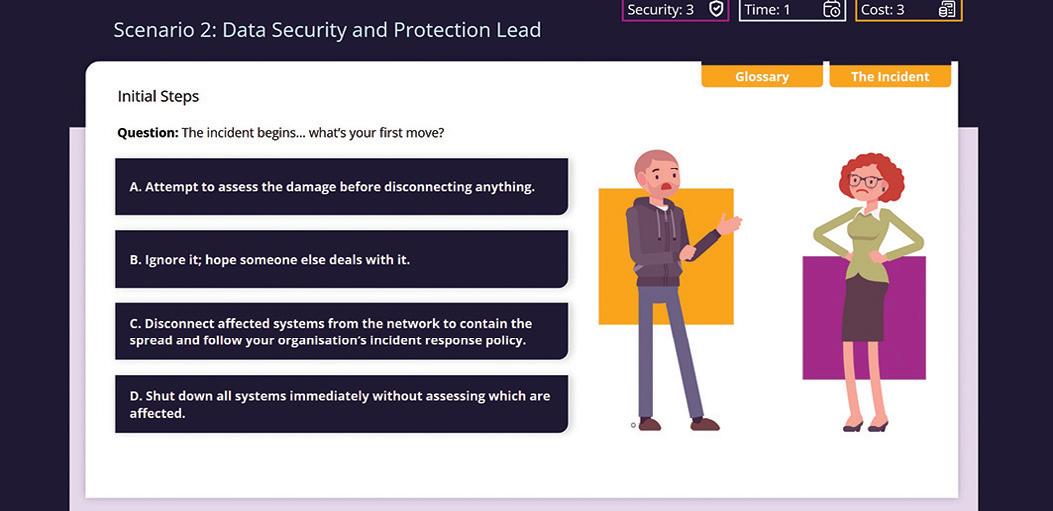
to social care settings, making it easier to recognise and respond to cyber risks in a safe environment. Whether it’s identifying a phishing email, ensuring secure data sharing, or responding to a cyber incident, players gain hands-on experience that translates directly to their work environment.
One of the biggest challenges in cyber security training is making it relatable. The Cyber Game brings cyber risks to life through realistic characters and workplace situations. Players can take on the role of a registered manager, a data protection lead, or a care worker, each facing different cyber threats.
Each scenario is based on real cyber incidents that have affected
social care providers. The goal is to manage the crisis effectively—containing the damage, notifying the right people, and implementing steps to prevent future incidents. Decisions impact security, time, and cost, requiring players to balance risk and consequences.
WHY GAMIFY CYBER SECURITY TRAINING?
Daniel O’Shaughnessy, from the Digital Care Hub, explains:
“We created the Cyber Game to make cyber security training more accessible and engaging. Gamification encourages active participation and helps staff retain information better, making learning feel rewarding and practical.”
WHAT CARE STAFF SAY
Care staff who tested the game found the scenarios helpful and realistic:
“These are good scenarios – typical and indicative of what may occur and give people an idea of what they need to be thinking about.”
Through interactive decision-making, players experience the consequences of their choices, reinforcing key lessons in a way that traditional training cannot.
TRY THE CYBER GAME TODAY!
The Cyber Game is available online, completely free to play. It’s a great way for care providers to improve their cyber security awareness in an engaging and practical way.
Play the game online at: www.digitalcarehub.co.uk/cyber-game
The delivery of safe care is the paramount responsibility of social care providers. Central to achieving this is the governance framework adopted by service providers. And at the core of this framework are policies and procedures. These enable the provider to comply – and evidence compliance – with relevant legislation and regulations, as well as facilitating best practices, supporting business needs, and assisting in recognising and managing risks.
Providers have a legal duty of care to the people they employ. Policies and procedures should provide clear guidelines to staff on how the organisation operates, as well as informing them of best practices and processes to be followed.
Policies should be reviewed annually as a minimum to ensure they are still fit for purpose and align with legal and regulatory requirements. They should be reviewed not only by employees of the business, but also by experts in various subject matters (e.g., infection control or medicines management).
For many small- to medium-sized providers, there may not be the in-house skills, knowledge, and experience to complete such a robust annual review. Many choose instead to purchase their policies and
procedures from a reputable provider like W&P Compliance & Training, who will also complete reviews and ensure their policies and procedures remain up to date. This way a provider not only ensures they remain compliant; they also benefit from best practice policies and procedures that provide a solid foundation for safe working practices and – ultimately – protect and support service users and staff.
Ben Erskine – Director at W&P Compliance & Training www.wandptraining.co.uk | Tel: 01305 767104 See the

on page

By Satya Cashman, Partnerships Manager for national charity Dementia Carers Count
Here at Dementia Carers Count we’re supporting professional carers, looking after increasing numbers of people with dementia. Day in, day out, we provide emotional advice and practical support to family carers, as they cope with the challenges of dementia care. Those challenges don’t stop when a loved one moves to a care home. They change. And what many families tell us is, they would like better support from the professional carers they meet.
In fact, of the 1,300 family dementia carers who responded to our 2023 survey, only one third agreed that paid carers understood their needs. This is worrying, given the best possible person-centred care is only possible through working in partnership with families
With estimates of the number of professional carers receiving dementia training as low as 29%1, it could be that some carers just don’t have the training or practical experience to support families well. But most care homes invest in regular dementia training, and a host of other professional requirements. Despite this, many families are not confident about paid carers’ understanding of dementia. Only around a quarter (27%) of our 2024 survey respondents said that paid carers had a ‘good understanding of dementia and dementia care2
So, what could you do differently to ensure your busy, committed and hard-working team have everything they need to support residents and families with the care and compassion you’d want?
Well, whilst you’re busy arranging shift patterns, cover, inspections,
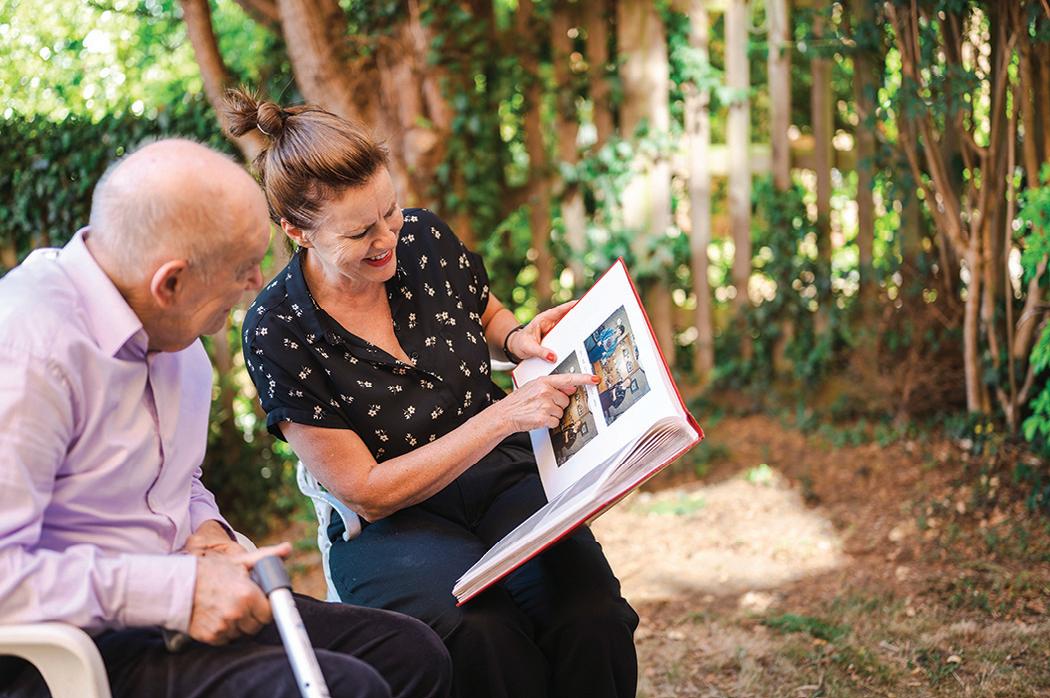
visits and the rest, it’s easy to overlook problems with the current basic training model:
1. Dementia has so many presentations, and no one prognosis, affecting every person differently. To provide high-quality, person-centred care for people with dementia, you need a wide range of knowledge from a broad practice base.
2. Staff churn is challenging for any care business. But all too often, staff
move on because they don't feel confident or supported by low-quality training, when they do face those challenging situations.
3. It’s tough getting carers together for a whole or half day of training. Arranging shift patterns and cover, transport from other sites, or managing sickness and emergencies.
At Dementia Carers Count, we understand the pressures you face and the genuine commitment you have to your residents. As a dedicated charity, our mission is to improve support for anyone caring for someone with dementia. That’s why we’ve developed short, regular interventions, delivered live by trainers with experience and insight, to help your staff understand all the dimensions of expert dementia care for your clients and their families.
Our 90-minute format minimises disruption to your schedules, while maximising learning outcomes. These focused sessions share genuinely useful knowledge in an accessible and engaging way. And as all our CPD accredited training comes from years of experience supporting carers, you can feel confident you’re your staff will learn from the very best. What’s more, proceeds from our training go to our work for family carers across the UK. When you work with us, you're supporting your team and your local community.
To speak to Satya and find out more about training – visit www.dementiacarers.org.uk/what-we-do/dementia-training
A host of health and social care courses delivered by leading training provider Realise have received the new Quality Assurance Care Learning Services (QACLS) endorsement.
The Department of Health and Social Care (DHSC) has taken on responsibility for reviewing the quality of individual courses and qualifications delivered by training providers within the sector.
Realise submitted 11 of its health and social care
programmes to be quality assured – and all received the stamp of approval, including the Level 2 Adult Social Care Certificate.
Funding for health and social care qualifications is now provided through the Government’s Learning and Development Support Scheme (LDSS), which has replaced the Workforce Development Fund.
From April this year, only courses and qualifications delivered by training providers that have been
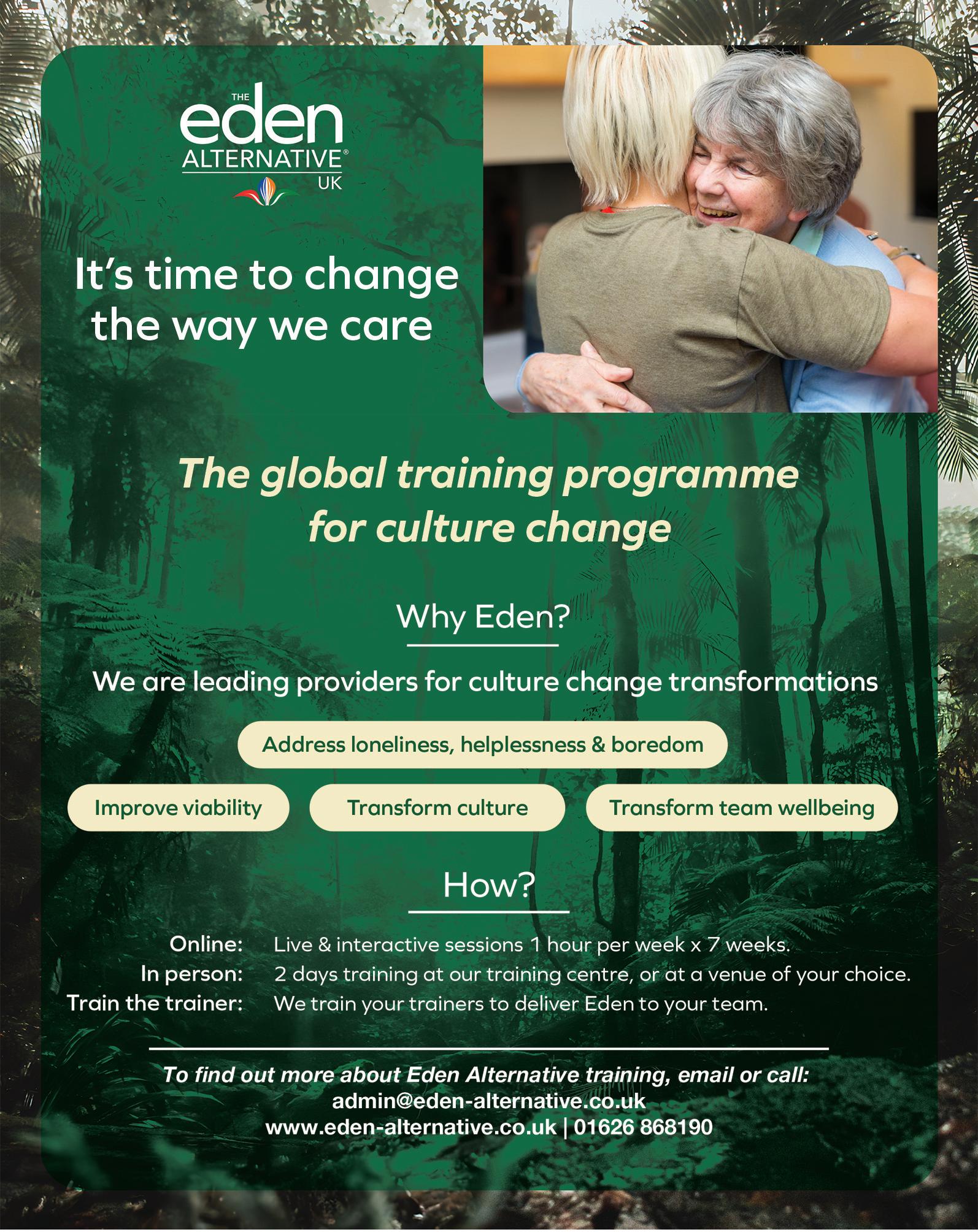
QACLS endorsed will be identified as preferred options by LDSS.
And from next year onwards, employers will only be able to claim LDSS funding for courses that have been quality assured.
Care providers currently have to replace almost a third of their workers each year due to staff leaving their jobs. This high turnover has a negative impact on the quality of care - and the DHSC hopes the QACLS endorsement will help boost retention.

Lesley O’Connor, Head of Strategic Development at Realise, said: “We are absolutely delighted to be one of the first training providers to achieve endorsements across a wide range of courses.
“This new system marks a step-change for the industry as it means, for the first time, individual courses are being reviewed rather than the training provider as a whole in an attempt to drive up standards.
“The approval process was thorough, looking at evidence of quality of delivery, testimonials, achievement rates and policies.
“Being QACLS endorsed is very important as it demonstrates quality and also allows employers to continue to claim LDSS funding. Soon employers will have to pay the full price for programmes that are not endorsed.
“We look forward to working with employers who
"23 years, operating 4 Devon Nursing homes, has been pretty tough, as anyone in social care, knows, only too well. And if it was hard already, after 2024 budget, it's just got harder.
Anyway, at heart, I am just customer of Eden Alternative, and it was a stroke of luck to come across this whilst on holiday in New Zealand in 2009. It started in USA in 1994 and now runs in 22 countries.
The fact that I am now involved with this not-forprofit organisation (in the UK area) came about when one of the 2 main UK directors died suddenly just before Covid. But it's something I have run with for 11 years to help make 'vision' a reality, not a struggle. So, being both a customer and helping the admin seems quite natural.
It is a modern philosophy of care, but moreover, it's
can benefit from quality assured training.”
The QACLS endorsement lasts for three years, with regular monitoring every six to nine months.
Realise will strive to have all its health and social care programmes approved through QACLS during phase two and three of the process. Phase two runs from now until the end of the 2025-26 financial year, and phase three follows immediately after.
The Government says it is "fully committed to a professional, well supported social care workforce" with learning, development and training that is "of outstanding quality, relevant and accessible".
The full list of Realise’s 11 quality assured courses are: Level 2 Certificate in Understanding Autism, Level 3 Certificate in Understanding Autism, Level 2 Adult Social Care Certificate, Level 2 Certificate in Understanding the Care and Management of Diabetes, Level 2 Certificate in Falls Prevention Awareness, Level 2 Certificate in Understanding Nutrition and Health, Level 3 Diploma in Adult Care, Level 4 Diploma in Adult Care, Level 5 Diploma in Leadership and Management for Adult Care, Level 2 Certificate in Understanding the Safe Handling of Medication in Health and Social Care and Level 2 Certificate in Awareness of Mental Health Problems For more information, visit www.realisetraining.com
a programme that is straight forward, tried and tested for 30 years and really works. Its member care organisations generally become trainers for their own teams, and run it themselves. The programme is run in person over 2-3 days or online 1 hr a wk for 7 weeks. You choose. It addresses loneliness, helplessness and boredom and operates through 10 principles to underpin 7 critical domains of wellbeing.
Moreover, it's effective, transformational and really works. As residents, and team members wellbeing, matter so much , it's a must, in my opinion. Geoffrey Cox Southernhealthcare.co.uk eden-alternative.co.uk"



From April 2022, the Health and Care Worker visa route gave UK care providers a desperately needed pipeline to international talent. But with the current Labour Government signalling an end to this route, providers are once again staring into the eye of a workforce storm.
It’s a pivotal moment. The social care sector already faces more than 150,000 vacancies. Labour costs are rising sharply, up to 10% in 2025 alone, driven by increases in the National Living Wage and employer National Insurance contributions. Now, with international recruitment under threat, many operators will see their already narrow options for staffing become even tighter.
Ending the care worker visa route is more than a headline, it has real operational consequences. It’s no secret that providers have leaned heavily on overseas hires to fill roles that remain persistently unattractive to the domestic workforce due to pay, flexibility and public perception.
Cutting off this access will likely drive greater dependence on agency staff, which are not only costly, often commanding 30% premiums, but also disrupt continuity of care and team morale.
Even before this immigration shift, providers were bracing for significant
financial pressure. A typical organisation with a £100m income is already facing £5.5m in additional labour-related costs, including £7m from wage increases and £5m from higher employer NI contributions.
And that’s without factoring in the operational impact of the upcoming Employment Rights Bill. Since April, predictable scheduling, compensation for last-minute changes and stricter zero-hours rules have become mandatory. That means more administrative load, less flexibility and higher staffing costs.
In short, the financial squeeze is very real. And the traditional cost-cutting playbook, reducing staff ratios, asking councils for more funds, or freezing employee benefits, is no longer viable, especially when quality of care and compliance are non-negotiable.
A modern response: smarter operations. So what now?
The good news is that providers aren’t powerless. The most resilient organisations are shifting from reactive crisis management to strategic operational transformation. That means investing in systems that make labour smarter, not just cheaper.
In our latest industry report, we break down how providers are already unlocking significant savings and efficiencies through smarter operations.
Modern shift management platforms, for instance, allow providers to surface open shifts to existing team members quickly, reducing the need to fill gaps with costly agency staff. In one example, agency spend dropped by 38% within four weeks of deploying a new digital scheduling solution.
Additionally, better time tracking tools with geo-fenced clock-ins and payroll integrations have helped providers save up to £4.2m annually by avoiding overpayments and automating manual processes.
Intelligent scheduling systems now also use commissioned hours and
By Abbey Milne, Social Care Lead of Sona (www.getsona.com)
real-time staffing data to avoid both understaffing and costly overstaffing. This has led to 2–5% savings in total labour costs, equivalent to up to £3m for some organisations.
With new compliance demands arriving this year, reducing the administrative burden is critical. Tools that consolidate scheduling, HR and payroll into one workflow can free up hundreds of hours per year, allowing managers to focus on team support and care quality.
This isn’t just about efficiency, it’s about survival. According to a recent Hft and Care England report, a third of providers are now considering exiting the market due to cost pressures and long-term uncertainty. But those who embrace operational transformation stand a chance not just to weather this shift, but to emerge stronger.
At Sona, we help social care providers meet today’s challenges head on, with solutions that drive efficiency, empower teams and elevate care. Advinia, a residential care provider with over 4,000 employees, was spending between £35,000 and £40,000 a week on agency cover. After transforming their internal scheduling strategy, they brought that figure down to £16,000 a week, a change that’s not just financial but operationally transformational.
As leaders, we need to view this moment not just as a policy change but as a call to action. The gap between those who invest in smart systems and those who don’t is widening, and fast. Providers that digitise their operations, empower their teams, and deliver consistently high-quality care will be the ones who thrive in this new era.
While we can’t control the economic landscape, we can control how we adapt. The providers who do so with agility and foresight will help shape the future of social care, not just survive in it.

We are a leading supplier of comprehensive healthcare staffing solutions to care, residential and nursing homes, hospitals, medical facilities and establishments that need person-centred personnel.
By providing staffing solutions that are both cost-effective and highquality, Nexime Healthcare helps with everything that is required. Our extensive database of experienced Support Workers, Carers, Healthcare Assistants and Nurses of various specialities is available to provide highquality care on demand to our clients for:
• One-off shifts, staff absence and shortfalls (often at very short notice),
• Establishing a new unit, whilst permanent staff are recruited,
• Emergency cover during very busy periods,
• Temporary or permanent positions,
• Regular support to full-time teams,
• Contract or SLA (Service Level Agreement) arrangements.
We’re a one-stop, temporary employment business operating nationwide and providing dependable and experienced Nurses, Healthcare Assistants, Carers, Support Workers, domestic and other types of staff.
We are proud of our values, manners, good timing and a friendly ‘can do’ attitude. We’re professional and our clients know that there’s no substitute for our dependability, reliability and our prices.
Owned and managed by people who have years of experience within the healthcare sector, Nexime Healthcare knows what it takes to match the right staff with clients needs. Using our insights into what is required
for each situation, we provide a service with professionals trained for each and every scenario. With access to a broad network of available staff, we can find the right person for the assignment. Nexime Healthcare will make sure you gain access to the reliability, flexibility and experience that you need to support your own clients. We know how critical these are to you.
What we have always done better than anybody else is to provide the highest quality care staff. We apply internal Quality Assurance Systems, that are continually being improved, during our rigorous hiring process. It is essential to us and our clients that our staff are compliant. 0151 673 1899
info@neximehealthcare.co.uk www.neximehealthcare.co.uk
A TEAM of experts have come together to disrupt the expensive and complex social care system by launching an ‘app’ to bring care homes/providers and carers together using AI.
AgoraStaff, a temporary staffing app for the social care sector, is the brainchild of Richard Williams-Pears, a longstanding Cornwall councillor and former mayor of St Austell, who saw firsthand the rising costs and inefficiencies in social care.
He teamed up with his wife Jolene, AgoraStaff’s Director of Outstanding Compliance, who has an extensive background in operating theatres, and Janet Shreeve, who brings hands-on care sector experience from running Shreeve Care Services, based in Wiltshire.
Together, they partnered with tech experts Ben Grave and Simon Wetherell —creators of the UK’s leading asbestos management system - to bring the app to life.
Richard said: “Providing care is expensive and it’s even more expensive if a care home, local authority, or other care provider has to pay an agency to find carers, particularly at the last minute. The carer gets minimum wage, or just above and the agency takes a hefty cut on

average around 30% of the fee from the provider.
“We felt there had to be a better way, using modern technology, to speed up this process leaving more money available for carers and providers. So much money is lost on agencies sitting in the middle between providers and carers, our app is designed to cut through this inefficiency.
“We have therefore combined deep sector knowledge with smart tech.”
Janet Shreeve is the Chief Business Development Officer

for AgoraStaff. She said:
“Many carers throughout the UK are self-employed and rely upon agencies to find them suitable shifts. Our marketplace gives them the opportunity to not only register for free but have complete control over the shifts they apply for and undertake.
“We are committed to ensuring the carers within our marketplace are the best professionals for individual roles. We achieve this with a vetting process to ensure they are legally entitled to work in the UK (if relevant) and must register their relevant training. They will also have the option to undertake more training to enhance their rolesa concept not commonly found within traditional agencies.”
AgoraStaff goes live week commencing May 19th in Somerset and the surrounding counties.
Care providers can sign up for the app for a monthly fee of £34.99 per location (plus five per cent from the agreed daily shift fee) and trained carers sign up FREE once they have completed the vetting process.

Jennifer
Moore, Director at Leonard Curtis Legal

Succession is one of the most pressing and personal decisions a care business owner will make. For many founders, particularly those who have built a service rooted in compassion, community and quality of care, handing over the reins is far more than a financial transaction. It’s also about legacy.
Increasingly, owners in the care sector are choosing to exit through Employee Ownership Trust (EOT); a structure that avoids the disruption that can often accompany third party sales, while simultaneously safeguarding their values, rewarding their team and securing long-term continuity.
At Leonard Curtis Legal, we’ve supported a growing number of businesses through the transition to employee ownership. In our experience, it’s not just a legal process, it’s a cultural shift that is transforming how businesses plan for the future.
An EOT is a government-backed ownership model that allows a business owner to sell a controlling interest (more than 50%) of their company to a trust set up for the benefit of all employees. If certain conditions are met, the sale is then exempt from Capital Gains Tax
(www.leonardcurtis.co.uk) discusses the growing number of care home businesses choosing Employee Ownership Trusts and explores the benefits for founders within the care industry.
(CGT), which is an obvious benefit for those planning retirement or succession.
While the trust doesn’t run the business, it does own it on behalf of the workforce. Decisions continue to be made by a management team, but under a new structure where the staff are the ultimate beneficiaries. In an industry where staff retention, engagement and continuity of care are vital, EOTs offer a compelling alternative to trade sales or private equity investment.
The values behind employee ownership align closely with the realities of social care. Businesses succeed here because of their people –the carers who turn up day after day to deliver life-changing support. Yet many of these same staff face limited recognition or reward. EOTs done well can help to rebalance that.
Businesses adopting the EOT model often benefit from improved staff retention and morale, a stronger sense of shared purpose and an increased perception of trust and credibility both internally and externally.
EOT-owned companies can also pay staff annual tax-free bonuses of up to £3,600, providing a meaningful benefit in a sector struggling to compete on wages alone.
LEGAL AND PRACTICAL CONSIDERATIONS
It’s important to remember that this is a legal transaction and one that must be carefully structured. To qualify for CGT relief, several conditions must be met. The EOT must acquire more than 50% of shares and voting rights, and the company must be a trading business and not an investment vehicle. It must also benefit all employees on equal terms and the former owners must not retain control.

Once established, the trust is governed by a board of trustees usually including independent members and employee representatives. It’s vital that the governance structure reflects both the legal requirements and operational needs of a care provider.
However, in the care industry it’s not only about meeting technical criteria, we must also think about designing governance models that work for regulated services. That means considering CQC implications, continuity of leadership and long-term financial planning.
FUNDING THE TRANSITION
A common concern is whether a care business can afford to buy itself. In most cases, the purchase is funded through future profits of the company with the outgoing owner receiving deferred payments over time. Some providers also access third-party lending to accelerate the process.
Robust cash flow forecasting is key. Margins in the sector are often tight, so careful modelling is essential to ensure the business remains stable while making repayments. We work alongside accountants and lenders to manage this risk.
A FUTURE-PROOF MODEL FOR VALUES-LED CARE
What sets EOTs apart is the ability to exit and secure a fair financial return while keeping the culture and purpose of the business intact. In a sector increasingly shaped by scale and commercial pressure, that’s a powerful proposition.
For owners who have built care services with love and long hours and who want to leave something meaningful behind, employee ownership is more than a tax-efficient exit. It’s a legacy model.
In the care sector, time is one of the most precious—and limited—resources. Whether it’s a nurse supporting an elderly resident or a finance officer reconciling invoices across multiple funding streams, every hour counts. Yet while much attention is given to frontline care, a quieter crisis is unfolding behind the scenes: payment inefficiencies.
Care providers operate in one of the most complex funding landscapes in the UK. Between over 150 local authorities, 42 Integrated Care Boards, and thousands of self-funders, the process of paying and being paid is often fragmented and manual. That complexity doesn’t just create paperwork—it creates risk.
Late supplier payments can disrupt services. Missed payroll deadlines can cause stress for care workers, many of whom live paycheque to paycheque. In a sector where emotional labour is high and financial stability is rare, a delayed or inaccurate payslip can tip the balance from just coping to burning out. When the back office falters, it impacts the front line.
As Victoria Ramsay, founder of Aequalis Accountancy, put it: “There’s a vicious circle. Late invoices mean poor cash flow, which means providers can’t afford to invest in the very systems that would solve the problem.”
And with care workers under unprecedented strain, payroll isn’t just an admin task—it’s a matter of respect. Timely, accurate payments send a clear message: we value you. Delays or errors, on the other
hand, erode morale and trust at a time when retention is already a challenge.
The good news? Change doesn’t always require sweeping reform. One of the biggest wins can come from automating payroll and payments. Faster Payments, for example, allow providers to process transactions in seconds—not days—giving finance teams the flexibility to act quickly and confidently.
Crucially, automation frees up time. According to industry data, automating care payroll can reduce processing time by up to 90%. That’s hours saved every week—time that can be redirected back into care, strategy, and staff support.
What’s often missing from transformation conversations is this: operational efficiency is human efficiency. Every error avoided, every minute saved, helps build a care system that’s not just compliant, but compassionate.
In a sector stretched thin, improving payments isn’t a “nice to have.” It’s a foundation for dignity, stability, and sustainable care.
To learn more about how care providers are modernising payments, visit Modulr at www.modulrfinance.com/care-payments



Aston Brooke Solicitors provides sponsors with an invaluable insight in the Home Office interview and inspection process and how to remain compliant.
Request a UKVI mock audit to see if you are compliant
Email Visit our website km@astonbrooke.co.uk www.astonbrooke.co.uk


